本ホームページは「JavaScript」が使われております。 「JavaScript」をONにしてご利用ください。
Embassy of Japan in the United States of America

Visa and Travel Information

- If you need a visa, check how and when you can apply for a visa: General Rules & Processing Time
- If you do NOT need a visa, skip to STEP #6 .

Visa Information
Who needs a visa.
- The Visa Waiver Program applies based on your nationality, NOT on your U.S. residence status (including green card).
Back to Top
General Rules for Visa Application
Application procedure & processing time.
- In general, it takes 5 business days to issue a visa. (ex., If you apply on Monday, you can pick up a visa next Monday. Our holidays are not counted as business days.)
- It may take more than one month depending on the visa. We recommend that you apply for a visa approximately 1.5 months before your departure date. We do NOT have expedited services.

Types of Visas & Application Documents
- Please click on the applicable box below to see application documents on each visa.
- If you intend to stay in Japan more than 90 days, please click on the "COE Holders" box.
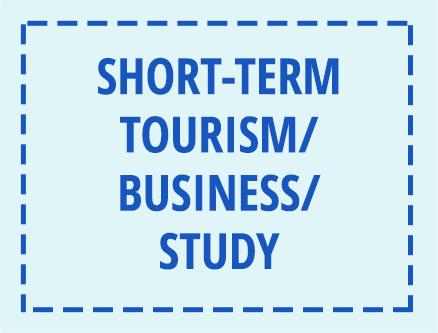
Application drop-off/pick-up & payment Hours
- No appointment required.
- No parking available.
- Please check our holidays before visiting.
- In case of adverse weather conditions, Embassy of Japan follows the guideline of U.S. Federal Government. When the U.S. Office of Personnel Management (OPM) announces federal agencies in the Washington, D.C. area are "closed" or "delayed", Embassy of Japan along with VISA section will be closed/delayed accordingly.
- The Embassy will NOT accept any applications by mail.
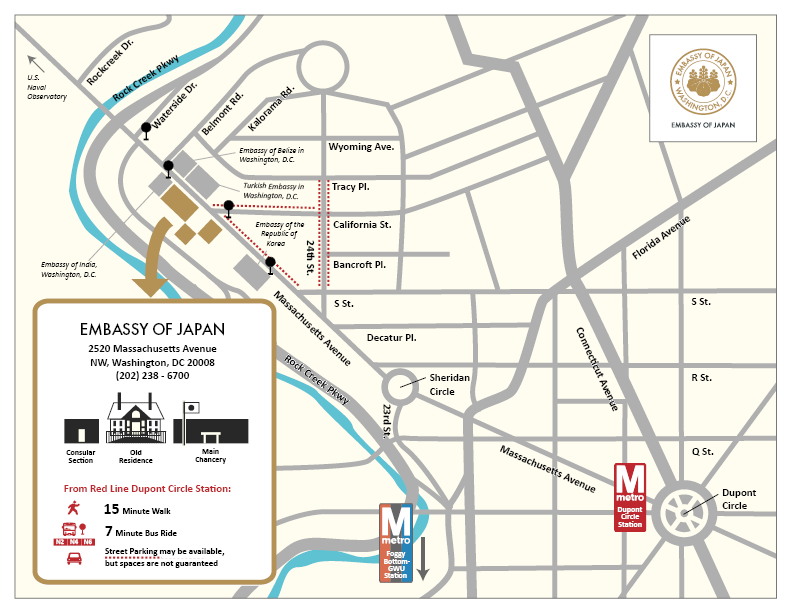
- US citizens are exempt from visa fees. (Some countries and regions are also exempt from visa fees. Please check the Visa Fee Exempt list to find out if your visa fee is waived. )
- We accept CASH only. We DO NOT accept personal checks and credit cards.
Information on Border Measures
Visiting japan.
- After April 29, 2023, pre-registration for quarantine procedures on Visit Japan Web are no longer required, however, you can still use Visit Japan Web to pre-register for "Immigration", "Customs" and "Tax-free Shopping Service" (Optional).
- For information about traveling with minor(s), please read our FAQ .
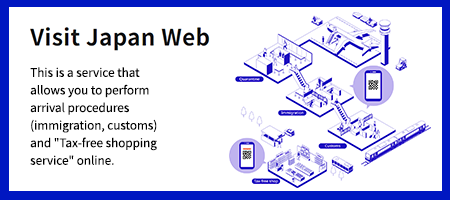
Staying in Japan
- Be aware of traffic rules in Japan
- Nice to Meet You! Let's Be Friends!
- Study in Japan
- Japanese pension law
- Information on Local Call Centers
- It is a CRIME to sell or give a bank account without just cause.
- Roadmap for the Realization of a Society of Harmonious Coexistence with Foreign Nationals
- Comprehensive Measures for Acceptance and Coexistence of Foreign Nationals
- A daily life support portal for foreign nationals
- Guidebook on Living and Working
- New to Japan? Useful pages for foreign nationals

Recommended Information
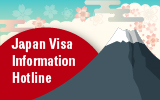
- Consular Section: Embassy of Japan, 2520 Massachusetts Ave. NW, Washington, DC 20008
- Office Hours: Application Drop-off/ M-F 9:15am-12:00pm Visa Pick-up/ M-F 1:30pm-4:00pm
- Contact Us: 202-238-6800/ M-F 9:00am-5:00pm
- Japan Visa Information Hotline (Available in English/Vietnamese/Russian/Ukrainian) 1-202-499-1468 Domestic call fee applies, 24hours, 7days/week
Temporary Visitor Visa
Who can use a temporary visitor visa, temporary visitors for business.
(1) The visa application form (see Documentation #1 below). (2) A valid passport (see Documentation #2 below). (3) A photo (see Documentation #3 below). (4) A certificate of completion of registration for the ERFS.
Additional documents may be requested.
Temporary Visitors Visiting Relatives or Acquaintances (*) *Only those who are deemed to have a relationship equivalent to relatives (betrothed or common-law marriage) or those who are deemed to have a need to visit Japan (to attend a wedding or funeral or to visit an acquaintance who is ill).
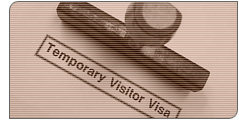
Visa Exemption
U.S. citizens and citizens of other countries which have a reciprocal visa exemption arrangement with Japan may be eligible to visit Japan without a visa for a short-term stay for the activities allowed to Temporary Visitors. For more information about reciprocal visa exemption arrangements, please click here . Important Notice :Border enforcement measures to prevent the spread of novel coronavirus (COVID-19)
Documentation
Please be aware that we will decline applications that have incomplete documents. Each Temporary Visitor Visa applicant must submit the following documents: * Consulate General of Japan will not make copies. If you need original documents, please bring the original plus one copy.
- An application form completed and signed. Blank forms are available at Japanese consular offices. You can also download by clicking on visa application form ( Sample ) in PDF format. Chinese citizens must write their names in Chinese characters, as well as in Roman letters. Korean citizens in principle are asked to write their names in Chinese characters, as well as in Roman letters. Please include your e-mail address and contact phone information. An applicant with an arrest or criminal record must provide a copy of his/her court and/or arrest record (including cases that ended with an acquittal or pardon), along with an English translation of those documents if they are in any language other than English. Even if the case did not go to trial, please provide a letter that explains in detail the circumstances surrounding the arrest. We would like to know about the charges, time served, fees paid, and probation (if any).
- Valid passport ( original plus one photo copy of the face page) with sufficient space for a visa (This means at least one empty, blank visa page. US passports use the rear pages for amendments, and are not acceptable as blank visa pages ). If you already have a valid Japanese visa in your passport, please include a signed consent form as shown in the sample at this link: http://www.ny.us.emb-japan.go.jp/en/d/Consent.pdf . If you submit a PERMIT TO REENTER THE UNITED STATES or a REFUGEE TRAVEL DOCUMENT issued by the U.S. government, it must have a validity date at least six months beyond the date of visa application.
- A passport-sized photograph: 2-inch x 1.4-inch photograph on glossy photo paper taken within the last six months with plain background. Photograph may be attached to the application form with glue (not tape or staples) or you may submit the photograph unattached.
- Green Card or valid I-94 and U.S. resident visa to re-enter the United States (F or J visa holder must show an I-20 or DS-2019 with the valid signature of an appropriate official in order for re-entry). If you will be entering a third country after leaving Japan, you must show a valid visa to enter that country (or a national passport of that country). We ask that all applicants submit their original immigration documents (green card, I-20, etc.) or a NOTARIZED copy of the documents. * Please note: In principle we do not accept an application from B-1 and B-2 U.S. visa status holders.
- A confirmed reservation record of your round-trip flight to/from Japan. An e-ticket or print-out from a travel agency, airline or travel website is acceptable. The print-out should include: -Your name. -Your confirmation number/record locator. -Your airlines, flights and all departure and destination cities. -Your complete round-trip flight itinerary, starting and ending in the US. This should include all of the countries you are visiting other than Japan, if applicable. * Please note: We do not require the purchase of tickets, but we do require a confirmed reservation. We are not responsible for tickets which may be unusable due to the delay or denial of a visa. For those with non-revenue ticket holders: a) Actual Non-Revenue ticket (original plus copy of all pages), plus a printed entire flight information from the airline company b) A copy of the employee ID of the airline employee who obtained the flight coupon, or a letter from the airline proving the employee works for the airline, and that the applicant is authorized to use the non-revenue ticket
- If traveling for BUSINESS, original letter from applicant’s company signed by an authorized executive officer, on company letterhead, stating: a) applicant’s position in the company, duration of employment, and monthly or annual salary b) nature/purpose of visit in detail c) dates/duration of stay intended d) contact person, company name, address and phone number of business contact in Japan e) guarantee of financial support during applicant’s stay in Japan and return transportation from Japan * Additional documents may be requested during the course of examination.
- If going to attend a CONFERENCE, conference brochures plus a paid registration form and invitation will be required. In addition, a letter from the home institution/company giving the circumstances of the trip as in 6.a ) ~ 6.c ) from the visa applicant’s home institution/company, plus the applicant’s financial resources such as listed on 8.a) will be required.
Visa Fees Visa fees are determined according to reciprocal arrangements between Japan and the country of the applicant's nationality. Click here for Visa Fees.
Processing Time Please refer to our introduction page .
Applications by mail Please refer to our introduction page .
Note for Chinese nationals In general, Japanese Embassy/Consulates in China are not accepting Japanese tourist visa applications from Chinese nationals residing in other countries, and if you are planning to sightsee in Japan during your temporary stay in China or on the way back to the US, we recommend applying for a Japanese visa before leaving the US.
Note for Nationals of India Click here for outline of application procedures for Multiple Entry VISA ( English / Japanese )
Note for Nationals of Indonesia, the Philippines, and Vietnam Click here for outline of application procedures for Multiple Entry VISA ( English / Japanese )
- Tours & Experiences
- Tailor-made Trips
- Bahasa Indonesia
We are happy to see you again!
Continue with
Or use email.
No Account? Create one
Create account
Already have an account? Sign in
Quickly Sign up with
I agree to Japan Travel's Terms of Service and Privacy Policy . Terms of--> and acknowledge that Japan Travel's Privacy--> applies to me.-->
Email reset password link
Please check your inbox and click the link we will send to you.
A Guide to Japanese Visas
A general overview of the Japanese visa system

Every foreign national entering Japan must possess a valid visa. Whether that visa is issued on arrival or applied for in advance is based on what type of "residence" the visitor is seeking.
Below is a brief introduction to some of the visa categories for visitors coming to Japan. For specific questions and more detailed information, it is always best to check with your local Japanese embassy/consulate or the immigration bureau in Japan.
Covid-19 is changing the travel landscape fast, including rules on temporary visas due to imposed restrictions. Check with your local Japanese embassy for the latest details, and follow our coronavirus updates .
Temporary Visitor Visa
Most visitors to Japan can enter the country on a temporary visitor visa, or tourist visa, thanks to visa exemption agreements between Japan and many foreign countries.
For residents of over 60 countries (a full list can be found here ), a fee-free 90-day visa is issued upon arrival. This requires no advance paperwork and amounts to being merely a landing permission stamp in the traveler’s passport. Visitors from a few select countries (including Thailand, Brunei and Indonesia) are permitted to enter Japan on a 15-day fee-free visa and 30 days for the United Arab Emirates
Visitors of certain nationalities (Austria, Germany, Ireland, Liechtenstein, Mexico, Switzerland or the United Kingdom) who enter Japan on a 90-day visa can extend their stay in the country by up to six months. Those interested in this option would need to apply for an extension—usually after the halfway mark of an existing visa—at the nearest immigration bureau in Japan.
Student Visa
Those who would like to attend university or language courses in Japan that last longer than 90 days should apply for a student visa.
Most universities and schools will be able to assist potential students with the application process. An application usually needs proof of enrollment at a host institution and evidence that a student can capably support themselves financially during the term of study.
Students who hope to seek part-time employment to supplement their savings while in Japan would have to apply for special permission from the local immigration bureau.
Most student visas are issued for a term of three months to just over 4 years. This can be extended if the student can prove he is still enrolled.
Working Holiday Visa
Citizens of 23 countries/regions (France, Germany, Austria, Slovakia, UK, Ireland, Portugal, Denmark, Norway, Taiwan, Hong Kong, South Korea, Canada, Australia, New Zealand, Poland, Hungary, Spain, Argentina, Chile, Iceland, Czech and Lithuania) can enter Japan on a working holiday visa.
This status allows visitors to pursue part-time work for up to a year in Japan. This visa is not intended for full-time positions, but rather for a series of short-term opportunities.
To apply for this program, visitors must be between the ages of 18 and 30 (both inclusive at the time of visa application) however the condition of age may be different depending on the applicant's issued country. They are required to hold citizenship in one of the aforementioned countries, and submit the following documents for consideration:
- Submit both the required form and a CV (resume)
- Supply proof that you possess sufficient funds to support yourself
- Register at the embassy of your home country upon arrival in Japan
More information can be found at the Ministry of Foreign Affairs Working Holiday official site and the Japan Association for Working Holiday Makers website (which also has a very useful job posting board).
Those who wish to engage in paid, full-time activities in Japan must enter the country with a valid work visa. Work visas are issued based on what area or field you will be working in during your time in Japan (i.e. journalism, business management, the arts, teaching, engineering, entertainment, etc). If you change jobs within Japan to a different field, it is necessary to apply for a different type of work visa.
Work visas are issued mostly to those who have either advanced degrees (university level or higher) or who possess a significant amount of experience in their field. It helps greatly to have a company "sponsor", showing that you have potential (or guaranteed) employment upon arrival.
Work visas are generally issued for a period ranging from four months to five years and are renewable.
In some cases it is possible to switch from another visa type to a work visa from within Japan if the applicant meets the required conditions — check the Application for Change of Status of Residence page on the Immigration Bureau of Japan website.
Other Visas
Several other visa categories exist that don't fall into the major categories above. These include the SOFA visa (for military members stationed in Japan or on orders), investor visa, and skilled foreign worker visa.
For more details on those visas, as well as the ones mentioned above, please contact your local Japanese consulate or see the Ministry of Foreign Affairs website for guidance. For information regarding Specified visas such as Spouse or Child of a Japanese national please check this page on the Ministry of Foreign Affairs website.
Contact Information
- Inquiries about visa examination status: Inquiries can be made only for cases in which the application documents have been transferred to the Ministry of Foreign Affairs in Tokyo from Japanese Embassies or Consulates where the visa application was initially lodged. Monday to Friday from 10:00-12:00 and 14:00-16:00.
- Other inquiries about visas: Monday to Friday from 09:00-12:30 and 13:30-17:00. Note: The automatic answering machine service is available only in Japanese (open 24 hours).
- Essential Guides
- Share on Facebook
- Share on X (Twitter)
- Copy link to share
By Mandy Bartok
Community writer
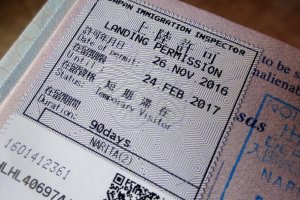
Information
03-5501-8431
Top Articles
- Recommended

Shake Shack Shibuya

Japan To Issue New Banknotes in July 2024

Gorgeous Genbudo

The Bridge of Dreams

Pokémon Sleep Comes to Grand Hyatt Tokyo

Sake at the Foot of Mount Fuji

Sakaemachi After Dark

Nintendo Museum Coming Autumn 2024

AN ANCIENT ART

Discover the Magic of Yuzen Dyeing

Guide to Bringing Medicines Into Japan

Your Name: Real-Life Locations in Tokyo

Gion Matsuri

The Ultimate Guide to Thrifting in Tokyo

Hachiko Statue in Shibuya

Sumidagawa Fireworks Festival

Japanese Urban Legends

Daikoku Car Meet

Guide to Suica Cards

Shibuya Crossing
More from this category, guide to bringing medicines into...
By Japan Travel

Money in Japan
By Tom Roseveare
Japan To Issue New Banknotes in..

Emergency Contact Information..
By Edward Yagisawa
Join the discussion

Let us know how we can help.
Help us improve JapanTravel.com
We welcome any suggestions regarding this content. Your feedback is confidential and will be used to help improve this page.
Suggest an edit
https://en.japantravel.com/guide/japan-visa/34951
Thank you for your support!
Your feedback has been sent.
Entering Japan
Below is a basic introduction to the Japanese immigration system. Contact your closest Japanese embassy or consulate outside Japan or an immigration bureau inside Japan for official advice.
All foreigners, including foreign residents, get fingerprinted and photographed upon entering Japan as a measure aimed at preventing terrorism and other illegal activities. Excluded from this procedure are persons under the age of 16 and a few special groups, such as diplomats and visiting dignitaries.
All foreigners receive a status of residence when entering Japan. There are more than twenty statuses of residence, including "temporary visitor" for tourists, and a range of statuses for students , workers and relatives of Japanese nationals and residents.
If you are a citizen of one of the over 50 countries with which Japan has a "general visa exemption arrangement", you need only a valid passport to enter Japan as a "temporary visitor". Otherwise, you need to obtain a visa before entering the country. Temporary visitors from most countries are allowed to stay for up to 90 days.
If you are a citizen of Austria, Germany, Ireland, Liechtenstein, Mexico, Switzerland or the United Kingdom, you have the possibility to extend your stay to a total of up to six months. You still initially enter Japan on a 90 day permit, but can then apply for an extension at an immigration bureau in Japan.
Visitors to Japan are encouraged to use Visit Japan Web to digitally submit immigration and customs-related information ahead of their arrival for a smoother entry into the country without the need to fill out paper forms. The system can be used to also create a tax exemption QR code for an enhanced tax-free shopping experience.
Temporary visitors are not allowed to engage in any paid activities. However, short term studies at Japanese language schools are permitted.
All foreign tourists in Japan are required to carry their passports with them at all times.
Longer stays for the wealthy and digital nomads
If you are a citizen of one of the over 50 countries with which Japan has a "general visa exemption arrangement" and have savings of over 30 million yen, you and your spouse may qualify to stay in Japan for up to one year for the purpose of sightseeing and recreation. Likewise, professionals with an annual income of over 10 million yen may qualify to work remotely from Japan for up to six months. Respective visas (for "long-term residents for sightseeing/recreation" or "digital nomads") have to be obtained before traveling to Japan.
White-collar work
Foreigners who wish to work in Japan need to get a work visa from a Japanese embassy or consulate outside of Japan to enter the country on a status of residence permitting work.
There are over a dozen such statuses of residence, each allowing the holder to work only in a specific professional field, for example, journalism, arts, research, education, engineering, entertainment, business management, international services, etc. If you change jobs while you are in Japan and your new job falls into a different professional field (e.g. from education to engineering), you will need to change your status of residence.
A university degree or considerable professional experience in the applicable field is required to qualify for most work visa types. Most also require you to have a prospective employer as a sponsor. Residence permission is granted in periods of 4 months to 5 years and is extendable.
Workers may bring their spouses and children to Japan on a dependent visa. Dependents are not allowed to engage in any paid activities unless they get permission from the immigration office, but even then, they may work only a set maximum number of hours per week.
Other work and trainees
The so-called "Specified Skills" status allows for work in one of over a dozen professional fields, including construction, hospitality, nursing and manufacturing. Applicants do not need a degree but have to pass a technical skills test and know some Japanese. There are two types: Type 1 allows workers to stay in Japan for up to five years, but they may not bring their family. Type 2 is for more highly qualified workers, can be extended indefinitely and allows for the family to live in Japan. Type 1 holders may upgrade to type 2 after five years.
Furthermore, there is the "Technical Intern Training Program", which lets foreign workers acquire skills at a workplace in Japan that they could not otherwise acquire in their home countries. After a few years, participants become eligible to switch to the above-mentioned "Specified Skill" type 1 status. Most trainees come from South East Asia.
Working holidays
This is a special visa type that allows some paid activity for citizens of Australia, Canada, Denmark, Germany, France, Ireland, Korea, New Zealand, the United Kingdom and a few other countries between the ages of 18 and 30. Consult the working holiday visa page for details.
Foreigners who wish to study in Japan (except for short term studies at language schools ) need to get a student visa at a Japanese embassy or consulate outside of Japan in order to enter the country on a status of residence that permits long term studies.
Sponsorship from an educational institution in Japan and proof of sufficient funds to cover all your expenses during your stay are required to qualify for a student visa. Residence permission is granted in periods of between 3 months and 4 years and 3 months and is extendable.
Students must not engage in paid activities unless they get permission from the immigration office. Even then, students may work only a set maximum number of hours per week.
Foreigners who are married to a Japanese national or to a permanent resident of Japan can obtain a spouse visa, which allows them to engage in any paid activity in Japan. Residence permission is granted in periods of 6 months or 1, 3 or 5 years and is extendable.
Staying in Japan
Inside Japan, most immigration-related matters, such as extending residence permission or changing the status of residence, are handled by the Immigration Services Agency, which has bureaus across the country.
Residence card
All new foreign residents are issued a residence card upon initially entering Japan at Narita , Haneda , Kansai or Chubu airports. New residents arriving through different ports can get their cards at their municipal offices.
The residence card is an important document required for opening a bank account , obtaining a cell phone , converting a drivers license and similar activities. It stores the holder's personal information, including the current address, the status of residence and period of stay. Foreign residents are required to carry their residence card with them at all times.
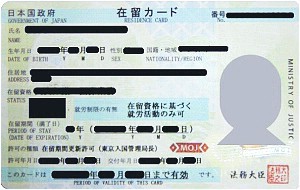
Extending residence permission
Most statuses of residence allow you to stay in Japan for a period between three months and five years. If you wish to stay longer, you must apply for an extension at an immigration bureau inside Japan before the expiry date of your current residence permission.
The application process is relatively simple, provided that you still fulfill the conditions for the specific status of residence. It typically takes a couple of days or weeks for the application to be processed, and you are allowed to remain in Japan during that time even if your previous residence permission expires in the meantime.
Changing status of residence
It is possible to change your status of residence (e.g. from instructor to arts or from student to engineer) at an immigration bureau inside Japan. You will have to provide similar documentation as you would when applying for a new status of residence at an embassy or consulate outside of Japan.
Re-entry permits
Foreign residents who wish to temporarily leave Japan for longer than a year, need to get a re-entry permit before departing Japan; otherwise, they lose their status of residence. Re-entry permits can be obtained at immigration offices in Japan. For absences of less than one year, re-entry permits are not required.
Permanent residence
Foreign residents, who have shown good conduct and have sufficient assets or ability to make an independent living, can be granted permanent residence if they reside in Japan for a certain number of consecutive years. For highly-skilled professionals and spouses of Japanese nationals, the minimum amount of years is typically one to five years, while for others it is typically ten years. Permanent residence status is indefinite and allows for any paid activity.
Naturalization
Foreigners, who have resided in Japan for at least five consecutive years (less if married to a Japanese national), have shown good conduct, have never plotted against the Japanese government, have sufficient assets or ability to make an independent living and are willing to renounce any other citizenship held, can be granted Japanese citizenship.
Questions? Ask in our forum .
Links and Resources
A guide to japanese visas, japan customs, guide to the animal quarantine service, the ministry of foreign affairs, immigration services agency of japan.

Visa Traveler
Exploring the world one country at a time
Japan Visa for Tourists in 2024: A Comprehensive Guide
Updated: March 26, 2024
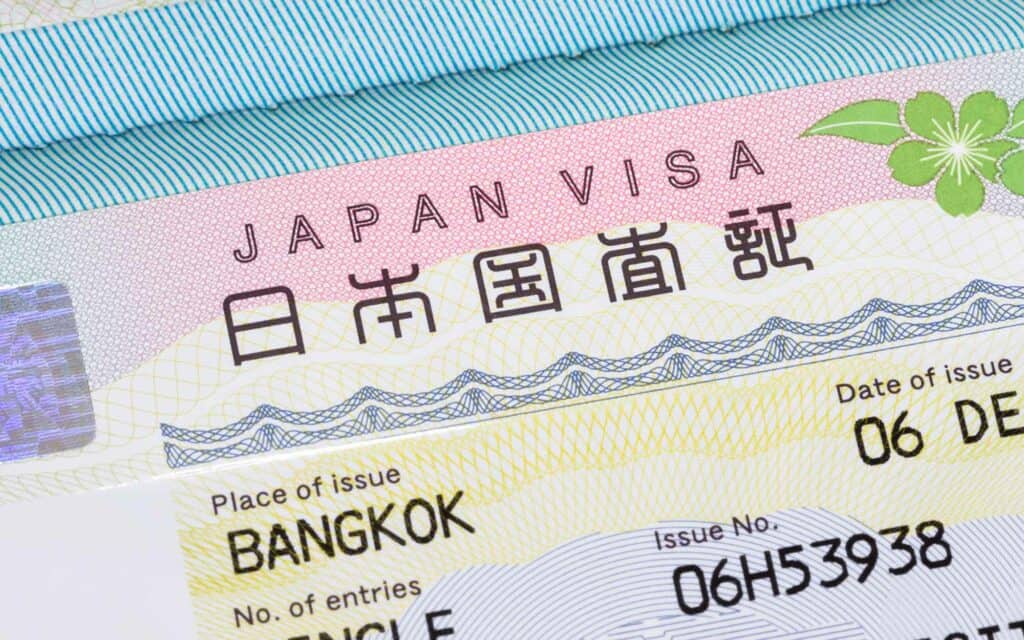
After being completely closed for tourism for more than 2 years, Japan finally reopened on October 11, 2022, restoring the previous visa exemptions and reducing the visa requirements.
Many nationalities are exempt from having to get a visa. Nationals and residents of select countries can obtain an eVisa online and everyone else can visit one of the over 200 embassies and consulates worldwide.
Table of Contents
Visa policy and visa types.
Nationals from 70 countries can travel to Japan visa-free . Most can stay up to 90 days.
Unless exempt, nationals and residents from 11 countries can apply for an eVisa online. They may still have to visit their nearest Japanese embassy. The eVisa allows stays for up to 90 days.
Everyone else must obtain a regular tourist visa from a Japanese overseas mission before traveling.
Japan does not have a visa on arrival.
Below is a summary of available visa types for tourists.
Entry Requirements
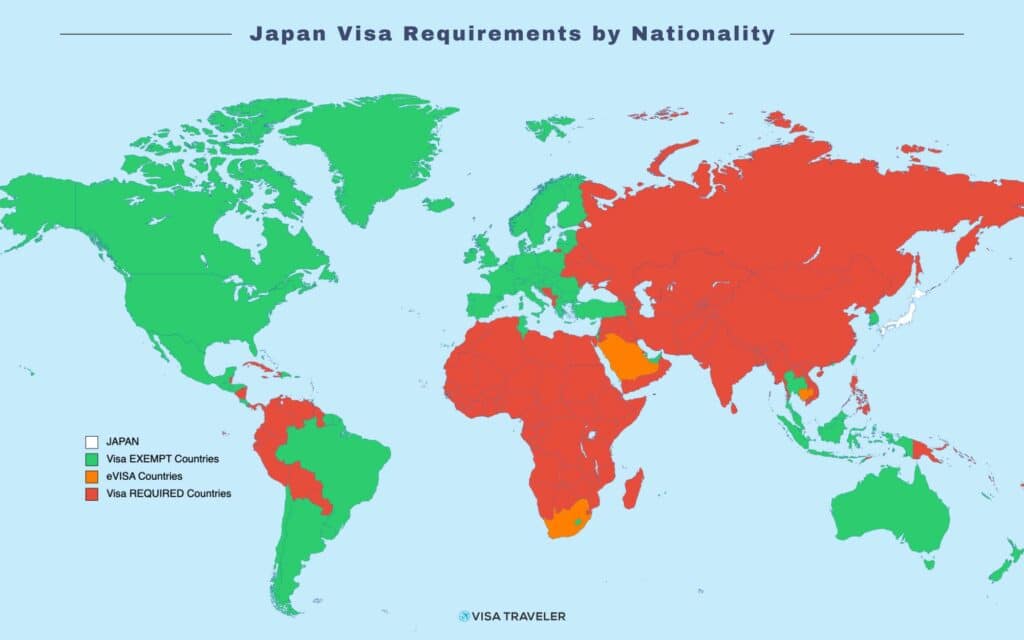
The following requirements apply to all visitors to Japan:
- Passport, which will remain valid during the period of stay
- Proof of sufficient funds to cover the cost of stay
- Return or onward ticket
Border officials rarely ask about the last 2.
For the specific visa requirements, see the corresponding section below.
Visa Exemption
Nationals of 70 countries are visa-exempted to travel to Japan. 65 countries are allowed to stay 90 days and the remaining 5 countries are allowed to say 14 to 30 days depending on the nationality.
There are additional requirements for some nationalities, outlined below. It’s best to check the official Japanese Foreign Ministry website for details.
- Austria (6)
- Barbados (5)
- Czech Republic
- Dominican Republic
- El Salvador
- Germany (6)
- Hong Kong (3)
- Ireland (6)
- Lesotho (5)
- Liechtenstein (6)
- Malaysia (2)
- Netherlands
- New Zealand
- North Macedonia
- South Korea
- Switzerland (6)
- United Kingdom (6)
- United States
- United Arab Emirates (2)
- Indonesia (1)
- Thailand (2)
- Must register an ePassport at a Japanese embassy in the respective country. Registration is valid for 3 years but not longer than the passport’s expiry date.
- Must have an ePassport, otherwise, need a visa.
- Only for passports issued by the corresponding Special Administrative Region.
- Must have a personal ID number.
- Must have a Machine-Readable Passport .
- Eligible to extend their stay to up to 6 months. Applications are made at a Regional Immigration Bureau inside Japan.
Japan eVisa
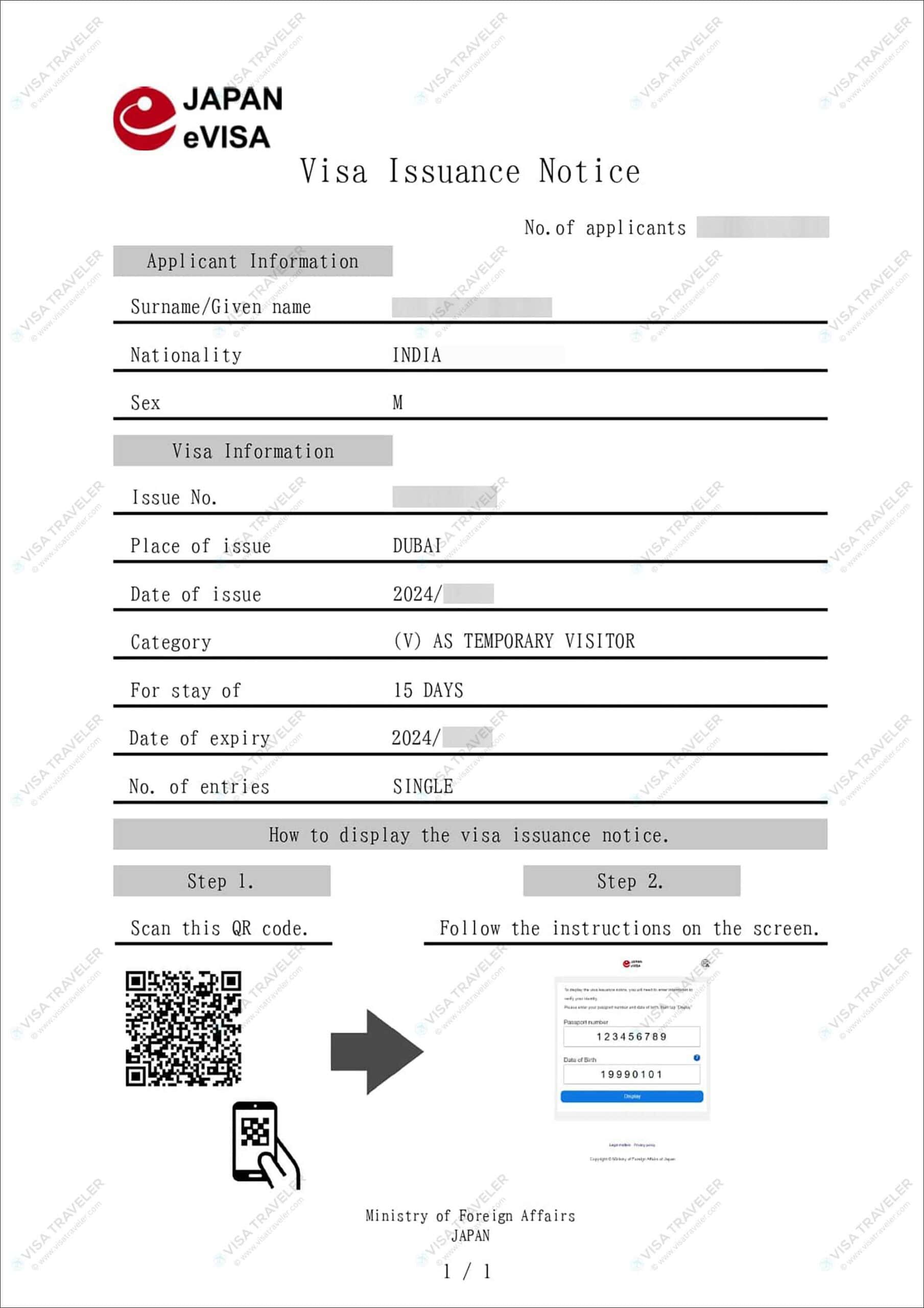
All nationals and residents from below 14 countries are eligible to apply for Japan eVisa. Those already visa-exempt don’t need to apply.
- Saudi Arabia
- South Africa
- United Arab Emirates
- United Kingdom
- Mongolia*
*Required to apply through an agency (see below).
Characteristics
- Only for tourism
- Valid for 3 months, single-entry only
- Duration of stay up to 90 days
- Fee 3,000 JPY or equivalent. Payable online or in person at the embassy. Some nationalities are exempt from the fee (check with your embassy)
- Processing takes 5 days to issue but could sometimes take longer
Documents required
What documents are required depends on your nationality and residence. These are the most commonly asked documents but check on the eVisa portal online for an exact list.
- Passport scan
- Color picture taken within the last 6 months
- Proof of immigration status (e.g. Permanent Residence Card or Visa if applicable )
- Flight itinerary (you don’t have to buy the tickets in advance, an itinerary from an airline is sufficient)
- Recent bank statement
- Travel itinerary (must be specific format, download eVisa travel itinerary template here)
- Proof of current residential address (e.g. driver’s license, state ID, utility bill, or lease agreement)
- Visa for the country you will visit after Japan (unless it’s your own country)
Application procedure
Applying online is incredibly simple. You can check out this video from Japan’s MOFA or follow the steps below.
- Go to Japan eVisa portal
- Register an account
- Fill out the application and upload the necessary documents
- Wait for your documents to be examined. You may be asked to submit additional documents. You will receive an email inviting you to pay when this step is complete.
- Pay online or in person
- After the eVisa has been issued, log in and make sure you can show the “ Visa Issuance Notice ” on your smartphone.
There’s no need to print any documents. On the contrary, you must show the visa on a digital device. Screenshots are not accepted either.
At the border, show the visa issuance notice with the QR code.
Once inside the country, you will receive an email saying your eVisa has expired. Don’t panic. This means you cannot use it to enter Japan again. You are allowed to stay up to 90 days inside Japan.
Applying from China, Vietnam, and Mongolia
Obtaining an eVisa for Japan in these three countries comes with special provisions.
EVisa is available to nationals of China who reside in China (excluding Hong Kong and Macau). You must apply through a Japan Visa Application Center or an accredited travel agency.
The eVisa grants entry to Japan for up to 30 days. Read more about it on the Japanese embassy in China website .
EVisa is available to nationals of Vietnam, who reside in Vietnam. You must book a packaged tour organized by a travel agency.
EVisa is available ONLY to foreign nationals who reside in Mongolia. You must apply at the Japan Visa Application Center (VAC) in Mongolia. Check with the Japanese embassy in Mongolia for more information.
Read the Japan eVisa article for more in-depth information on eVisa requirements, processing times, application process and border procedures.
Japan Tourist Visa
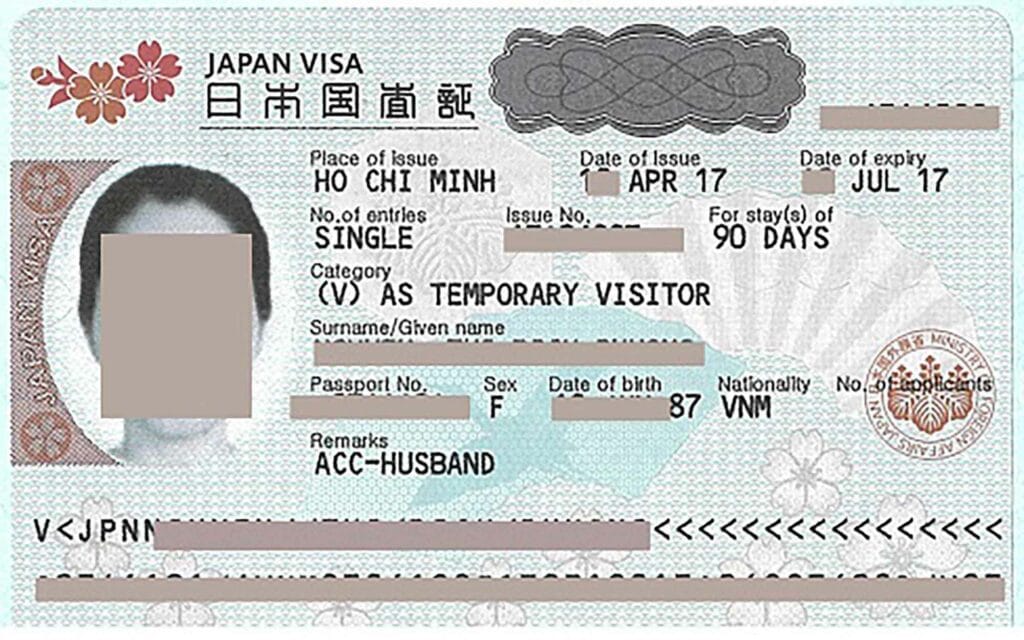
Everyone who’s not visa-exempt must obtain a visa to travel to Japan. If the eVisa isn’t an option, then you must obtain a tourist visa from a Japanese embassy.
Tourist visas are mostly single-entry. The term of stay can be either 15, 30 or 90 days from the date of entry. The visa itself is valid for 3 months for single entry and up to 5 years for multiple entry.
Requirements
The requirements for a tourist visa may differ depending on your nationality and the embassy you apply from. In most cases, they are:
- Passport with at least 2 blank pages
- Completed Visa Application Form
- 1 Passport-sized color photo taken within the last 6 months
- Flight itinerary
- Hotel reservation unless staying in an invitee’s home. It must cover the entire stay in Japan .
- Detailed, day-by-day itinerary in Japan .
- Most recent bank statement
- Proof of immigration status (if applicable)
The visa costs 3,000 JPY (~21$) or equivalent.
For further reading, check out the Japan Tourist Visa article for details such as when to apply, photo requirements and the application process.
Benefits of Japan tourist visa
Japan’s tourist visa is becoming a strong visa these days. That means Japanese visas have added benefits such as VISA-FREE travel to many other countries. As of 2024, you can travel to 14 countries with a Japanese visa. Read the VISA-FREE countries for Japan visa article for more details.
Transiting in Japan
Not leaving the airport.
If you are not already visa-exempt, you can transit in Japan without a visa only if:
- You stay within the international transit area of the airport;
- You have the necessary documents needed for the next country of destination;
- within 72 hours for Tokyo Haneda Airport or Kansai Airport (Osaka);
- within the same calendar day for all other airports.
Transit Visa
If you intend to pass through immigration and enter Japan for a short period, you must obtain a transit visa.
The requirements and procedures for obtaining transit visas are identical to regular tourist visas.
The main differences are in cost and duration of stay. The transit visa costs 700 JPY (~5$) and is issued for a maximum of 15 days but usually just 2-3 days until your next flight.
Japan Shore Pass
If you are transiting in Japan for less than 72 hours and you have a connecting flight that’s NOT on the same day, you may be able to obtain the Japan Shore Pass.
The application for it is usually done by the airline so it’s best to consult them.
To be eligible for the shore pass, you must arrive and depart from airports and seaports within the same group.
- Airports : Narita, Haneda, Nagoya, Niigata, Komatsu, Yokota.
- Seaports : Tokyo, Yokohama, Niigata, Nagoya.
- Airports : Osaka, Nagoya, Komatsu.
- Seaports : Osaka, Kobe, Nagoya.
- Airports : Fukuoka, Nagasaki, Kumamoto, Kagoshima, Naha, Kadena.
- Seaports : Hakata, Shimonoseki, Naha.
- Airports : Chitose.
- Seaports : Tomakomai, Otaru, Hakodate, Muroran.
Entry Procedure at the Airports
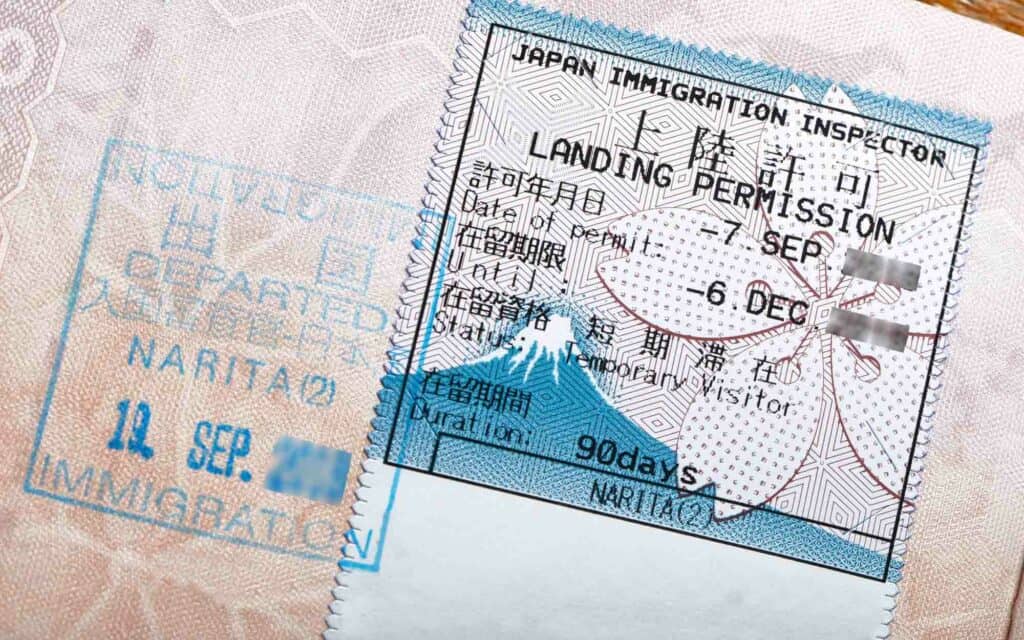
You may use the Visit Japan Web to submit all required information online. It’s not mandatory. Instead of paper forms, you will show QR codes.
After landing, you will sequentially go through immigration and customs.
If you got the eVisa, show your visa issuance notice on a smartphone. Otherwise, just your passport. Get a stamp and enjoy Japan.
Frequently Asked Questions (FAQs)
Is a covid vaccination certificate required to travel to japan.
COVID vaccination certificates and tests are not required since April 29, 2023.
Can I apply for a Japan visa online?
Yes but only if you’re a national or resident of the 11 eligible countries listed above.
How much does a Japan visa cost?
Japan visa costs 3000 YEN or equivalent in another currency.
How long does visa processing take?
Japan visa processing normally takes 5 working days but it could take more. It’s a good idea to apply for a visa at least a month before you travel.
Can I get a multiple-entry visa?
Japan eVisas are single-entry only. Embassies may issue multiple-entry visas depending on your circumstances.
WRITTEN BY THIRUMAL MOTATI

Thirumal Motati is an expert in tourist visa matters. He has been traveling the world on tourist visas for more than a decade. With his expertise, he has obtained several tourist visas, including the most strenuous ones such as the US, UK, Canada, and Schengen, some of which were granted multiple times. He has also set foot inside US consulates on numerous occasions. Mr. Motati has uncovered the secrets to successful visa applications. His guidance has enabled countless individuals to obtain their visas and fulfill their travel dreams. His statements have been mentioned in publications like Yahoo, BBC, The Hindu, and Travel Zoo.
PLAN YOUR TRAVEL WITH VISA TRAVELER
I highly recommend using these websites to plan your trip. I use these websites myself to apply for my visas, book my flights and hotels and purchase my travel insurance.
01. Apply for your visa
Get a verifiable flight itinerary for your visa application from DummyTicket247 . DummyTicket247 is a flight search engine to search and book flight itineraries for visas instantly. These flight itineraries are guaranteed to be valid for 2 weeks and work for all visa applications.
02. Book your fight
Find the cheapest flight tickets using Skyscanner . Skyscanner includes all budget airlines and you are guaranteed to find the cheapest flight to your destination.
03. Book your hotel
Book your hotel from Booking.com . Booking.com has pretty much every hotel, hostel and guesthouse from every destination.
04. Get your onward ticket
If traveling on a one-way ticket, use BestOnwardTicket to get proof of onward ticket for just $12, valid for 48 hours.
05. Purchase your insurance
Purchase travel medical insurance for your trip from SafetyWing . Insurance from SafetyWing covers COVID-19 and also comes with a visa letter which you can use for your visas.
Need more? Check out my travel resources page for the best websites to plan your trip.
LEGAL DISCLAIMER We are not affiliated with immigration, embassies or governments of any country. The content in this article is for educational and general informational purposes only, and shall not be understood or construed as, visa, immigration or legal advice. Your use of information provided in this article is solely at your own risk and you expressly agree not to rely upon any information contained in this article as a substitute for professional visa or immigration advice. Under no circumstance shall be held liable or responsible for any errors or omissions in this article or for any damage you may suffer in respect to any actions taken or not taken based on any or all of the information in this article. Please refer to our full disclaimer for further information.
AFFILIATE DISCLOSURE This post may contain affiliate links, which means we may receive a commission, at no extra cost to you, if you make a purchase through a link. Please refer to our full disclosure for further information.
MORE VISA GUIDES

UNITED KINGDOM

VIEW ALL VISA GUIDES
- Cookie Policy
- Copyright Notice
- Privacy Policy
- Terms of Use
- Flight Itinerary
- Hotel Reservation
- Travel Insurance
- Onward Ticket
- Testimonials
Search this site
- Application
- Requirements
Japan Visa Requirements
Entry requirements for japan.
Japan has visa exemption agreements with 68 countries . Travelers from several countries in Latin America, Africa, and Asia as well as many former Soviet Union nations are required to obtain a visa to Japan .
There are a few entry requirements for Japan that must be considered when planning a trip to the country.
Japan Entry Visa Requirements
Foreign visitors who need a visa to travel to Japan must meet the following Japan tourist visa requirements .
- A valid passport with at least 6 months validity and 2 blank pages
- A completed and signed visa application form
- A recent photograph , size 4.5 x 4.5 cm, in color and with a white background
- An official birth certificate or a certified copy
- If the traveler is married, it is necessary to submit a marriage certificate issued within one year
- Schedule and travel plans in Japan

Visitors who are required to apply for a Japan visa should verify that they meet all the necessary requirements . It is essential to have a valid passport and complete the visa application form with the details exactly as they are on the passport.
The period of time to stay in Japan is differs from 15 days to 90 days, depending on the nationality of the passport traveler. All the other travelers are required to visit the nearest Japanese diplomatic mission and apply for a visa before departure.
Citizens of the following countries are required a tourist visa for Japan:
- Central African Republic
- Cote D'Ivoire
- Congo, The Democratic Republic of the
- Marshall Islands
- Moldova, Republic of
- Palestinian Territory
- Russian Federation
- Saint Kitts and Nevis
- Saint Vincent and the Grenadines
- Solomon Islands
- Syrian Arab Republic
- Timor-Leste
Japan entry requirements for citizens from visa exempt countries require that travelers carry a passport, valid for at least the proposed duration of their stay.
Other Requirements to visit Japan
There are some additional Japan visa requirements that foreign travelers need to take into account when submitting their application at a Japanese mission.
Some travelers have a sponsor or guarantor that will support the Japan visa application. A sponsor is a person that, under the visa conditions, will cover the expenses of the person applying for a visa.
If the traveler does not have a sponsor or guarantor for their trip to Japan it is necessary to demonstrate that they can cover the expenses of their stay. In order to do this, it is necessary to submit the following:
- Bank certificate, issued within the last 3 months
- Applicant’s income tax return
In the case that the traveler has a sponsor or guarantor it is necessary to provide:
- Guarantee letter where the relation between the traveler and the sponsor is explained and the details of the sponsor or guarantor must be included
- Proof of relationship with the guarantor
- Bank certificated and income tax return of the sponsor/guarantor
For questions or inquires about how to apply for a tourist visa to Japan, it is advised to contact the Japanese embassy or consulate.
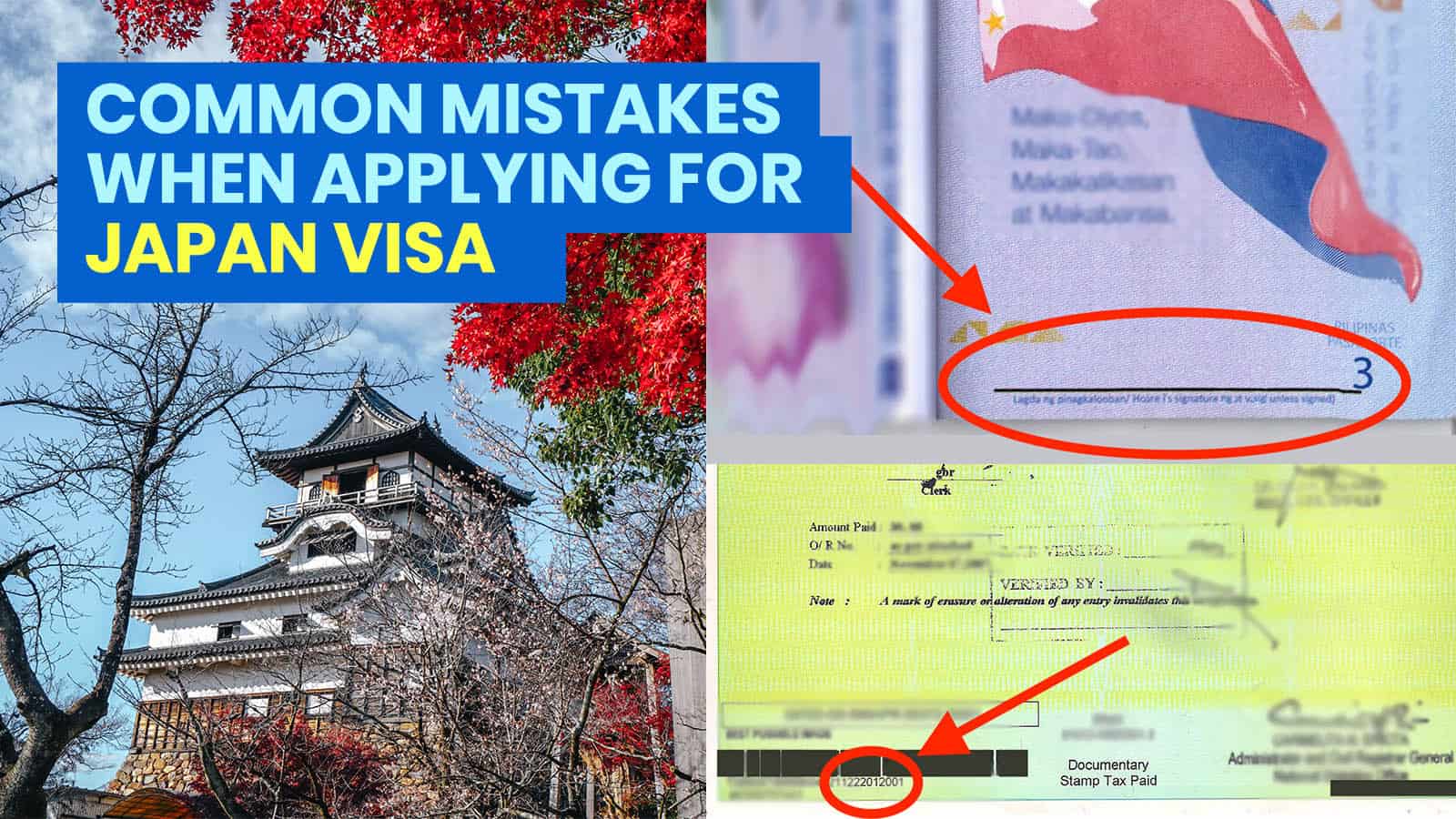
Avoid These 12 COMMON MISTAKES when Applying for a JAPAN VISA!

The Japanese visa is one of the easiest visas to secure for Filipinos. Ask a random Pinoy international traveler what their very first visa is and there’s a big chance it’s for Japan. Over the past decade, the Japanese Embassy has been very considerate, allowing more Filipinos to visit and explore their country.
The Japanese visa application is very straightforward. You complete their list of requirements, submit them through an accredited agency, and wait for the result. The agencies assess the documents one by one to make sure that everything is in order. But sometimes, there are things that applicants fail to notice, throwing a wrench into an otherwise smooth process.
Here are some of the common mistakes that Japanese visa applicants make.
1. Forgetting to sign the passport
Philippine passports must be signed to be valid. Older passports have your digital signature on the information page (Page 2). But the most recent version, the one with a 10-year validity, no longer has a digital signature.
You’ll be surprised by how many applicants don’t notice that there is a SIGNATURE LINE on Page 3 instead, just below the Philippine flag. And yes, it has to be signed.
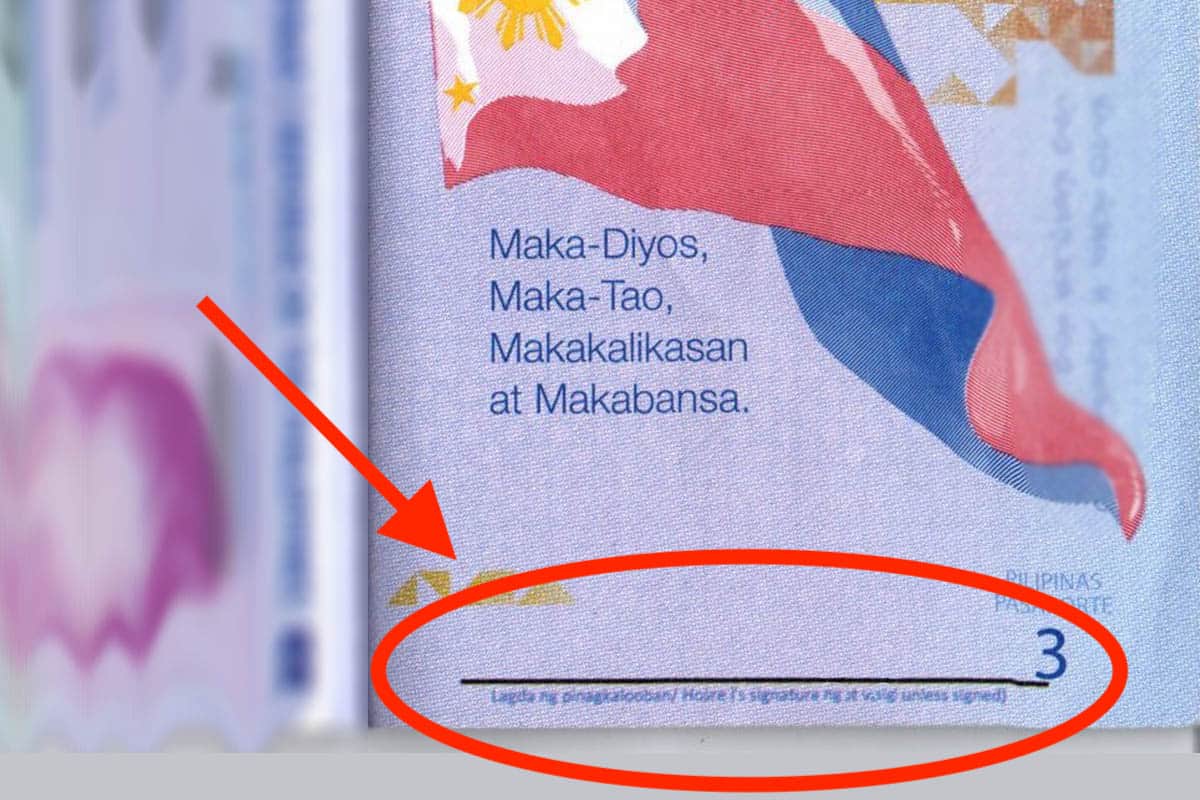
You might be thinking it isn’t really that big of a deal because you can simply sign it. But it gets more complicated when you’re applying for someone who isn’t with you at the time. It happened to me once, when I applied in Manila for a family member who was in the province. I had to return and apply another time.
It’s also important to note that the passport must have at least 2 blank pages and at least 6 months validity.
2. Not using the right paper size (A4)
The Japanese visa application standard paper size is A4. All documents that you have control of the printing must be in A4 size. These documents include:
- Application form
- Daily schedule in Japan (itinerary)
- List of Visa Applicants (for group application)
- Invitation letter
- Guarantee letter
- Explanation letters
The agency may decline these documents if not in the right size.
3. Submitting birth certificates older than 1 year
The birth certificate must be issued by the PSA Main Office or Serbilis Outlet Center within the past one year. They don’t accept it when it’s older than that. They can see the date it was issued within the code at the bottom of the document.
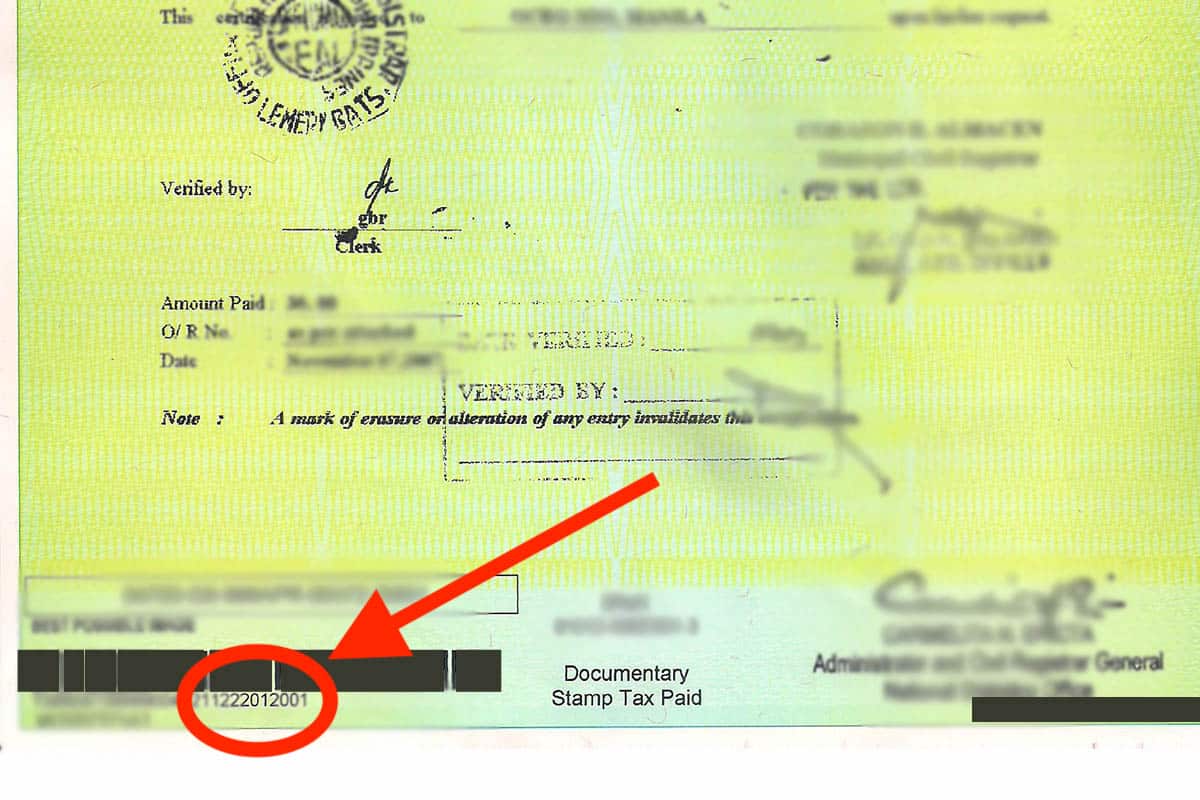
This is pretty common. Every time I apply at any agency, there’s always an applicant in the room who was asked to come back with a more recent copy of the birth certificate.
I don’t know why it has to be new, to be honest. But that’s the rule.
4. Failure to provide additional documents for late registration or no record
Another complication that many applicants overlook is the additional requirements when the birth certificate is marked “Late Registration”.
If you’re late-registered, submit a Baptismal Certificate and School Record (Form 137) from high school or elementary and School Yearbook (if applicable).
Moreover, if there is no record in PSA, submit a “Certificate of No Record” from PSA together with a birth certificate from the Local Civil registrar.
5. Applying too late
The Japanese Embassy processes applications fast. I have experienced getting my visa as early as two days after submission. That said, it doesn’t mean that you have to cut it too close to your travel date because in some unlucky cases, it can take much longer, sometimes weeks!
In addition, some agencies refuse to accept applications with travel dates that are shorter than a week away. For example, Reli Tours at SM Megamall has a 7-working-days policy. If the flight is scheduled sooner than 7 working days at the time of submission, they will NOT accept your application. It happened to a relative whom I accompanied at the agency. They turned us away and asked that we apply at another agency instead.
I’m not sure if other travel agencies have the same policy. Call them first if your trip is urgent.
6. Applying as a tourist but staying with a relative
We get a lot of inquiries about this. Tourist visa processing is way cheaper and way less complicated than a Visit visa, so it’s always tempting to go the former route. However, don’t apply for a tourist visa just because it’s convenient!
If you’re staying with a friend or relative in Japan, apply for a Visit Visa. It doesn’t make any sense to aim for a tourist visa when your documents clearly show you’re visiting and staying with someone there.
If you’re applying for a Tourist Visa, the logical Japanese address to write on the application form is that of a hotel, hostel, or another commercial accommodation.

7. Ignoring the “List of Visa Applicants” form when applying as a group
If you’re applying with a group or family, you need to accomplish and submit a form called “List of Visa Applicants.”
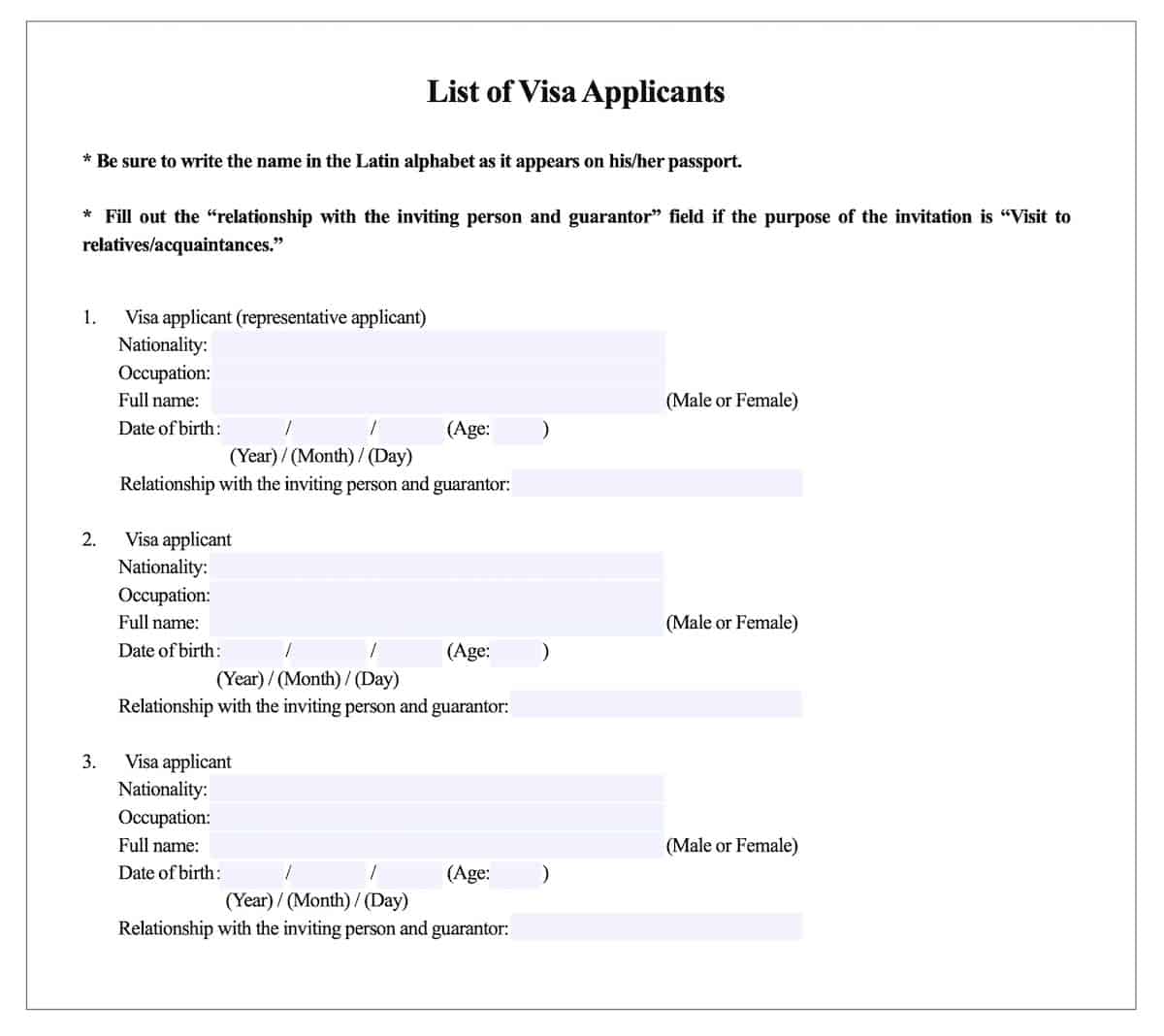
Bear in mind the following:
- You must have a REPRESENTATIVE APPLICANT, who will be the key person in your application. For example, if you’re applying as a family, one of the parents can be the representative. If one of the applicants/travelers will be sponsoring the rest of the group, that person can also be the representative.
- In the “relationship with the inviting person and guarantor” field, write N/A if you’re applying as a tourist. Fill this in only if you’re visiting friends or relatives in Japan.
- Must be printed on an A4-size paper. No other size is accepted.
You can download the form here .
No need to submit this if you’re applying alone.
8. Applying for a multiple entry visa when ineligible
If it’s your first time applying for a Japan visa, it’s best to aim for a single entry visa unless it’s justified or you’re eligible. If any of these apply to you, go for it:
- If you have travelled to Japan as temporary visitor within the last three years AND have sufficient financial capability to support their trip.
- If you have travelled to Japan as temporary visitor within the last three years AND have travelled as temporary visitor to G7 countries (excluding Japan) several times within the last three years. The other G7 countries are: Canada, France, Germany, Italy, the United Kingdom (UK) and the United States (USA).
- If you have high financial capacity (but has not been to Japan in the past 3 years). The keywords here are HIGH FINANCIAL CAPACITY.
- If you are an immediate family member (Spouse/Child) of a person who has high financial capacity.
If you’re none of the above, apply for a single entry visa in the meantime. Otherwise, you might be risking your application.
Anyway, sometimes they grant multiple entry visas to applicants who didn’t even request for it. (I know this because it happened to me.)
9. Not having enough funds to support your trip
The Embassy doesn’t explicitly say how much money you should have in the bank. The amount isn’t the only factor. It’s probably on a case-by-case basis.
- I have applied for a 15-day stay with only P100,000+ in the bank and my application got approved.
- A friend of mine applied for a 5-day stay with only P50,000 and got approved. She has a full-time job.
- Another friend applied for a 5-day stay with over P200,000 and got denied. She doesn’t have a regular job.
The rule of thumb is: your funds should be proportional to the length of stay. For example, if you have only P50,000, don’t apply for a 30-day stay because that would obviously raise a lot of questions regarding whether or not you can afford the trip.
10. Inconsistent application form and documents
Make sure that the information you write on the application form matches the supporting documents you submit. For example, if on the form you state you plan to stay in Japan for 5 days, don’t submit a 15-day itinerary. If you write on the form that you work for a certain company, your ITR should match.
If something doesn’t match, prepare an Explanation Letter. This happened to me before. At the time, I had just recently moved to another company so my ITR was from my previous employer. I had to write on the spot an explanation why employer on the form is not the same on my ITR.

11. Forgetting the seal or signature on the Guarantee/Invitation Letter
What I like about Japan visa application is that they have standard forms for everything, including Invitation and Guarantee letters. You don’t need to guess the information you need to include because they are indicated on the form.
The problem with this is that there are certain items that are easy to overlook because of their placement. One of them is the SEAL .
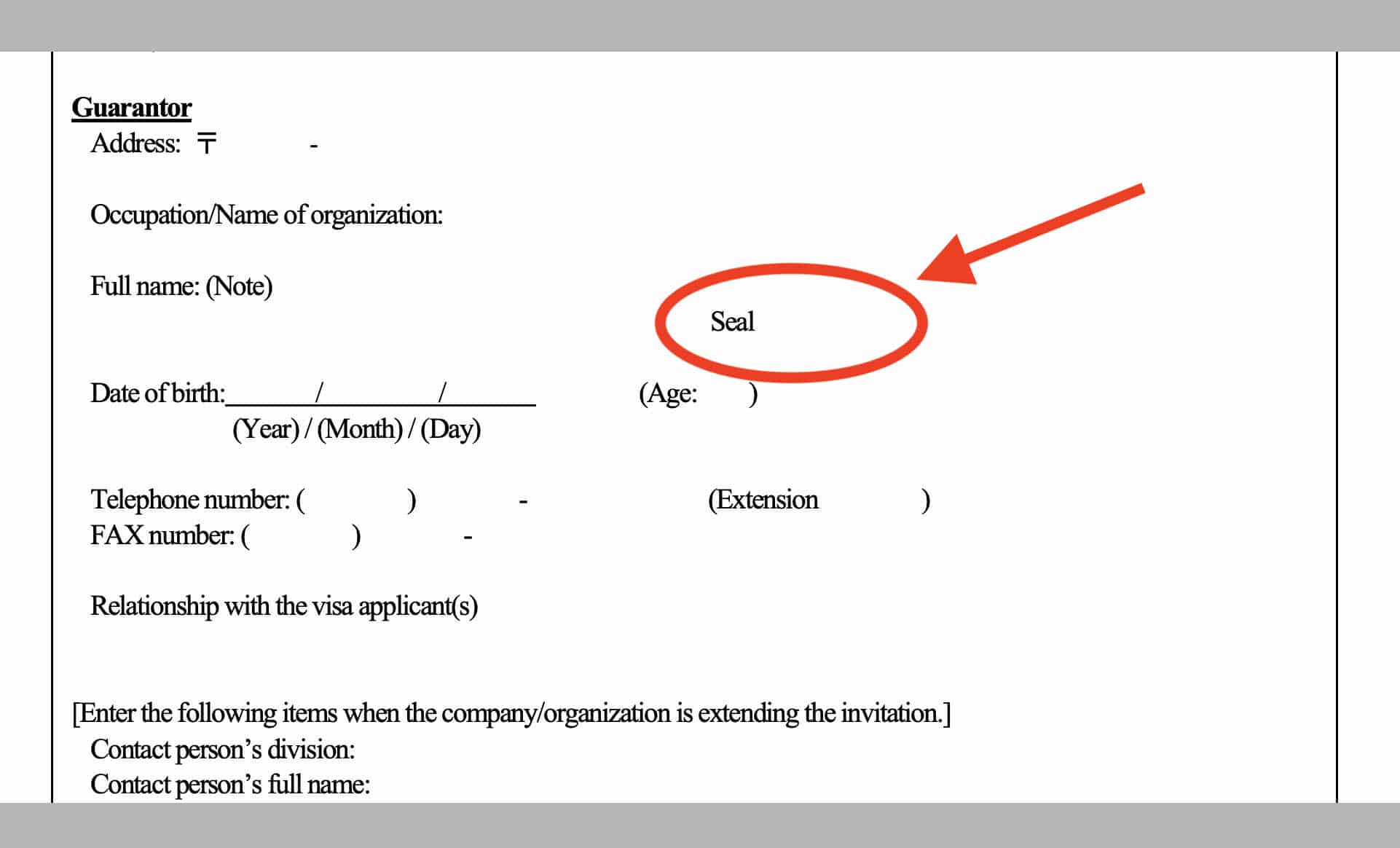
Japan residents have a seal that they use on official documents. If your inviter or guarantor is a Japanese national or resident, have these documents stamped by them. If your inviter or guarantor is a foreign national who does not have a seal, they must put their signature in the same area.
12. Leaving non-applicable fields blank
If the question doesn’t apply to you, write N/A.
This is quite confusing because Japan and Korea have different policies, and most designated agencies process both Japan and Korean visas.
But here’s the generally accepted practice: For Japan Visa form, write N/A.
Related Japan Visa Posts
- Japan Visa Requirements for TOURISTS
- Japan Visa Requirements for VISITING RELATIVES OR FRIENDS
- How to Get a Multiple Entry Japan Visa
- How to Fill Out Japan Application Form
- Common Reasons why Visa Applications are DENIED!
- FIRST TIME ABROAD: Immigration Tips
- How to Avoid Getting OFFLOADED: Immigration Requirements & Tips
2020 • 2 • 25
More Tips on YouTube ⬇️⬇️⬇️
Is this post helpful to you?

Related Posts:
- HOW TO RENEW JAPAN VISA & Other Frequently Asked Questions
- MULTIPLE ENTRY JAPAN VISA: Requirements & How to Apply
- JAPAN VISA APPLICATION FORM: Sample + How to Fill it Out
- JAPAN VISA FOR VISITING FRIENDS OR RELATIVES: Requirements & Steps
- Sample INVITATION LETTER for JAPAN VISA Application (Reason for Invitation)
- SAMPLE ITINERARY for JAPAN VISA Application (Schedule of Stay)
- IMPORTANT JAPAN VISA UPDATE: Additional NCOV/COVID-19 Form to be Submitted
- JAPAN Suspends Visas Issued in the Philippines Prior to March 27
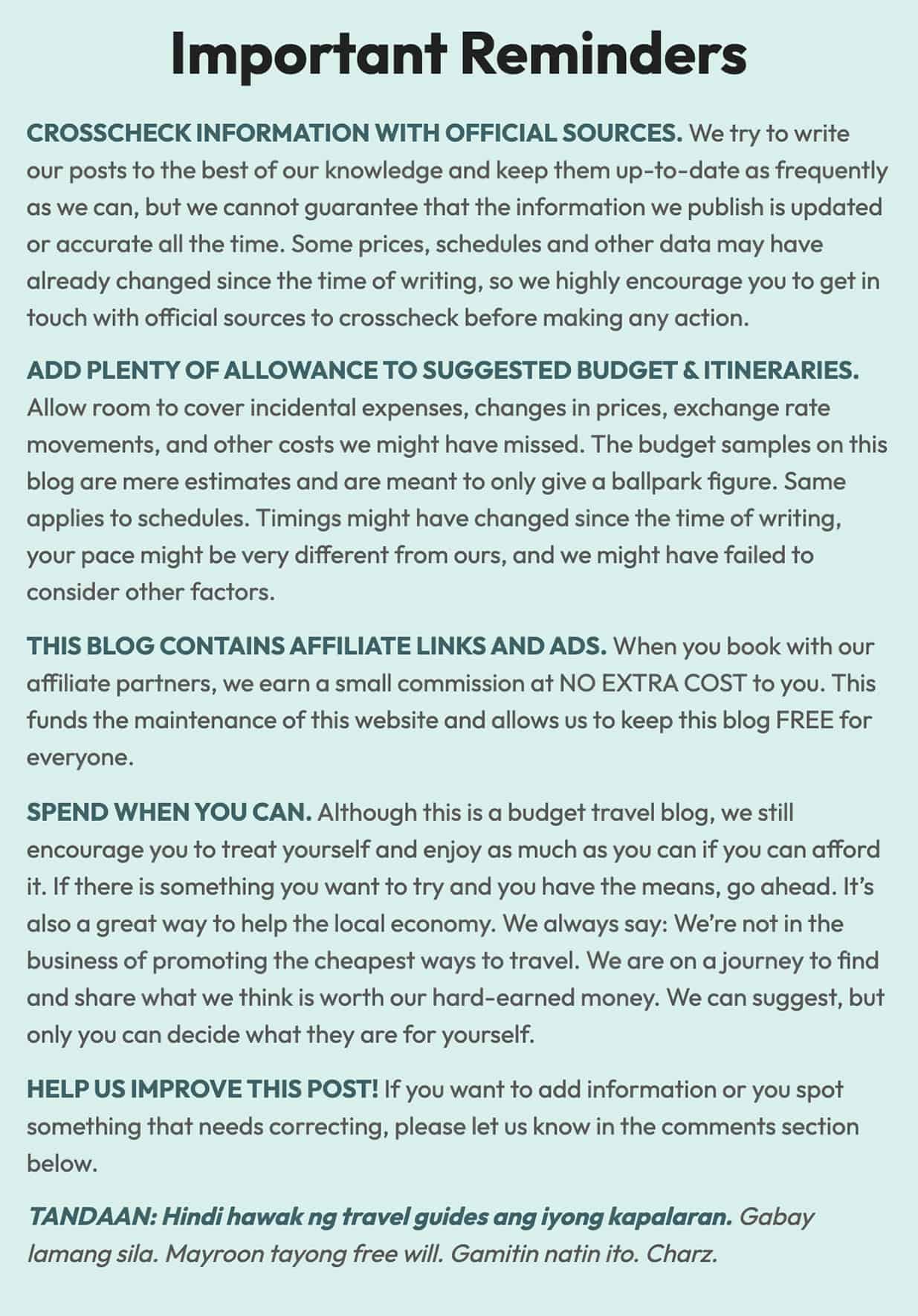
- Recent Posts
- Where to Eat Cheap in BANGKOK • 12 Best Affordable Restaurants (including Michelin-Awarded Food Places) - 19 June 2024
- 2024 Cebu Pacific Promos & PISO SALE with Number of Seats Available - 10 June 2024
- 2024 Philippine Airlines PROMO: Get 50% OFF on PAL Domestic Flights! - 16 May 2024
So if I am applying with my Wife for Tourist Visa for Japan then Me and My wife Needs to fill two separate application form and My Wife need to fill this “List Of Visa Applicants” where my name would be in reprensentative section.
Should my wife need to mention in relationship with Gurantor section as a “Husband” or it would be “N/A” only in Tourist Visa app?
She needs to fill out her own application form too. The list of visa applicants is simply used by the Embassy as reference to check which applicants are traveling together. Re Guarantor, See FAQ 1.
Btw, I’m assuming you’re applying from the Philippines.
Hi! Me and my girlfriend are planning to visit Osaka this coming March 2023, we already secured a ticket for 7 days. I’ve been to Japan in 2019 and would like to take my girlfriend there to celebrate our anniversary.
My mother would like to sponsor our trip and be our guarantor, can we just write on the application form of guarantor the relationship of my girlfriend and my mother as “son’s girlfriend”?
Hi I was born in September 1986 and my birth certificate was registered in November the same year is that already considered late registration? Do I really need to submit Form 137?
Hello Sir Yosh, can we still need a list of applicant form? me and my sister will apply as visit relative.
If you’re traveling with a group, yep!
Hello, I would like to ask if is it possible to enter japan when your birth certificate is late registered? My mother’s birth certificate was registered late, she has a baptismal certificate but do not have form 137 nor tor because she was not able to enter school.
Hello mr yosh. We will be traveling as a couple. Should i still fill up the “list of applicants” form? Thank you
Yep, if you’re traveling together.
is it true na malaki ang chances na dedeny ng japan visa ang mga solo travelers na babae na walang travel history?? if so, i am screwed. TT^TT
hello sir, Flight booking is mandatory or i can buy ticket after my visa approval? because may be Visa will refuse then money loss? I’m planning to apply for tourist visa.
Flight booking is NOT a requirement. You can buy ticket after.
Helpful post! I was wondering, you mentioned you had to write an explanation letter explaining why the employer on your ITR and your Visa application form were different. I’m in the same situation, I just moved to a new company so the one indicated on my ITR is different. Did you have to provide a COE from your new employer?
Hi! Yes. I always submit a COE for Japan kahit di required.
Featured On

We heard you!
Your comment is now queued for moderation! We’ll try to get back to you soonest. While waiting, follow us on these channels.
Subscribe on Youtube! Follow us on Instagram!


Girl Eat World
A girl's adventure in food and travel around the world, japan evisa: my experience applying for an electronic tourist visa to japan.
Planning a trip to Japan ? Good for you! Japan is one of my favorite countries to visit and I’m sure you’ll have a magical time there.
Recently, Japan has finally allowed us to apply for a Japanese tourist visa online, called the Japan eVISA system . Before the release of this new system, if you need a tourist visa to enter Japan, you’ll have to physically apply in person at the Embassy of Japan. It was a time-consuming process, and I’m glad they finally allowed us to apply online!
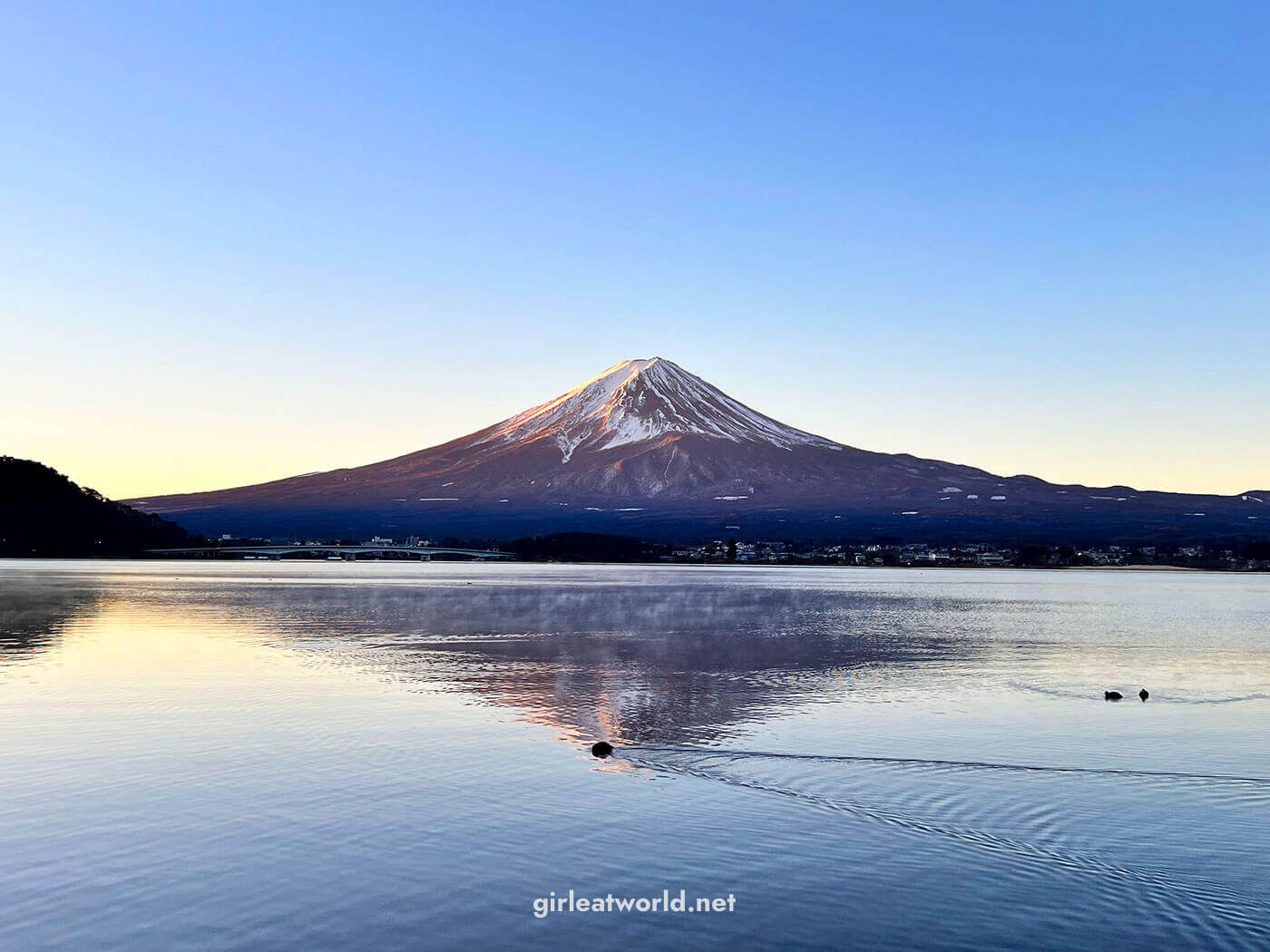
What does the Japan Tourist eVisa let you do?
Much like the regular short-term visa, the Japan eVisa lets you stay in Japan for a period of 90 days , and for the purpose of tourism . It is valid for entry within 3 months from the date of issue. Meaning, you can enter Japan any time within 3 months after the date of issue, and then you can stay for 90 days after your first day in Japan.
However, it’s worth noting that you can only apply for a single entry for eVisa. If you would like to get a multiple-entry visa, you’ll still need to make an appointment at the embassy and apply in person.

Who can apply for the Japan eVisa?
As of the time of writing, only residents (not to be confused with citizens) in the following 11 countries and are required to obtain a short-term visa on visiting Japan are eligible to apply for the Japan eVisa:
Australia, Brazil, Cambodia, Canada, Saudi Arabia, Singapore, South Africa, Taiwan, United Arab Emirates (except areas with the jurisdiction of the Consulate-General of Japan in Dubai), United Kingdom, U.S.A.
PS: This is a growing list of countries, so be sure to check the complete list from MoFA here .
Also, please be aware that I bolded the word “ residents ” above. This is in purpose so that you will not confuse it as citizens/passport holders of the countries I listed. You only need to be a legal resident in that country.
For example, if you are a Singaporean and hold a Singapore passport, you do not need to apply for a visa to Japan. However, if you are an Indonesian passport holder legally residing in Singapore (on a proper work visa or holding permanent resident status for example), you could apply for eVisa since Singapore is one of the countries listed. BUT, If you are an Indonesian passport holder residing in Indonesia, you’ll still need to apply for Japan visa through the Embassy.
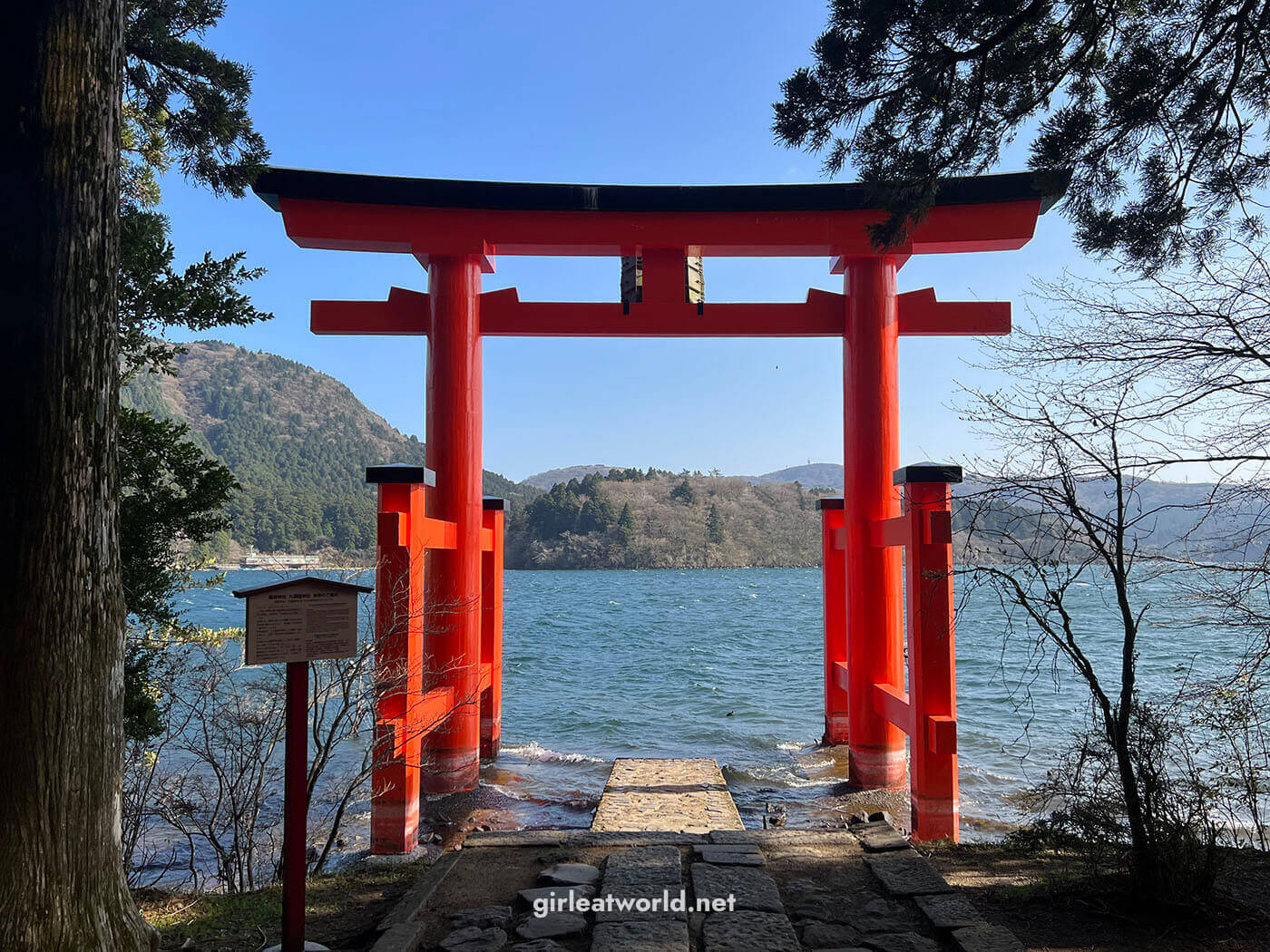
How much does it cost to apply for the Japan eVisa?
Typically, it costs 3,000 yen to obtain the visa. However, it depends on the agreement Japan might have with each country. Citizens of certain countries are exempt from paying visa fees, and therefore also exempt from the eVisa fees.
You can refer to the website of the Embassy of Japan in your country for more information regarding Visa fees. Here are the visa fees from the Embassy of Japan in Singapore, for example.
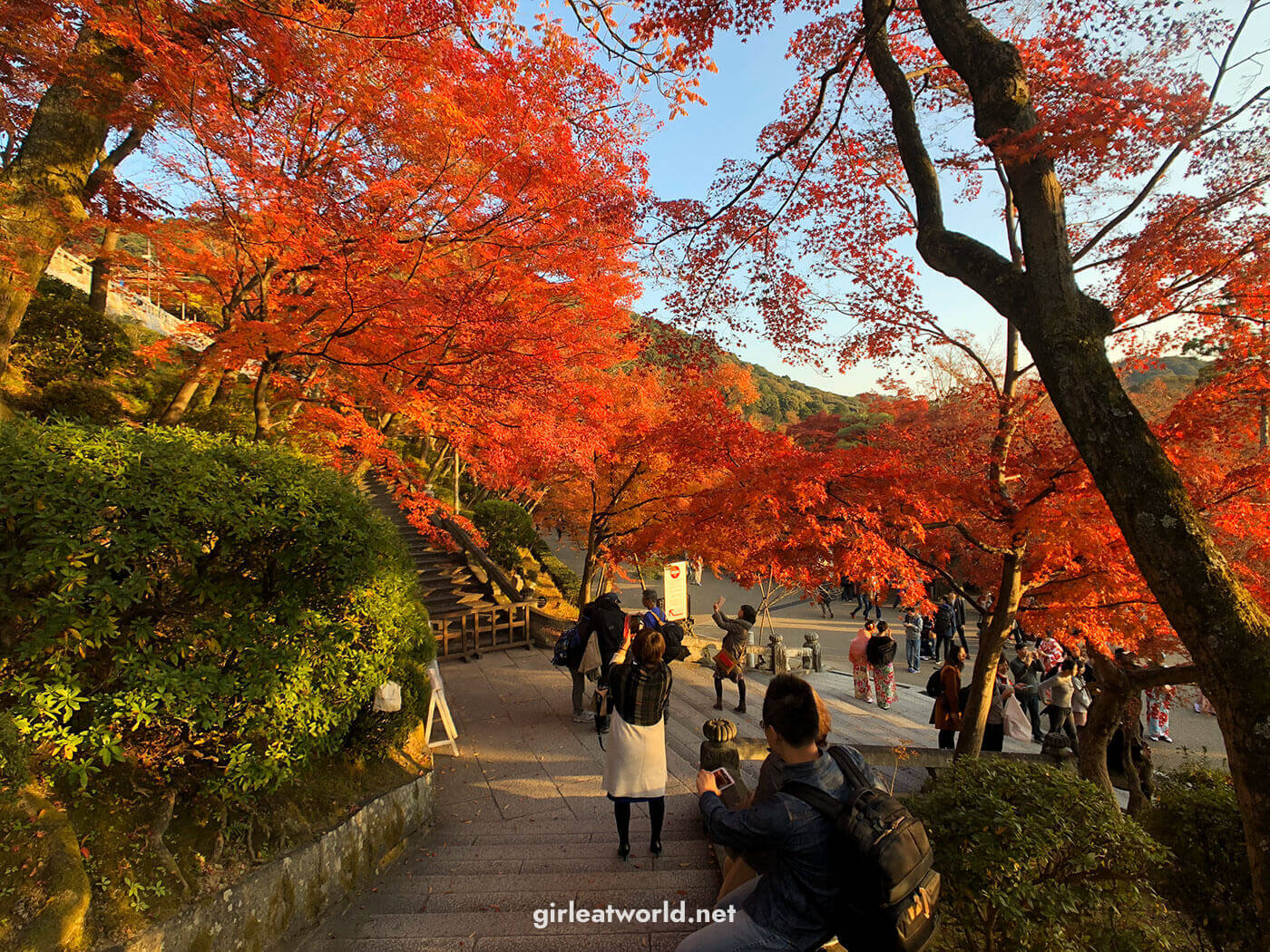
How can I apply for the Japan eVisa?
Applying for the visa was a long process, but it’s quite easy! I’ll break down step by step for you here:
Step 1: Understand what the Japan eVisa is for
First, you can read up about the Japan eVisa system here .
As I explained before, the eVisa is currently only available for single-entry tourism, for a maximum stay of 90 days.
If you would like to get a multiple-entry visa, or if you want to stay longer than 90 days, or visit Japan for reasons other than tourism, you’ll still need to make an appointment at the embassy and apply in person.
Step 2: Prepare the necessary documents
If you have decided that you would like to apply for the visa electronically, then you can proceed to check the necessary documents here .
When applying for a tourist visa, you will need:
- Passport Photo – A passport photo with a plain background. I used a white background and it went through just fine.
- Passport Biodata – A scan or photo of your passport biodata
- Government-issued ID – A scan of your government ID
- Flight itinerary – You will get this from the airline once you have booked your flight
- Schedule of Stay – Daily activities of what you are planning to do when you are in Japan. Use the template provided!
- Financial Proof – Document to prove the ability to pay for travel expenses. Usually, this is in the form of a Bank statement of Income tax assessment
- Certificate of Employment – Issued by the company that employs you. Your HR should be able to help with this.
Make sure that you have all the documents scanned and available as a PDF file on your laptop or computer. Jpg, bmp, gif, and heic file formats are also accepted.

Step 3: Sign up for an account at the eVisa Portal
Once you have all the necessary documents scanned, you can then proceed to the Japan eVisa portal here .
You will need to create an account by providing email and password. Please keep this credential safe somewhere. You MUST remember this information to check on the visa status later. You’ll also only be able to download the visa issuance (once the visa has been approved) by logging in to the account.
Each time you log in, they’ll send an authentication code to the email, so also make sure you’re providing a legit email that you have access to.
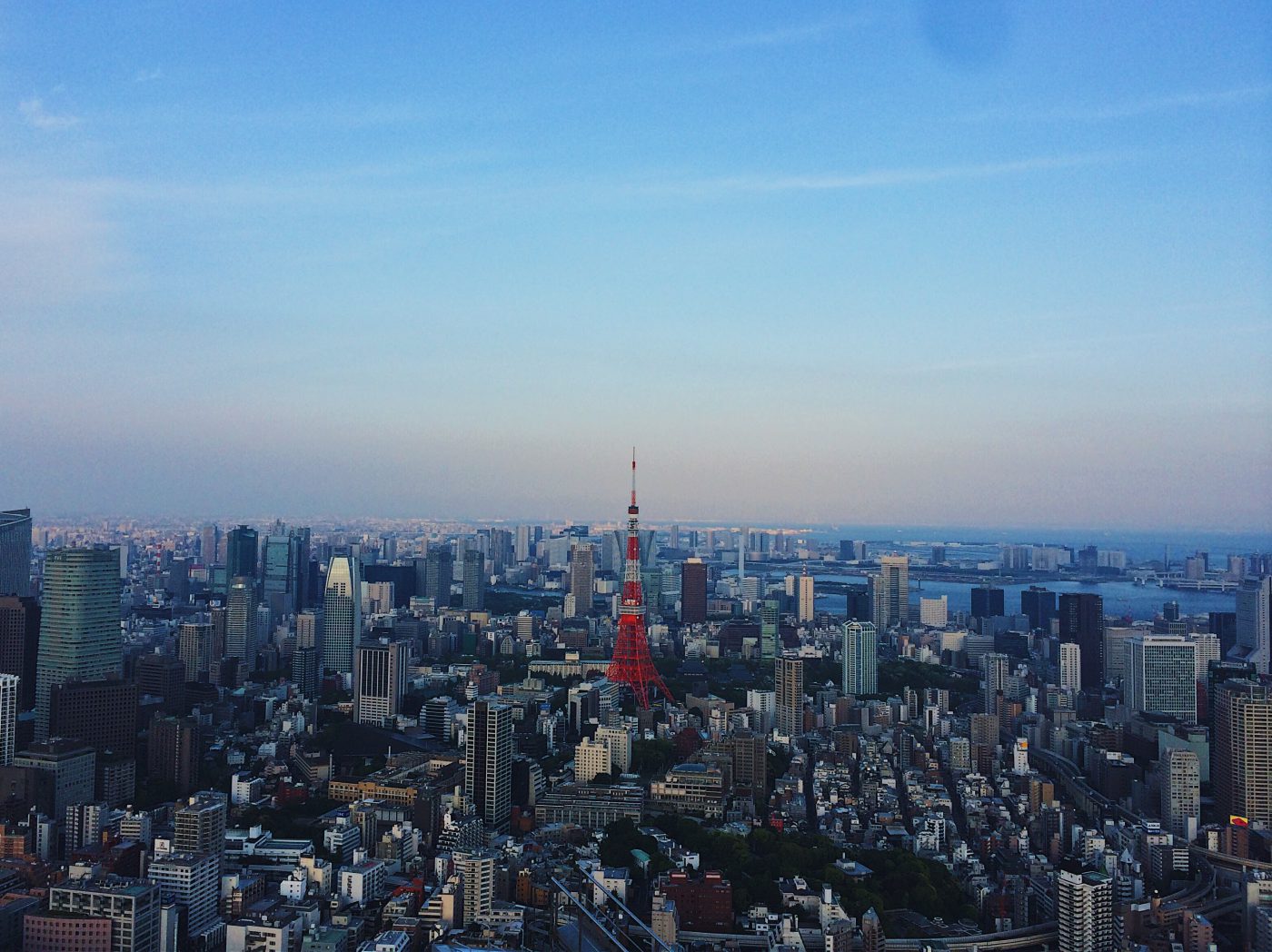
Step 4: Submit your application
Once you have created the account, log in to the eVisa portal and click on “New Registration”. From here onward, start filling in the form and uploading the documents you have prepared in Step 2.
For the most part, I did not have issues uploading the documents.
Step 5: Monitor your eVisa application status
Once your application has been submitted, you can monitor the status in the Japan eVisa portal here , using the same credentials you created back in Step 3.
After you’ve submitted your application, you should be able to see it under “Visa Application List” menu.
You should also look out for any emails requesting additional documents. In my case, they came back and ask me to redo my Schedule of Stay as I did not furnish enough details for the planned activities. So the second time around, I made sure to include everything and where I was planning to stay. I was also honest that some of the trips within Japan are still in the planning stage and put “TBD” as places to stay as I did not know yet. They were okay with it!
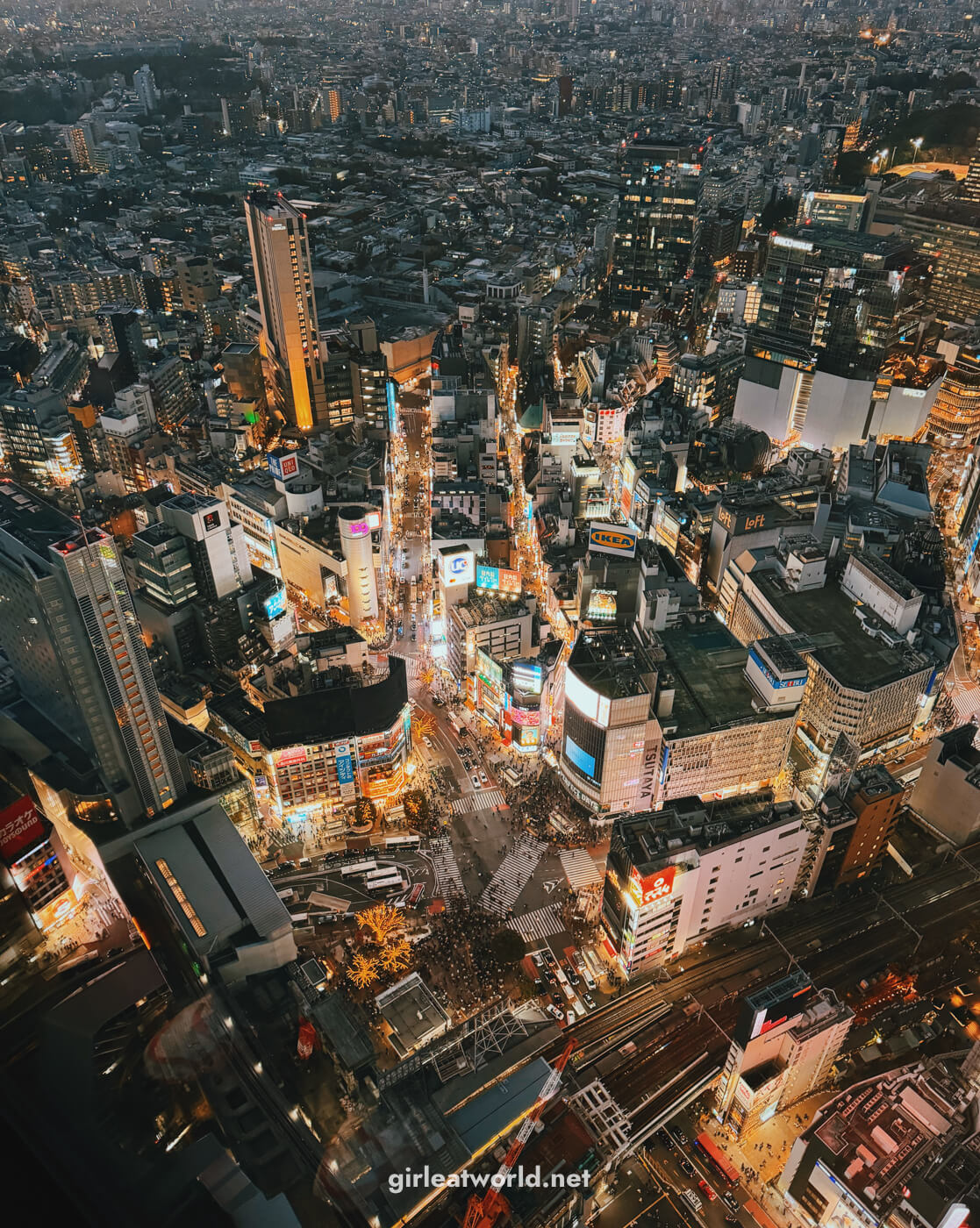
Step 6: Make the visa fee payment (if required)
Once the eVisa has been issued, you’ll receive an email. Log back into the eVisa portal and follow the instructions to make a payment, which will differ depending on your country of residence.
Step 7: Download the Visa issuance notice
When the payment has been received, you’ll be able to download your visa issuance notice from the eVisa portal again. To do this, click on the check box to the left of the visa application, and click on the “Visa Issuance Notice (pdf)” blue button at the bottom.
And that’s all! Fill out Visit Japan Web a few days before your trip, and you’re all set for your trip to Japan. You can print the pdf if you’d like, or keep a copy on your phone and be ready to display it when required.
How long does it take for the Japan eVisa to be issued?
Timing will vary depending on your situation, the volume of applications, and also perhaps what passport you hold and which country you are applying from.
From my application from Singapore in October 2023, here is the timeline from application to approval:
It took us roughly 17 days (or 12 business days) to get the eVisa issued. I was getting restless… because for 11 days, the status of the visa did not change. It was still the same “Temporarily Received” status and I was beginning to wonder if I did something wrong.
Finally, just as I was about to shoot them an email to chase, I received the request to submit an additional document. From then, it took only 5 business days to get the eVisa issued.
This is a much longer processing time than the previous procedure which only took 5 business days. But given the convenience of not having to show up physically at the Embassy of Japan, I didn’t mind it.
When should I apply for Japan eVisa?
As I have previously said, this wait time for eVisa could be longer when there is an influx of travelers to Japan. You can browse the comments in this post to see other people’s experiences when applying for their Japan eVisa.
To be safe, I would apply for the eVisa at least 1.5 months before your planned date of travel to Japan.
If you’re visiting during popular time (Sakura time, school holidays, etc) then make sure you get it done 2 months before .
What should I do if my travel date to Japan is approaching but I still don’t have the eVisa?
You can try doing the manual visa application via the Japanese embassy. The experience for this varies depending on your country of residence, so I can only speak for Singapore.
In Singapore, you’ll need an appointment to apply for the visa in person at the Japanese Embassy at Nassim Road. This appointment is highly coveted and they’re booked out months in advance. However, people do cancel last minute so I advise you to keep checking.
If you manage to get an appointment, it will take only 5 business days to get your visa approved, provided you have all the documents.
If you can’t secure an appointment at the Japanese embassy, you can try paying a travel agent to apply for your visa. I have not used them personally so I can’t vouch for them , but I have friends who have used JA Travel and they can get you a Japan visa for S$100.
… And that’s about everything I know about applying for the Japan eVisa! Please let me know if you have comments
104 Comments
- May 8, 2024
Hi everyone! My partner and I just received our e-visa today, just thought I’d leave a comment here with our process to hopefully give even more info to this already super informative and helpful blog post + comment thread! I’m an S-Pass holder and my partner a Student in NUS grad school.
We weren’t asked to provide additional documents so here’s just a few tips I saw around different forums – this post also (and applied them). It helps to have a detailed itinerary, mostly for each day of the trip I would either say ‘Visit to Ikebukuro area’ or ‘Shopping at Akihabara’ – things like that, and I included transportation between cities too. For the bank statement I know the file limit is quite insane (at least for those who choose not to upload their IRAS income tax notice), try to ask for e-statement from your bank and combine them all into 1 pdf. I did for 3 months of statement. Usually the pdf provided by your bank should be very small in size.
I’m not sure about off-peak periods but I applied exactly 2 months in advance, and received my visa after 18 working days (on the 18th day). Just a bit shy of 1 month (4 days). Definitely don’t do this thing last minute as it takes so long for the application to turn to ‘under examination’. After turning to this state tho it takes exactly 5 working days I think, counting both the day you’ll receive it and the day the status changed (it was for me and some redditors). On reddit there’s even info that if you get rejected then it’ll be within 2 days of the status change, if it passes this mark then it should be issued.
My timeline: 13th April 2024: Submitted application -> Temporarily Received 2nd May 2024: Under Examination 8th May 2024: Asked to pay Visa issuance fee + Visa Issued (within a few hours after paying the fees online)
My partner’s timeline is identical as we submit at about the same time. I would say at the beginning I was quite paranoid and was a bit doubtful of the e-visa thing, especially knowing if somehow we manage to book and appointment at the embassy it would only take 5 working days, but gladly it turns out all okay. I did manage to get an appointment at the embassy for 17th May in case my e-visa application takes too long. The key is to just visit everyday and it will release slots for the following month on a specific day (on 17th April I got the slot for 17th May, they opened some slots from beginning of May to 17th May).
That’s all for me! Sorry if it’s long haha and pls feel free to ignore if y’all knew all of this before 🙂 Thank you Melissa for the wonderful blog post + all the people who contributed to it by commenting their application process!
- July 3, 2024
Thank you this is very useful!
- April 24, 2024
Just submitted an application yesterday, for the bank statement section in particular I noticed the site only allows you to upload one file. Is it okay to upload just your past one month bank estatement? The checklist said to submit the past two months but there wasn’t an option to upload two files, realised only after I submitted that I should have merged the two months files together TT.
- April 26, 2024
Hey Claire, I never uploaded my bank statement. I’ve always used my tax document instead. If the checklist says 2 months, you might want to merge the two files and reupload the file. However, doing so might delay the application (I don’t know for sure but it seems every time you upload a new file it changes the status of the application, which makes me think it pushes the application to the back of the queue?)
- April 22, 2024
Just wondering if anyone applied the eVisa on or around 8 April 2024?
I am flying on 12 May 2024 and my eVisa status is still “temporarily received” as of today. It’d be great if anyone can share any updates to their recent applications?
Thanks a lot!
I applied on March-29th and mine changed to under examination on April -17th. No update on Visa yet, but I believe my delay was due to me uploading additional documents without them asking for it.
- May 13, 2024
Hi Devi are you able to get your visa? i also uploaded additional requirements without them asking for it.. Still my visa status not moving..
- May 6, 2024
Have you managed to get visa Japan?
- April 15, 2024
Thank you, Melissa! What an amazing work you did! 🙌
I also want to share my experience with the E-Visa application process. 🛂
The timeline is as follows: 12th April: Date of Application 13th April: Temporarily Received 14th April: Under examination 15th April: Under examination
I am planning to visit Japan by 20th April. I know I am very late with my submission. 😅 In my case, I will be in the middle of my trip. My strategy is called “Fingers crossed!” If I get the approval, I will take the flight from where am at. Let’s hope! 🤞
Hey ID, where are you applying from? that seems to matter as well.
- April 10, 2024
Hi – I also want to share my experience for the E-Visa application process.
Background: Me (SG) and my girlfriend (PH) applied visa on same date. I applied thru E-visa while she applied thru an agency in PH. Both of us have had JP visas granted previously prior to this application.
Original Departure Date: 5th April New Departure Date: 12th April (Re-booking incurs additional cost so sad)
Timeline is as follows: 17th Mar: Date of Application 18th Mar: Temporarily Received 4th Apr: Additional Documents Required (At this point, Me and my girlfriend had to re-book everything 🙁 ) 5th Apr: Under Examination 10th Apr: Still Under Examination…
Total Working Days/Total Days: 16 / 25
Notes: – Don’t apply for E-visa if you have option to go via travel agency. From what I heard, these agencies hoard the appointment in JP Embassy (though this will incur an additional cost). – If only E-visa is your option, apply at least 2 months before. The entire waiting process is such a pain. I can’t can’t even control my anxiety. – Ensure the Documents you submit are within the same month of application. This is a no brainier but happened to me. Mixed up some requirements from another visa application. Documents I submitted were dated February. – Most importantly: PLAN ALL YOU CAN IN ADVANCE! Ensure you have a backup plan. For example, for my case, I had a chance to go to JP embassy 28th Mar but I was very much trusting the process of the E-visa so I still waited for the E-visa.
PS: Please pray we get the visa on Friday.
- April 11, 2024
Hey Jun. Sorry to hear that, and thanks for your data points. I’ll be sure to apply earlier next time.
After the additional documents have been received, it should only take 5 business days to get your visa approved. I hope you’ll get it tomorrow.
12th Apr: Got my visa around 3:28pm.
Funny story, was about to rebook all flights/accommodation again to July / August then got the notification email indicating my visa is approved. Rushed home to finish packing then was able to catch my 10pm flight. Almost brought my old passport lol!
PS: Thanks again for this blog Melissa. I wish i read this a lot sooner.
Wow amazing Jun! I was thinking about you. I hope you enjoyed Japan
- April 2, 2024
Hi Melissa, thanks for sharing your experience. I am so glad that I found your post here. I’ve planned to go to Japan on 26th April and submitted my application on 21st Mar, but till today (2nd April) my status is still “temporarily received” and I’m panicking now, since my trip is coming in 3 weeks. I am so worried that I would be unable to get my Visa on time and I’m not sure if I should email them to query. Furthermore, I also realized that I submitted “hotel booking confirmation” instead of “scheduled of stay”. Do you think I still have ample time to wait or proceed to apply via agent? Thanks alot!
- April 5, 2024
My application status has finally “under examination (additional documents attached)” after I resubmitted my schedule of stay. But this was not requested by the embassy,I initiated to submit since it was “temporarily received”for almost 2 weeks. Not sure if the status changed coincidentally or it has been processed by the embassy. Does anyone has similiar experience?
- April 6, 2024
Hi ive been following your application process as I also am waiting for updates to mine. I submitted last Mar 25th and still temporarily received until now 6th Apr. I hope you continue to post and share your visa journey!
I’m not sure, but it could be related. Schedule of stay is always required, so they would have asked you for it anyway when your application gets processed.
- April 13, 2024
Hey, I did the same thing was there any update to your visa status ? Because when I going through the faqs on evisa portal they suggested we don’t upload anything new unless asked for and I am worried. It’s been 15 days and mine is still under examination
May I know, when the application was submitted and when the status changed to under examination. I have applied the e-visa on 21-Mar-2024 and the status changed to under examination on 08-Apr-2024.
May I check what’s the status of your visa now? I recently uploaded additional documents (without them asking for it) and my status is updated to “under examination (additional documents attached)”. If you could share how long does it take from there to get the visa approved, it’d be much appreciated. Thanks a lot!
I panicked and did the same thing and got worried. Did you get any updates?
Hi Alexandra,
I got an appointment in the embassy last minute 2 days ago so I decided to apply there. However, the eVisa section did get back to me on Wednesday (24 April) requesting for PR documents. I informed them that I have submitted via the embassy and would like to cancel my eVisa application.
Hi JT, ah ok. Did you manage to get the appointment via the booking system or did you call in? And any idea if the upload of additional documents cause any issue? 😅 just hoping that i’m still on track to receive the visa as i’m flying on the 17th
I managed to get the appointment via the booking system. From what I notice, you can check every morning to see if there’s available slots for the same day (I got my appointment through this method). Just be prepared to have all the documents printed. I believe that it took me 12 working days from my application (including the days where i submitted additional documents without being asked) to the point the eVisa team contacted me to get the additional documents. From thereon, I suppose 5 working days is sufficient for your eVisa to get approved.
If you manage to get the appointment to the embassy, it would take 5 working days (including the day when you submitted) to get the visa.
Hope the above helps.
- April 25, 2024
Hi Feb, wondering if you got your visa in time?
Hello Febriana, Has visa application move. We are applied almost on the same date.
- April 14, 2024
Hey , Did you manage to get your visa ?
- March 26, 2024
I’m taking my parents to Japan in May as a retirement gift for them! I applied for eVisa on 11 Mar and got an email requesting for additional docs today (26 Mar). — bank statements for 2 months with all pages included — flight info including the flights from SG to Manila and back to SG from Manila. I only included the flights to Japan from Manila. I was late to find this blog and the comments re all flights.
Hopefully I will hear from them soon and my visa will be issued. My parents applied in the Ph and took them 2 business days only! Imagine that! I guess Im just used to getting my visa in just 5 biz days here in SG when we can still apply just by going to the embassy even without an appointment. And surprised that it only took 2 biz days for my parents! 😂
Next time, Id go for multiple entry visa! The waiting is just too much for an excited traveler like me! 😂
Cheers all!
- March 22, 2024
Hi Melissa, Just want to thank you for making this vlog and the comments from here as well. This is where I often go to while I was waiting for my visa to get approved. I felt so anxious because I only applied 20 working days prior to my flight so coming here help me to feel ease. Anyway my timeline of my application.
March 3 — application submitted *was so worried if my documents are all correct* Used Bank statement x 1 month only.
March 4 – status is “Temporarily Received”
March 18 – status changed to “Under Examination” And here is when my anxiety started. My friend applied about the same time but she was asked to give more documents and was able to submit around March 19.
March 22 – Visa Issued for me 😭😭😭 I was expecting it on March 25 monday.
My flight is on March 31st.
My friend would make it on time right? Probably hers will be on Monday/Tuesday? Since we also dont have to pay, coz we’re residing in SG as well..
- March 23, 2024
Yeah it should be issued some time next week! In my experience if she was already asked to submit docs, it should be issued within 5 business days.
Btw if you’re holding PH passport it would be more beneficial to go through a visa agency. They were able to get 5 year multiple entry visa for my friends, so you don’t have to go through the same anxiety on your next trip to Japan.
- March 25, 2024
I actually might do that on my next travel.. but wow 5 year visa is great!!! Thank you very muuuuch~
hello! just curious, did your friend’s visa arrive on time?
Hiii yes it arrived March 27th as well. And we just came back from our trip~
- March 10, 2024
Hi – Can anyone let me know the email address with which you get the query for additional documents ?
- March 8, 2024
There’s always a trade-off in applying for Japan e-visa, thus the varying lengths of approval times. And it takes some amount of patience to take you through. I and my friend’s applications took 18 and 25 days respectively to get approved. But we weren’t worried because we made it sure that we’ll apply visa early, at least 1.5 to 2 months before our respective travels. So if there are take-aways in applying for a worry-free visa via the Japan e-visa route, make sure you apply early, submit correct and complete documents and bring in some patience in waiting for the results.
Totally agreed Dan, I have updated my post to manage expectations as well.
- March 19, 2024
Hi Melissa,
Would you be able to share average time for the visa to get approved via eVisa vs embassy visit (Singapore)?
eVisa : yy days Embassy submission : xx days
I don’t work at the Japan visa consular so I’m not able to share this. Previously when I used to apply via the embassy it always took 5 business days though.
- March 20, 2024
Thank you Melissa. Ofcouse, I asked based on your experience. Appreciate your inputs
I have written a section about how long it took me to get the evisa. Please take a look at the post above.
- March 5, 2024
Hi Fellow Travelers,
Let me share my experience applying e-visa for Japan. I noticed some, if not all, of the page visitors, only ask questions, but never shared their own experience of obtaining Japan e-Visa. Hence me, the Savior, instead of asking and asking and asking – worrying about my own problem, will share another experience.
Background: Indonesian Passport (non e-passport, so I need visa. Indonesian with e-passport can apply for exemption instead). Live in Singapore: Yes. I’m a Singapore PR, live and work in Singapore. Hence, I am eligible to apply Japan e-visa.
Since the inception of e-visa application by the Japan MOFA, I have applied Tourist Visa twice, and both of them are successful.
1st Application: Submitted Application: 15 September 2023. (Status: “Temporarily Received”) Got Response by embassy: 26 September 2023. They asked me to provide ADDITIONAL DOCUMENTS. (Status: “Temporarily Received”) Submitted additional documents: 27 September 2023. (Status: “Under Examination”) Asked to pay for Visa Issuance: 3 October 2023. (Status: “Fee Payment”) Visa Issued: 3 October 2023. Days Total: 20 Days (13 Working Days), including the day I submitted the Application.
From my 1st Application, through the “additional documents” request, I learnt that: 1. Schedule of Stay: when I first apply the e-Visa, I’m not sure what a “Schedule of Stay” meant. I simply uploaded my accommodation/hotel bookings, as my stupid brain thought that well, hotel is my place of stay in Japan XD. However, Schedule of Stay is a day-by-day trip detail. You can google “japan visa schedule of stay” and look for the first entry in google. 2. Flight itinerary: you HAVE TO provide the flight from Singapore, and come back to Singapore, even if you have a transit in between with different flight booking. Last year, I found that flying from Kuala Lumpur, Malaysia, would give me a cheaper air ticket roundtrip to Japan, compare to flying from Singapore directly to Japan. Therefore, I decided to book my Singapore-Malaysia trip and Malaysia-Japan trip separately, and only submit the Malaysia-Japan booking, as I thought the Immigration Officers should only concern about our entry and leaving ports and days. So I was wrong on this, and they asked me to provide the flights on leaving and entering Singapore as well.
2nd Application: Submitted Application: 5 February 2024. (Status: “Temporarily Received”) Got Response by embassy: NONE. I did not get any response back from the Embassy, then suddenly, after a long time waiting, my status changed to “Under Examination” Status Changed: 21 February 2024. (Status: “Under Examination”) Asked to pay for Visa Issuance: 28 February 2024. (Status: “Fee Payment”) Visa Issued: 29 February 2024. Days Total: 25 Days (17 Working Days, including Weekends, Chinese New Year and Japan’s National Holiday on 23rd Feb), including the day I submitted the Application.
From my 2nd Application, I learnt that: 1. Since I learnt from my mistake in the first application last year, I provided the documents more completely, including the flights itinerary and schedule of stay. Therefore, the status changed to “Under Examination” without them asking for additional documents, because my documents are totally acceptable and complete. The problem is, because they did not email for additional docs, I would not know my application status has been changed to “Under Examination” if I didn’t log-in to the e-visa website everyday :’). But I guess it’s ok. 2. This time around, I didn’t book the flight ticket before applying for e-Visa. I just screenshot the flight I intended to take, and apparently it was ok (I’m not sure if other people have done the same, but in the MOFA website FAQ, they stated purchasing air ticket is not required). 3. This time around, the application period took longer than my first applications. I guess it does make sense as more people want to travel to Japan, especially during Cherry Blossom period. There was Chinese New Year holiday (12 Feb) and Japan’s National Holiday (23 Feb) as well. 4. For the proof of income/proof of fund, I used Notice of Assessment from IRAS of the year 2023, since NoA for year 2024 has not come out yet. I understand someone commented in this page that they were asked for bank statement since they submitted NoA of 2023, but for me, they didn’t ask for my bank statement. I guess this is the example of “not everyone application is the same”.
So that’s it. Those are my 2 experiences of applying Japan e-Visa. For those asking in this page, please please please share your experience too after getting the e-Visa. For those asking “what should I do I’ve wait for some time already” yes you just need to wait. Everyone wants to travel during Cherry Blossom. Give it some time and be patient. Apply more than 1.5 months ahead of your planned travel day.
- March 6, 2024
I received my Visa now. However, I need to confirm regarding my name. In eVisa application, I input my “Given Name and Middle Name” while on the issued Visa the Given name has it’s middle names too.
example my Given Name: Anita Middle Name: Santos Surname: Mendoza
In evisa application Surname: Mendoza Given and middle names: Anita Santos
Then, on my issued visa Surname/Given Name Mendoza Anita Santos
Is the Given name part correct? Is it same as yours?
It’s the same for my visa. I think it’s correct.
This is noted and Thank you 😊
To all travellers,
I applied Feb 13 and just approved today March 6, 2024.
I only submitted NOA.
- March 7, 2024
We need to login on Japan eVisa website to show our Issued Visa right? May I know how did you have your internet? Did you roam your Singapore Sim?
Hello, I have used Starhub Prepaid Happy Roam. I’ve also purchased Japan SIM card through Klook. Both works fine. There is also wifi in the airport in Japan.
- March 4, 2024
As per evisa website,
“ Due to a system error that has occurred since 27 February, it is taking longer for the system to receive your application (your application status will remain ”application in progress”). If you are in a hurry, please contact the Japanese Overseas Establishment over your place of residence.”
I applied on the 22nd Feb and till today the status shows as “Temporarily received”. I applied it from Dubai based on what my colleague who is a Philippine Nationality received it in 8 days. I am Indian and so I guess that is what the delay is. Do you know if the Nationality really matters? The Japan consulate in Japan said there is nothing related to the nationality but I don’t trust. My flight was booked for 8th March but looks like I will have to cancel it. Also, when contacted at the Japan Consulate in Japan, the lady was rudely talking and didn’t even listen to what I had to say. Now its finger crossed and waiting.
- March 28, 2024
Hi, just curious – did you manage to get your visa before your flight?
- March 2, 2024
Just want to ask, can i opt to go directly to japan embassy to submit my documents instead of applying for evisa? Im currently working here in sg.
Thank you so much
- March 3, 2024
You can if you managed to find an appointment on their website
- February 28, 2024
Hi, it’s been 12 working days already and the status of my application still the same “temporarily received”. Do I need to follow-up already? Though my flight still far on April 15. I just don’t wanna cram. My husband applied in the Philippines since he is working there and his visa already approved. It took 4 working days only.
- March 1, 2024
It is same for me. I applied on 11 Feb , Still “temporary received ” status. Let me know if u have any update
Do you have any update on your application? My status change to Under examination last Feb 29. No update yet.
Just be patient. That’s all you can do.
- February 23, 2024
Hi Marianne,
How’s your evisa application? I haven’t receive any email yet. I applied last Feb 13, 2024. I’m planning to send follow-up next week.
- February 19, 2024
I’m currently on my 11th day anxiously waiting for my eVisa to change status, it’s currently stuck at “Temporarily received”.
You mentioned that you’re very close to sending them an email, may I know the email address that you’re about to write to?
Thank you, E
Hey E, if i recall correctly they have an email at the application website. were you able to find it there?
Thanks for responding, Melissa. Yes, I have that email address from the website. Just wondering in case you have a different one so I could add as well.
- February 15, 2024
Can I just submit Income Tax Notice of Assessment for Japan evisa? Or need to submit bank statement too? I applied and submitted just the Tax Notice of Assessment from IRAS.
It’s either or, so you can submit just one
It won’t affect my application right? I mean if it will be approved or rejected?
Thank you Melissa.
No. I have always only submitted NoA and have never been rejected
Noted on this Melissa. Thank you.
- February 16, 2024
same thing happened to me. i submitted online jan 31. only today 16/2/24 i received an email that they need additional documents again. another updated cert of employment , another updated bank transaction or iras assessment 2023/2024 . the problem is 2024 iras assessment havent come up yet. its only for the year 2023 only. few days left only and its not a guarantee as they will still need to examine the new documents that il be submitting asap and my flight is on the 24/2
- February 12, 2024
Hi Melissa, I applied for e-visa on 03.02.2024 and still the status is showing “Under Examination” and I have not received any other emails asking for any additional documents. Please advise what I can or what I should do. Thank you.
- February 13, 2024
Hey Jen. Unfortunately there isn’t much to do but wait. If you can secure an appointment at the embassy, they might be faster to process your visa. Good luck!
- February 9, 2024
Hi! I submitted my application on Feb. 6th, and have included all information with an itinerary that shows my hotel accommodation’s plus the hotel’s contact info. What I did not include is the confirmation of the hotel – is this needed?
Hey levi, I did not submit confirmation of hotel.
- February 8, 2024
Hello! I recently applied my eVISA and got the status update to “Temporarily Received” on 31st Jan. I’m holding a Burmese passport, and there no more appointment bookings available for this month. My flight is on the night of 29 February. Do you think the visa will make it in time? I’m so anxious… I should’ve just gone down to the embassy since the start TT_TT
With the trip coming up so soon, i would just go to the embassy. If you see my timeline above it does take some time to process the e-visa
I see. I calculated and the earliest I would get a reply would be on the 19th. The embassy doesn’t allow walk ins. Should I still try showing up at the embassy regardless?
Definitely don’t show up without appointment. Are you living in Singapore? I recommend checking everyday to see if they have appointment. I heard people cancel last minute. Also be ready with the required documents.
Yes, I’m in Singapore. I’ve sent them an email asking if they could give me an estimate of how long more they would take, hopefully on Tuesday they can give me an answer! Thank you again :’)
If you’re desperate, you can try using JA travel . I am not endorsing them since I’ve never used them, but a few of my friends did. I think they charge $100 to get Japan visa.
- February 27, 2024
Did you get the visa yet ? I am travelling on 24th March and have applied my visa on 9th feb and still its under “Temporarily received” status and now I am getting anxious. I am indian passport holder staying in singapore.
What’s the status of your application, did you get approval yet?
I’m in a similar situation, my travel time is also around the same 23rd March. I applied eVisa (Family Visa – Indian passport staying in Singapore) on 1st March and it’s still showing as “Temporarily received” status.
I’ve been exploring different options, and one of the travel agencies I contacted, Ja, has mentioned a possibility of obtaining the visa within 7 working days also the cheapest. So I’m thinking to take this route.
- February 7, 2024
Hi Mellisa!
We’re planning to go on April from UAE. Is it required to book a hotel for visa application? Or Hotel details and contact info is enough? What we’re doing is we made an itinerary with flight info. I’ve checked in the official website and it says they only required “flight itinerary. Is it the same with dummy ticket?
Hey Elgine, I didn’t have to show a hotel booking, but I have yet to apply a visa to Japan without booking flight tickets first. Maybe a dummy ticket would work, but I have not tried that myself.
- January 30, 2024
Hi Melissa, thanks for the insightful post! I’m applying for the e-visa and it’s missing some information so I withdrew it to submit again. After I withdrew, the status turned to “Withdrawal request in progress” and I can’t submit another application. Have you experienced this and if you know how long would it take to back to normal (being able to re-submit)?
In this case, would you recommend just going to the Japan office and apply in person instead? Thank you!
- January 31, 2024
Hey Tran, if you’re able to go to the embassy then I would do that. It’s the same thing. I submitted online since the appointment to go to the embassy was always full in Singapore.
- January 29, 2024
Hi Melissa, I’ve applied for the evisa online on 14th Jan and today the status still shows “Temporarily Received” so I’m getting kinda worried. Actually on the 30th Jan tomorrow I have an appointment slot at the Embassy that was previously booked and I’m wondering if I should go down to apply there in person? Or should I just wait it out a bit more?
Are you applying from Singapore? and when is your intended date of visit to Japan? I agree it has been quite awhile so if I were you I would just go to the embassy and then if the embassy accepts the application, I would cancel the online application when I am back home (I think there is an option to withdraw if i’m not wrong).
Actually I went to the embassy today and just submitted my application as usual and I got accepted! I’ll have to go back to collect my passport in a few days. I guess I’ll just have to withdraw my online application like u said
Can I ask how much time it took for you to get Visa?
- January 16, 2024
Hey Melissa, Thanks for your post. Can i check whether did you have to mail in your physical passport and other documents to Japan embassy as well for the short-term e-visa? If you are applying it from Singapore.
Hey Kelvin, I did not have to send the passport or anything. There will not be any visa pasted to your passport either. They will give you a PDF which you can print out instead. However when you get thru immigration you’ll still get the immigration stamp.
- January 1, 2024
Hi Melissa! I’ll be applying for Japan evisa this week, may I know why your itinerary is not detailed enough? May you share the itinerary that was not detailed enough for the embassy? Thanks! This article was very helpful!
- January 2, 2024
It was my fault, I literally just put the date i am arriving and leaving Japan, and I was going to be there for 2 months. I didn’t have a set plan yet at that time. So in the end I put all my tentative plans and they were okay with it.
- December 16, 2023
Why are some people getting it faster than others?
- December 17, 2023
I have no idea, to be honest
- December 7, 2023
May i ask for your nationality?
I’ve applied on the 2nd of december for my wife, who’s a vietnamese residing in singapore. It’s been about a week now with the status as “temporarily received” still. Getting anxious. Scheduled flight’s on the 20th of Jan…
Hey Marc, I posted the timeline. It was “temporarily received” for 11 days for my family (Ukraine passport) so i think you have another week or so until the visa is approved
- December 6, 2023
Hihi, so based on the timeline above, on the 24th was your Visa issued or you were informed to make payment? Osrry, getting bit confused here. Also, don’t mind sharing which nationality was your family’s passport?
No, the visa was essentially approved on Oct 19th when they have accepted the additional document. They did not inform me to make a payment since I don’t need to. They just told me “we have received your documents with thanks. It takes at least 5 working days to process your eVISA application from NOW.”
From then, it took another 5 days for the visa to be issued (Oct 24)
If they are asking you for payment, I think it means the visa has been approved and you just need to wait another 5 days after the payment has been accepted.
- December 5, 2023
Hi, May I know from the time you were told to make payment to making payment and finally getting your eVisa, how long did it take? Was the eVisa issued immediately right after payment? How did you make payment? Online or at the Embassy? Thanx loads
Hey MoMi. It was free for us (there are different fee per citizenship). Once you are told the visa application has been accepted, it should take around 5 business days.
- November 28, 2023
Hello sir, I applied evisa. Is it should be 2mb only the size of the files, example for my bank statement and COe, bank certificate i merged it all.
I applied 4times now because always cancelled. Is it okay to re apply again even 3 times cancelled?
Hi! How did you merge it?
- October 31, 2023
Singaporean here, I visited Japan in May and July 2023 and do not need a visa. Is there such a requirement?
Hi Mich, there is no change to the visa requirement. This is merely a new way to apply for a Japan visa! As a Singaporean, you still do not need a visa to enter Japan.
PS: I am curious how you found this post? I have literally just posted it less than an hour ago!
Thought you’re a Singaporean, so panicked when I saw you applingy for a visa. My next trip to Japan is next week.
Anyways, I subscribed to your RSS feeds. Any updates will auto pop up.
- November 1, 2023
I see! I had forgotten about the RSS feed. Yes I am Singaporean and do not need a visa, but was applying for a family member who is not a Singapore passport holder. I’ve added the clarification to my post.
Leave a Reply Cancel reply
Your email address will not be published. Required fields are marked *
Save my name, email, and website in this browser for the next time I comment.
This site uses Akismet to reduce spam. Learn how your comment data is processed .

- Visa Application Helpline
Subscribe to our newsletter
Learn how to live a sustainable long-term travel lifestyle.
By signing up, you agree to the our terms and our Privacy Policy agreement.
Top 27 Places to visit in Darjeeling, Explore the Beautiful Hills of Darjeeling
Top 10 things to do when traveling to shimla: shimla travel guide, the ultimate paris travel guidelines for first timers | top attractions & things to do.

The best way to get a Japan Tourist Visa: Step-by-Step Guide with Japan travel advice
Japan is a gorgeous and wonderful country full of incredible places of interest for tourists from all over the world. If you also desire to visit Japan , then you need to have a valid Japan tourist visa. The Japanese government has structured many different types of Japan tourist visas for various purposes and time periods, and you can decide which one you would need to apply for accordingly.
Although, you don’t need a Japan tourist visa if your country is on the list of 60 countries that get visa-exempt for tourism or business. But if you are from a country that does need a visa, you have to consult the consulate for the visa application process or visit a Japanese Embassy.
Here is everything that you need to know about Japan Tourist Visa Requirements and how to apply for, so that you can be well-prepared for your visa application and know what you are going to be dealing with.
For expert assistance with your visa application, don’t hesitate to reach out to our visa application helpline . Our team of professionals is here to help guide you through the process and answer any questions you may have.
WHAT IS COVERED IN THIS ARTICLE?
Application Process for Japan Tourist Visa
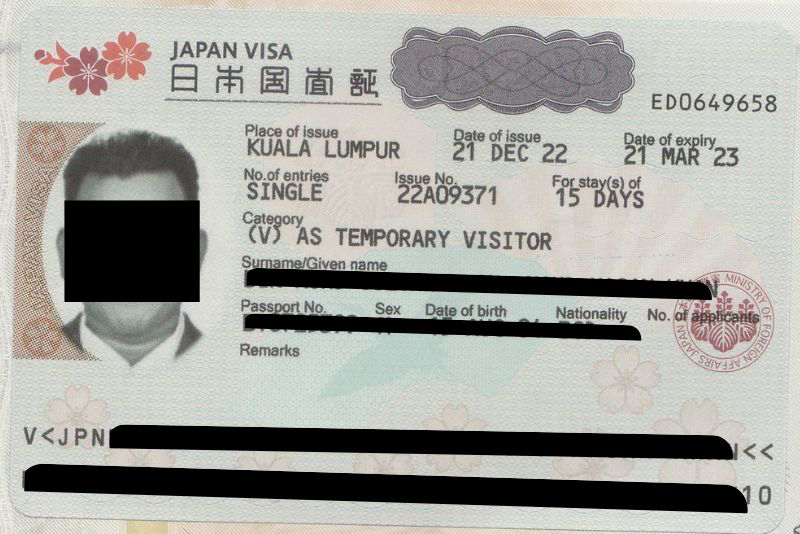
Step 1: Determine Whether You Need to Apply for Japan Tourist Visa or not.
Prior to travelling to Japan, you have to obtain a tourist Visa if you are from a nationality that is excluded from this requirement. Some of them are the United States, Singapore , Argentina, Australia , Canada, Malaysia and most European countries and their citizens don’t need to obtain a tourist visa to travel to Japan.
If you are from one of these counties, then you get to stay a maximum of 90 days visa-free in Japan on a Temporary Visitor status. It is valid for a single-entry stay for the purposes like visiting tourist attractions , sightseeing, attending conferences or courses of visiting friends.
You can also apply for a double-entry visa within 6 months for 2 short trips, but you must understand that you cannot engage in paid employment in Japan on a tourist visa.
Who can visit Japan without visa?
The following lists include the names of the nationalities who don’t require a visa to enter for a short–term stay. If the name of your country is not among these, then you know that you need to look into a visa application.
Step 2: Determine the Types of Japan Visa You need to apply for
There are a number of different types of Japanese visas which include an eVisa. Japanese Embassies and Consulates are the ones that provide and approve the visas and the application process for eVisa can be done online.
There are mainly three categories into which Japanese visas can be grouped.
- Family Related Visas
- Working visa
- Non-working visa
Since we are talking about tourist visas here, the focus of this article is going to be on short-term stay visas.
Within the Category of Short-term ‘Tourist’ Visa, there are four different types you can apply for. Depending on the kind of visa you are applying for, you get to enjoy different privileges and validity.
- Single-entry Visas: it is valid for 3 months upon the issue and it is not possible to extend their validity.
- Double-entry Visas: it is valid for 6 months upon the issue.
- Multiple-entry Visas: it is valid for 1 to 5 years but will depend upon the purpose of your visit as well as your nationality and the passport you hold. You get to enter Japan multiple times with this visa but your stay cannot exceed the 30 or 90-day period.
Step 3: Prepare the required documents for your application.
During your submission of the application, you will need to submit a set of legally certified documents too. You will also need to meet a few eligibility criteria which are crucial to receiving approval for your application.
Japan visa requirements
To apply for a Japan tourist visa successfully, here is a list of visa requirements that you need to meet.
- Fill Application form Clearly and Correctly: You need to fill out the visa application form completely and carefully without any mistakes. It is a very strict requirement because even the tiniest error/mistake can potentially result in the rejection of our visa application.
- Passport: You need to have a passport that has at least 6 months of validity and two blank pages.
- Photograph: You need to provide a good-coloured photograph of yourself that has been clicked recently ( within the last six months) and not too long ago. This photo should be clicked solely for this application and not be used in any other place. Your photo should be passport-size (45mm × 45mm or 2in × 2in) and of good quality. Check Japan visa photo requirements here .
- Certificate of Eligibility (CoE): Some places, you need to obtain a Certificate of Eligibility which is a must requirement for all non-residents of Japan to obtain. If you are applying without a sponsor, then it is important that you apply for it as soon as possible. Note: Certificate of Eligibility only require for study and work in Japan and not for tourist visa. Here is a link for how to get CoE
- Birth Certificate: Sometimes you are also asked for a certified copy of your birth certificate, and you should have it handy just in case. This is mostly asked in Japan embassy in Philippines.
- Tax Return: Another thing you need to submit is your tax return. But this also not a compulsory one.
- Proof Of Financial Ability: You should be able to provide proof of financial ability so that it can be proved that you will be able to provide for yourself financially while you stay in Japan. Normally 3 to 6 months bank statement.
- Certificate Of Financial Situation: You also need to provide a certificate of your financial situation for 6 months prior to submission of the application that is issued by your bank.
- Marriage Certificate: If you are married and your marriage certificate was issued within the last year then, you need to submit a marriage certificate too.
- Travel Plans And Reservations: You also need to provide a schedule and travel plans for the trip with your application. Such include reservation of the hotel you are planning on staying at, your itinerary and flight reservation details. You don’t have to book a flight ticket, that is not the requirement but having a flight reservation is what’s crucial here.
Requirements for tourist visa in Japan with guarantor
If you’re planning to visit Japan and have a guarantor, there are certain requirements you need to fulfil to obtain a tourist visa. Firstly, if your guarantor is Japanese, you’ll need an invitation letter from them along with additional documents as instructed by the embassy.
Additionally, you’ll need to provide proof of your relationship with the guarantor, such as your birth certificate or marriage certificate. Meeting these requirements will help ensure a smooth visa application process.
Step 4: How to Fill Out the Japan Visa Application as a Tourist
- You can fill out the Japan visa application form both digitally as well as by hand. If you are filling this form by hand, make sure you use a black ballpoint pen and use a block letter. Don’t use erasable pens or pencils.
- If a field doesn’t apply to you, fill in “nil”, “none” or “N/A”. and don’t leave it blank.
- Print your application form on an A-4 size sheet because other page sizes are not accepted.
- Avoid cuttings in your form. If it cannot be helped, use double lines to cross it. If there are too many cuttings and crossings, start over with another form.
Here is a sample of a properly filled Japan visa application form correctly. The number indicates the part which you might need guidance for:
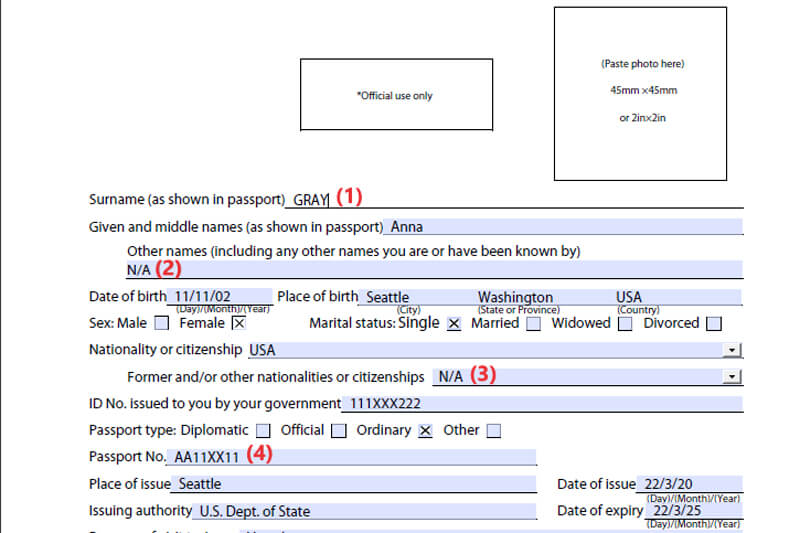
- Your surname must be in capital letters. Fill in your name here the same as it is on your passport. Don’t use initials like ‘Mr’ or ‘Dr’.
- If you have another name you are known by, for example, a pen name or nickname, write it here. In case, your name uses initials on your passport, write your full name here. Write N/A if none.
- If you have immigrated and got citizenship in another country, write down your current nationality. If not, fill out N/A.
- Please be very careful while filling in your passport number. Double-check it and make sure it is correct.
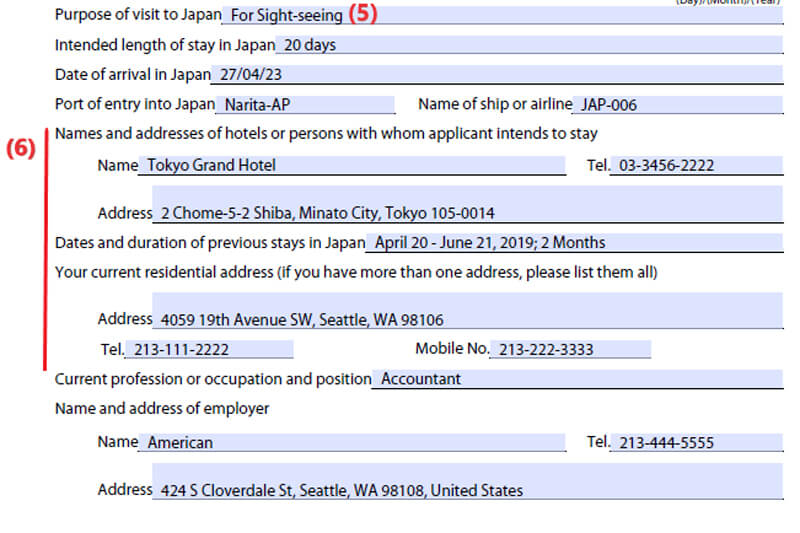
- In this field, you must fill out a specific purpose like for Relatives visit, for Business, or for Sight-seeing. Don’t write only single words like Work, Travel, Visit etc.
- If you are going to stay in a hotel, fill out the required details here. If you don’t know the address or telephone number of your hotel, look it up on google. If you are going to stay with a friend or family, write down their name, address and phone number.

- If you are single and of legal age, fill out N/A. If you are a minor, fill in the occupation/profession of parents. If you are married, fill in the occupation/profession of your partner.
- As a tourist who is bearing all the expenses, you can fill out N/A in all the fields here. In case you do have a guarantor, fill out the required details carefully.
- If your guarantor and the Inviter are the same people, write ‘same as above’ in the fields here.

- If you filled in any of these questions’ yes’, fill out relevant details in the text box provided. If your answers are ‘no’ to all of these questions, fill in N/A in the box.
- Write the date of the day you are submitting your visa application.
- If the applicant is a minor then one of the parents or legal guardians can sign here and write down the relation to the applicant also.
You can download the Japan Visa application here.
Step 5: Book an Appointment at Embassy or Consulate and Submit Your Documents
How to submit your visa application.
The entire process of submitting your short-term tourist visa consists of three main steps. The Japanese visas are provided only by the Japanese Embassy or the consulates abroad for the time being, and during this process, the following things are involved:
1. Find and Contact to Japanese Consulate or Embassy near to you
The first step is to find and contact a Consulate or a Japanese Embassy nearest to you. Contact them to enquire about the opening and closing hours as well as book an appointment. You can also communicate with them via email and correspond with them online. They give you five days, and you have to pick a date out of those days to book an appointment.
2. Submitting documents and going to Embassy or Consulate
Next, you have to submit the required documents along with your Japan visa application. Something that you must prioritise here is that you arrive for your appointment on time. In Japan and for its people, Punctuality is very important. That’s why you should try to reach the Embassy or consulate for your appointment five to fifteen minutes earlier rather than be late.
When you reach for your appointment, you are provided with a token/number, and when your number is called, you meet with the official in charge of your application for an interview. During the application process, officials typically do not ask many questions but instead focus on verifying that all required documents are present.
If any documents are missing or additional information is needed, officials will inform you on the spot. To avoid any issues, it is recommended to double-check all documents before leaving for your appointment.
3. Finally collect your passport and your visa
Then finally, after a few days, which is usually 5 to 7 days, you get an email regarding your application status. In this email, you are asked to pick up your passport and, if approved, to collect your visa too!
Frequently Asked Questions (FAQs)
How long is the application examination period.
The Standard processing time for your visa application is five working days. But for a number of reasons, this time can extend into weeks and even months. That’s why it is recommended to submit your application as early as you can.
How Much Does a Japanese Tourist Visa Cost?
When you apply for a Japanese visa, you are also required to pay a certain amount as a visa issuance fee. This amount of visa fee varies depending on whether you are applying for a single-entry visa or multiple-entry visa and your nationality.
- For Single-Entry Visa: 3,000 yen
- For Double-Entry Or Multiple-Entry Visa: 6,000 yen
- For Transit Visa: 700 yen
Note: Sometimes, you may be required to pay a different amount or not pay any fee at all, and this depends on your nationality and the purpose of your visit. Also, if you are not issued a visa, you don’t need to pay any fee.
It is recommended that you consult with the consulate or the Japanese Embassy you are working with to find out the fee you need to pay because the amount of such fee is subject to change at any time.
If you are consulting a travel agency (Japanese Embassy/Consulate General approved) for your visa application, you will be required to pay processing fees along with the visa issuance fees.
Another thing you need to keep in mind is that the fee is taken in the local currency where your Japanese Embassy or consulate is located. It is to be paid at the time of submission of your application. When done with it, you will get proof of payment as well.
Japan tourist visa for green card holders
If you are a green card holder and wish to visit Japan as a tourist, you may need to apply for a tourist visa before your travel. However, the requirements and process may vary depending on your circumstances and nationalities. Generally, green card holders may need to provide the same documents when applying for a Japanese tourist visa as non-green card holders.
Can a U.S. Green card holder travel to Japan without visa?
No, U.S. Green Card holders are not exempt from obtaining a tourist visa to travel to Japan. They must apply for a Japan tourist visa in their home country or current residence.
What is a Japan Tourist eVisa?
Launched in August 2022, Japan Tourist eVisa is the new program of the Japanese government to meet their goal of reaching 60 million foreign visitors a year by 2030. It is available for US citizens and Canadians, but these nationalities can travel to Japan visa-free again. The Japanese government is working on adding more nationalities to this list soon in the future.
The benefit of this eVisa is that it has simplified the visa application process. You get to finish the form online straightforwardly, and there is no need to visit an embassy or consulate for the completion of the application. All you need is to make the necessary payment via debit or credit card while submitting the application. After all submissions and approval, your visa will be emailed as soon as it is done.
Why was your application rejected?
Your application could have been rejected due to not meeting the criteria for Visa issuance. Some of these are often errors or omissions in the submission documents.
Why are you not informed about the reason for the Visa rejection?
You will not be provided with the exact reason for rejection by anybody because that information cannot become public due to safety purposes . So, if your visa is rejected, you have to restart with a new application and pay the fee again.
What should I do to get a Certificate of Eligibility?
To obtain COE, you need your proxy inside Japan to get a consultation with the Regional Immigration Bureau nearest to them.
Why can’t I reapply immediately after my visa application was rejected?
You cannot reapply your visa application after at least six months because the circumstances for which your application has been rejected wouldn’t have changed, and it would be a waste of resources and time for everybody. But after six months, your circumstances could change, and you get a chance to make your application a better candidate for approval!
What should be your bank balance for a Japan visa?
There is no explicit amount that needs to be in your bank account when applying for a Japan tourist visa. All you need is to provide proof of sufficient funds that indicates that you will be able to support your travel and stay in Japan.
What are the Covid requirements to travel to Japan?
Every person entering Japan after October 11, 2022, needs to provide a vaccination certificate or a negative Covid test certificate that was taken within 72 hours of leaving the country. Fully vaccinated passengers don’t need a pre-travel COVID-19 test.
If you are entering Japan from a country that is evaluated as having a high-risk inflow of COVID-19, then you will be required to stay at a facility secured by the Quarantine Station for at least 3 days. After 3 days, a COVID-19 test will be taken, and if the results come back negative, you can leave the facility but still need to spend another 7 days in self-quarantine. Please see some links useful
Is Japan allowing tourist visa now?
As of October 2022, Japan has opened its borders to tourists and has begun issuing tourist visas. This is exciting news for travellers eagerly awaiting the opportunity to explore Japan’s rich culture and beautiful landscapes.
How do I get a tourist visa for Japan?
To apply for a Japan tourist visa, you will need to submit a completed visa application form, a valid passport, a recent passport photo, proof of financial stability, and a detailed itinerary of your trip. You may also need to provide additional documents depending on your specific situation. Please follow the steps above
Is Japan visa free for US citizens?
Yes. For U.S. passport holders planning a short-term visit to Japan, a visa is not required. This applies to visits lasting up to three months.
How much money do I need to show for Japan tourist visa?
According to the Japanese Embassy, there is no set amount of money that you need to show for a tourist visa. However, you must provide proof of sufficient funds to cover your travel expenses, such as airfare, accommodations, and daily expenses. Having at least $2,000 USD in your bank account is recommended.
Important Note
You have to understand and keep this fact in mind that no matter how good your application is, there is always a possibility that your application might get rejected. No one can guarantee the approval of your application, whether it’s a lawyer or a travel agent or anybody else you are taking guidance from. If somebody is promising you this, then they are seriously lacking or a fraud. You can definitely make improvements to your application because it definitely increases your chances of receiving approval.
Japan is a great country, and I think everyone should get a chance to visit this incredible country. For this purpose, however, you might need to obtain a visa unless your country falls on the list of visa-exempt countries of Japan.
Visa Application needs to be filled out clearly, and carefully and you need to prepare all the required documents that need to be prepared prior to submission of your application, so your application process can run smoothly, and you have a better chance at getting approval for a visa!
If you liked reading this article, then you should check out our other travel guide articles . If there is something that you would like to add or share about your visa application journey, do leave a comment. We would love to hear about it!
Related Posts
Step-by-step guide to obtaining a south korea tourist visa, ultimate guide to new zealand tourist visa application: a step-by-step guide, the ultimate guide to the best time to travel to japan, us tourist visa how to apply: the us visitor visa guide.
Save my name, email, and website in this browser for the next time I comment.
This site uses Akismet to reduce spam. Learn how your comment data is processed .
Type above and press Enter to search. Press Esc to cancel.
- Itineraries
- Tours and Activities
- Travel Guides
- Best of Japan
JRailPass.com » Japan Travel Blog » Japan Visa
Do I need a Visa for Japan? Japan Visa Policy
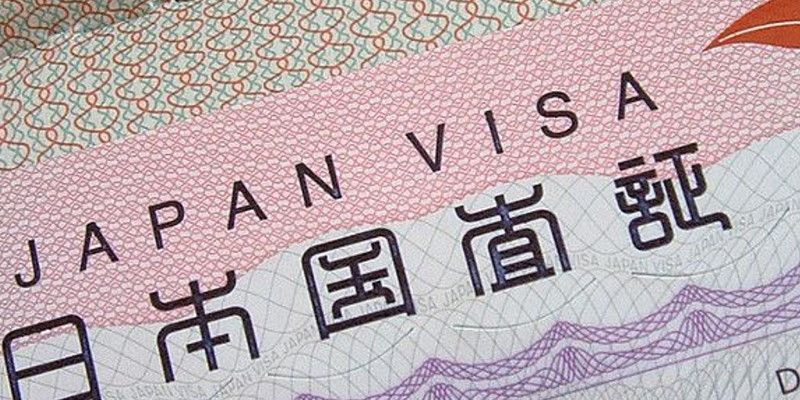
There are a number of different types of Japanese visas which are designed by the Japanese government for different purposes and lengths of time.
There are over 60 countries whose citizens can enter visa-free for tourism or business. Other nationalities currently need to go to a Japanese embassy or consulate to apply for a visa.
Japan introduced an eVisa for citizens of the US and Canada in 2022 that simplified the application process to acquire a Japan visa during pandemic visa suspensions.
Canadians and Americans no longer need a visa for Japan for short stays, but the eVisa is expected to launch for other visa-required nationalities in the near future.
Japan visa types
There are several types of visas for Japan and more will be introduced in the future, including the eVisa.
Visas are obtained directly from Japanese embassies and consulates, although the application process for the eVisa will be completed entirely online.
Japanese visas can be grouped in 3 main categories :
Working visa
Non-working visa.
- Family Related Visas
Working visas are considered long-term stay visas and cover the kind of work that requires high-level professional knowledge or skills and ‘thus, they do not include simple labor tasks. Jobs like waiter, construction workers, sales people, etc. cannot obtain a working visa. Typical working visas:
- Engineer, Specialist in Humanities, International Services Engineer. Engineers and Specialists in Humanities must have a university degree in their corresponding fields or 10 years of professional experience. International Services Engineers must have 3 years of professional experience in their field.
- Intra-company Transferee. This status applies to expats of foreign companies or the subsidiary companies of Japanese firms located overseas who have worked more than one year in the said office in overseas.
- Skilled Labor. Jobs involving foreign cooking, architecture, or civil engineering characteristic to foreign countries, training animals, instructing sports, sommeliers, processing precious stones will fall into this status. It’s mandatory to have at least 3 years of professional experience in the field.
- Business Manager. Those who are going to start a business or invest into a business in Japan. It also applies to those managing business on behalf of investors.
- Highly-Skilled Professional. This visa aims to attract workers who are likely to contribute to the Japanese economy.
Those with a certain status, knowledge, or skills can get the following working visas:
- Diplomats or Officials, Personnel of the embassies and consular offices, Diplomatic missions, Government personnel and their families.
- Research and education at university or equivalent educational institutions.
- Instruction of foreign languages or other education at elementary schools, high schools, etc. Those instructors looking to work in private language schools must apply for the Specialist in Humanities / International Services visa.
- For those whose artistic activities provide enough income to support their living in Japan.
- Religious activities. Missionaries sent to Japan from foreign religious organizations.
- Those journalists who have signed contracts with foreign media organizations. It includes freelance journalists.
- Legal and Accounting services.
- Medical Services. Medical specialists with Japanese qualifications.
- For those researchers working under a contract with public or private organizations in Japan.
- All of those working in show business and sports.
Anyone who holds a non-working visa is allowed to work as long as the immigration office grants them permission. This type of visas is considered a short-term stay visa and some restrictions apply. Those doing some work under a non-working visa cannot exceed the number of authorized hours per week.
Who can benefit:
- The visa application is submitted through the school.
- Those training to acquire technology, skills or knowledge. This status is granted only when the candidate will work in a job requiring that technology, skills or knowledge once he returns to his home country.
- Technical Internships. That covers internships after training under trainee visa.
- Spouses or children of people staying in Japan under the work visa and non-working visa (except for temporary visitors and trainees).
- Cultural Activities. Cultural or artistic activities with no income.
- Students or researchers of Japanese cultural or artistic activities.
- University students taking part in an internship without remuneration.
- Temporary Visitors (also known as Tourist visa ). This status includes visitors on vacation, sports, family visits, participants in seminars and conferences, business meetings, market research, and those traveling to Japan to engage in PR activities.
There is also another epigraphe for non-working visas that is granted case by case: Designated Activities. Students on internship, working holidays, diplomats’ housekeepers are some of the people who can apply for this visa.
Family related visas
Family related visas are considered short-term stay visas and have no retrictions when it comes to employment, so you can engage in more than one activity or change jobs. Those who can apply to these visas are:
- Spouses and children of Japanese nationals
- Long Term Residents
- Permanent Residents
- Spouses and children of Permanent Resident
Japan tourist visa
Any tourist wanting to visit Japan must obtain a tourist visa prior to entering the country. Nonetheless, Japan excludes several nationalities from having to comply with this requirement.
For instance, citizens from most European countries, United States, Australia, and Argentina do not need to get the Japan Tourist Visa since they are considered visa-exempt countries for tourism purposes. Nationals from any of those regions can stay in Japan for a maximum of 90 days visa-free and are assigned Temporary Visitor status.
Japan tourist visa is a short-term stay visa for the purposes of sightseeing, visiting friends, or attending conferences or courses . A tourist visa is normally valid for a single-entry stay of up to 90 days.
Tourists can also apply for a double-entry visa for 2 short trips within a 6-month period. It is important to note that the Japan tourist visa does not allow travelers to engage in paid work while in the country.
Other short-term stay visas
- Business visa: There is a temporary business visa for stays of up to 90 days which can single or double-entry visa (if both trips are within a 6-month period). Business purposes include conferences, meetings, signing contracts, and market surveys.
- Transit visa: Some nationalities need a transit visa to stop over in Japan when going to an onward destination. Many travelers do not need this as long as they stay within the allocated zone and do not leave the airport.
Which countries need a tourist visa?
All nationalities who are not visa-exempt need a visa to enter Japan. Citizens of certain countries can enter with Temporary Visitor status for limited periods of time ( 15 to 90 consecutive days ) for tourism or business purposes.
Visitors receive a stamp in their passport which is a requirement for the Japan Rail Pass . The rules are very strict and it is not possible to get the pass without showing the stamp (tourists with other types of visas are not eligible for the Pass).
The following nationalities are eligible for Temporary Visitor status (all others need a visa to enter):
The nationalities listed above can enter for tourism , visiting relatives, and business purposes. However, visitors cannot be paid for work under Temporary Visitor status. In these cases, it is necessary to obtain a work visa .
Citizens of the following countries will need a Japan tourist visa in order to enter Japan:
- Philippines
- CIS countries and Georgia
Book your Japan Rail Pass now
Japan tourist visa requirements
To successfully apply for a tourist visa for Japan, applicants must meet the following visa requirements :
- Hold a valid passport with at least 6 months remaining and 2 blank pages
- A completed visa application form
- Provide a recent color passport photo and a certified copy of your birth certificate
- If married, submit a marriage certificate (if issued within the last year)
- You must have the intention to leave Japan at the end of your authorized stay
- Proof of financial ability demonstrating you can support yourself financially during your stay in Japan
- Provide a certificate of your financial situation for the previous 6 months issued by your bank
- Submit the applicant’s tax return
- If applying without a sponsor, a copy of your Certificate of Employment must be submitted
- Provide a schedule and travel plans for the trip
If you still have questions about what you need in order to obtain the Japan tourist visa, you can find out more by checking the Japan entry requirements FAQ.
Japan tourist visa validity
Single-entry visas are valid for 3 months upon issue and usually allow you to stay in the country for up to 90 days. It is not possible to extend its validity.
Double-entry visas have a validity of 6 months from the date of issue.
Multiple-entry visas are usually good for a period of 1 to 5 years, depending on the visitor’s nationality, the purpose of the visit, and the type of passport they hold. Multiple-entry visas allow you to visit Japan multiple times within this period of 1 to 5 years since the issuing date, but each stay cannot exceed the 15 or 30-day period.
Japan tourist visa fees
A fee must be paid in order to obtain your Japan tourist visa. These fees vary depending on whether you are applying for a single-entry visa, a double-entry or a multiple-entry visa, as well as on the nationality of the tourist.
It is a good idea to check with your Japanese embassy or consulate before submitting your application since fees are subject to change at any time. Also, please note fees are collected in the local currency where the embassy or consulate is located and must be paid at the time of submitting your application. Once that has been done, you will receive proof of payment.
Japan Tourist eVisa
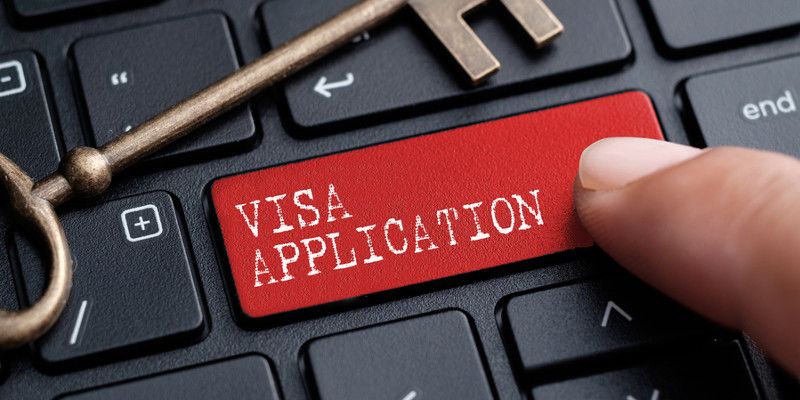
A Japan Tourist eVisa launched in August 2022 as part of the government’s wider plan to reach 60 million foreign visitors a year by 2030.
The eVisa for Japan was available for Canadians and US citizens, but these nationalities are now once again able to enter Japan visa-free. However, it may it is expected to launch for other nationalities in the future.
The online application form will be straightforward to complete and means that tourists do not need to go to an embassy or consulate to complete the application. It has been designed to simplify the visa application process.
It will be necessary to make a payment by credit or debit card to submit the application. Once an application has been submitted and approved , the eVisa approval notice will be sent to applicants by email.
More information: https://www.mofa.go.jp/j_info/visit/visa/index.html
Related Tours & Activities

Select Your Language
Select your currency.
- AED United Arab Emirates Dirham
- AFN Afghan Afghani
- ALL Albanian Lek
- AMD Armenian Dram
- ANG Netherlands Antillean Guilder
- AOA Angolan Kwanza
- ARS Argentine Peso
- AUD Australian Dollar
- AWG Aruban Florin
- AZN Azerbaijani Manat
- BAM Bosnia-Herzegovina Convertible Mark
- BBD Barbadian Dollar
- BDT Bangladeshi Taka
- BGN Bulgarian Lev
- BIF Burundian Franc
- BMD Bermudan Dollar
- BND Brunei Dollar
- BOB Bolivian Boliviano
- BRL Brazilian Real
- BSD Bahamian Dollar
- BWP Botswanan Pula
- BZD Belize Dollar
- CAD Canadian Dollar
- CDF Congolese Franc
- CHF Swiss Franc
- CLP Chilean Peso
- CNY Chinese Yuan
- COP Colombian Peso
- CRC Costa Rican Colón
- CVE Cape Verdean Escudo
- CZK Czech Republic Koruna
- DJF Djiboutian Franc
- DKK Danish Krone
- DOP Dominican Peso
- DZD Algerian Dinar
- EGP Egyptian Pound
- ETB Ethiopian Birr
- FJD Fijian Dollar
- FKP Falkland Islands Pound
- GBP British Pound Sterling
- GEL Georgian Lari
- GIP Gibraltar Pound
- GMD Gambian Dalasi
- GNF Guinean Franc
- GTQ Guatemalan Quetzal
- GYD Guyanaese Dollar
- HKD Hong Kong Dollar
- HNL Honduran Lempira
- HTG Haitian Gourde
- HUF Hungarian Forint
- IDR Indonesian Rupiah
- ILS Israeli New Sheqel
- INR Indian Rupee
- ISK Icelandic Króna
- JMD Jamaican Dollar
- JPY Japanese Yen
- KES Kenyan Shilling
- KGS Kyrgystani Som
- KHR Cambodian Riel
- KMF Comorian Franc
- KRW South Korean Won
- KYD Cayman Islands Dollar
- KZT Kazakhstani Tenge
- LAK Laotian Kip
- LBP Lebanese Pound
- LKR Sri Lankan Rupee
- LRD Liberian Dollar
- LSL Lesotho Loti
- MAD Moroccan Dirham
- MDL Moldovan Leu
- MGA Malagasy Ariary
- MKD Macedonian Denar
- MNT Mongolian Tugrik
- MOP Macanese Pataca
- MUR Mauritian Rupee
- MVR Maldivian Rufiyaa
- MWK Malawian Kwacha
- MXN Mexican Peso
- MYR Malaysian Ringgit
- MZN Mozambican Metical
- NAD Namibian Dollar
- NGN Nigerian Naira
- NIO Nicaraguan Córdoba
- NOK Norwegian Krone
- NPR Nepalese Rupee
- NZD New Zealand Dollar
- OMR Omani Rial
- PAB Panamanian Balboa
- PEN Peruvian Nuevo Sol
- PGK Papua New Guinean Kina
- PHP Philippine Peso
- PKR Pakistani Rupee
- PLN Polish Zloty
- PYG Paraguayan Guarani
- QAR Qatari Rial
- RON Romanian Leu
- RSD Serbian Dinar
- RUB Russian Ruble
- RWF Rwandan Franc
- SAR Saudi Riyal
- SBD Solomon Islands Dollar
- SCR Seychellois Rupee
- SEK Swedish Krona
- SGD Singapore Dollar
- SHP Saint Helena Pound
- SLL Sierra Leonean Leone
- SOS Somali Shilling
- SRD Surinamese Dollar
- SVC Salvadoran Colón
- SZL Swazi Lilangeni
- THB Thai Baht
- TJS Tajikistani Somoni
- TOP Tongan Pa anga
- TRY Turkish Lira
- TTD Trinidad and Tobago Dollar
- TWD New Taiwan Dollar
- TZS Tanzanian Shilling
- UAH Ukrainian Hryvnia
- UGX Ugandan Shilling
- USD United States Dollar
- UYU Uruguayan Peso
- UZS Uzbekistan Som
- VND Vietnamese Dong
- VUV Vanuatu Vatu
- WST Samoan Tala
- XAF CFA Franc BEAC
- XCD East Caribbean Dollar
- XOF CFA Franc BCEAO
- XPF CFP Franc
- YER Yemeni Rial
- ZAR South African Rand
- ZMW Zambian Kwacha
Japan Tourist Visa: All you need to know
How to apply: tourist visa.
Complete our user-friendly online application in just 20 minutes, or feel free to take breaks and return at your convenience.
Move closer to an approved visa with our team of iVisa Experts, who not only review your answers but also provide you with the necessary tools to prepare.
Make use of our feedback and free templates to confidently submit accurate information, and experience a surprisingly stress-free process!
Once government-approved, your visa will be ready for collection, marking the start of your travels.
Learn More: Tourist Visa
What you need to know.
The Japan Tourist Visa is a travel document created for foreigners that want to visit the country only for tourism purposes
To apply for this visa you must be located in your country of residence
In some cases you will need to go through an interview to complete the process of your application
Take into account that at the Japanese airport, the Immigration Officer will give you a Landing Permit to replace your Tourist Visa so you can enter Japan
All you need to know about the Japan Tourist Visa
Last updated: April 2024
We currently don't offer this visa, but you can find more information on the Japan government website .
This article will explain the visa requirements and how to apply for the Japan Tourist Visa .

What is the Japan Tourist Visa?
The Japan Tourist Visa is a document for eligible travelers planning to visit Japan for tourism purposes .
It's different from the Japanese eVisa , for which only certain nationalities are eligible, and has more requirements.
What can you do with a Japan Tourist Visa?
This visa is meant for tourist purposes only.
What can you not do with a Japan Tourist Visa?
Keep in mind, you may need a different visa if you're visiting Japan for:
Cultural exchanges, municipal exchanges, and sports exchanges
Work and live in the country
Business activities like liaisons, meetings, consultations, signing contracts, after-sales service, advertising, or market research
Visit or to stay with family and friends, including your spouse
Who requires the Japan Tourist Visa?
More than 100 nationalities can apply for a Japan Tourist Visa .
Find the full list of eligible nationalities on the government website .
Visa-exempt: Who doesn't need to apply for a Japan Tourist Visa?
Over 70 countries are exempt from having to apply for a short-stay tourist visa , including the United States, many EU countries, and the United Kingdom.
Find the full list of visa-exempt nationalities here .
Do minors have to apply for the Japan Tourist Visa?
Yes, minors from eligible countries must also have a Japan Tourist Visa to enter Japan .
Parents or legal guardians are responsible for applying for the Japan Tourist Visa on behalf of their child.
Children must be accompanied by a parent or legal guardian to submit their application at a Japanese Embassy. Children under 12 years old are not allowed to travel alone to Japan.
How long is the Japan Tourist Visa valid for?
There are two types of Japan Tourist Visas:
The single-entry visa allows you to stay in Japan for 15 to 30 days, depending on your nationality.
The multiple-entry visa is valid for 1 to 5 years and allows you to stay for a maximum of 90 days per visit.
Can I extend my Japan Tourist Visa?
If you want to extend your stay, you must **apply at the appropriate Japanese authorities before the expiry date of your visa.
Never overstay the validity of your visa to avoid legal issues. You may need to show proof of the reasons for the extension, such as a medical emergency.

Japan Tourist Visa required documents
To get this travel document, travelers must submit the following documents to the Japanese government:
A passport , valid for at least six months
Applicant’s passport-size photo
Depending on your nationality, Japanese authorities may ask for additional documents such as:
Financial documents to prove that you have enough funds to pay for your entire stay in Japan, such as bank deposits, statements, or other evidence
Travel itinerary or any other evidence of planned tourism activities in Japan
Reservation of your flight tickets to prove your intent to return to your home country
Please note:
Travelers are no longer required to submit their applications in the Entrants, Returnees Follow-up Systems (ERFS). The ERFS was a system foreign travelers had to use to obtain an ERFS certificate to be eligible for a visa to visit Japan.
Minimum bank balance for Japan Tourist Visa
There is no specific minimum bank balance required for a Japan Tourist Visa .
However, proving your ability to pay for travel expenses is essential. To calculate the amount of money, consider how much time you’ll stay in Japan and the daily expenses, such as hotel, food, and transportation.
You could present:
Bank statements from the last three months
An income certificate or a tax declaration certificate issued by a public agency
Certificate showing your deposit balance
How to apply for the Japan Tourist Visa with us
Apply for the Japan Tourist Visa via the nearest Japan Embassy or Consulate and follow their instructions.
In some cases, the Japanese authorities require you to attend an interview, depending on your individual circumstances.
Costs and processing times for the Japan Tourist Visa
The government fee is US$42 (at the time of writing).
Depending on your location, scheduling an appointment to submit the documents may take weeks to a few months. From the appointment date or submitting your documents, Japanese authorities process visa applications in 1 to 4 weeks .
We recommend applying as early as possible to avoid delays.
Arriving in Japan with a Japan Tourist Visa
Once you arrive in Japan, an immigration officer will check your visa and the reasons for your visit. After that, you’ll receive a Landing Permit .
This document will replace your Tourist Visa during your stay in Japan, and your issued visa will become invalid. The Landing Permit will be placed in your passport upon entry, so always keep it with you and present it when requested.
Where can I find more information about the Japan Tourist Visa?
If you have questions about the Japan Tourist Visa, other travel documents, or our services, please contact our customer service team via online chat or WhatsApp . We're happy to help!
If you remain at the airport and do not enter Japan beyond the transit area, you do not need a visa or exemption to transit.
However, if you're wanting to enter Japan, you may need a Tourist Visa. Contact the nearest Japanese Embassy for more info about transiting in the country.
Before embarking on your trip to Japan, be aware of the entry requirements and restrictions to ensure a smooth journey. Here's what you should keep in mind:
Make sure your passport is valid for the entire duration of your stay
Japan has lifted all COVID-19 entry restrictions
If the Japanese government doesn’t see strong ties to your country of residence or there are indications you’re trying to stay in Japan, so your visa could be denied.
From the submitted documentation, it must be clear that you're a tourist and will only stay for the travel purpose you indicated. You must also have enough funds to cover your entire stay.
It is recommended to apply 2 months before your intended travel date.
Some people may have to attend an interview, adding more days to the application process. As soon as your paperwork is submitted, it can take up to 4 weeks to process your application.
To apply for a Japan single-entry tourist visa, Russian nationals need the following documents:
- 2 visa application forms
- Documents to prove payment ability of travel expense
- Travel Itinerary
- Confirmation slip for airline reservations
If you are a college student or a graduate student from a university authorized by the Ministry of Education and Science of the Russian Federation or the Federal Subjects of Russia or that belongs to the Association of Institutions of Higher Education of the Russian Federation and Japan You will not need to prove that you’re able to pay for your trip. Instead, you will need to show certificates of your university identifications or certificates of graduation issued within the 3 years of your graduation.
If you’re applying with a tour group you will need the following documents:
Your Russian travel agency will also need to provide these documents:
- List of tour participants
- Confirmation slip for airline reservation
- Confirmation slip for accommodation
- Materials to demonstrate that the tour is a group sightseeing tour
- License of travel agency, issued by the Russian Federation or the government of Japan.
- Confirmation for airline reservations
- Visa-free entry to Japan: Country list & guide
- Japan Tourist Visa for Filipino citizens
- The Japan Tourist Visa for citizens of India explained
- Japan Vaccine Requirements
- Japan Tourist Visa for Pakistani citizens
- Learn More - Japan Tourist Visa
- Learn More - Japan eVisa
happy customers
assistance when needed
+48,000 reviews
years of experience
approval rate
Digital Nomad Visa in Japan: Requirements & How to Apply
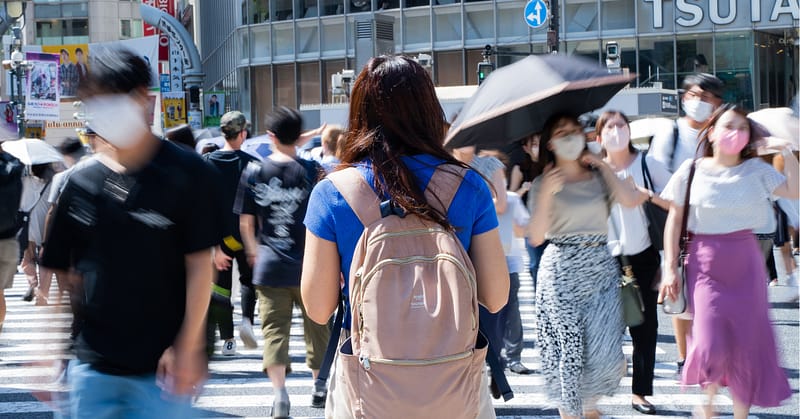
The digital nomad visa in Japan is a six-month “specified activities” visa where foreign nationals can work remotely from anywhere in the country without the need to be hired by a company in Japan. The visa program was introduced in early 2024 by the Immigration Services Agency of Japan (ISA) to attract high-income earning travelers to the country to live. The program is unique in many ways compared to the digital nomad visas offered in other countries. If you are considering applying for a digital nomad visa in Japan, there are important points to keep in mind, such as eligibility, requirements, and benefits. Go! Go! Nihon’s main focus is to help international students apply for language school and student visas in Japan. Because of the uniqueness of the Digital Nomad visa in Japan, Go! Go! Nihon has partnered with a Japanese immigration lawyer who can apply for the visa on your behalf! To get professional help in English contact us here .

What exactly is a digital nomad?
In short, digital nomads are a group of people who choose to work remotely while traveling and living in different countries, usually in the short term. This lifestyle helps people enjoy a balance of work and travel and has grown more popular in recent years as more jobs rely on technology and the Internet. To adapt to this, many countries have started creating visas specifically for digital nomads, so they can stay longer than the time permitted on a typical tourist visa. However, the eligibility and requirements to get a digital nomad visa vary from country to country.
For Japan, while the digital nomad visa is different from a tourist visa, and it doesn’t fall under the category of a work visa , it is classified as a specified activities visa. This luckily means that while applicants still need to meet certain requirements, the process in most cases will take longer than a tourist visa, but shorter and less strict than a work visa. But who is eligible for the digital nomad visa in Japan, and what are the requirements?
Who can apply for a digital nomad visa in Japan?
Anyone from the following 49 countries that have visa-free entry and double-taxation agreements with Japan can apply for a digital nomad visa. However, there are a few other requirements needed in order to qualify.
Applicants need to demonstrate the following:
- Valid passport from one of the 49 countries .
- Be over the age of 18.
- Stable source of income ( 10 million yen annually) .
- Health insurance coverage valid in Japan.
- Clean criminal record.
- Overview statement for the certification of eligibility (COE) . (what the applicant will be doing during their time in Japan, along with where they will be staying).
Let’s examine a brief overview of each requirement. Financial requirement Perhaps the most difficult requirement to hit is the income qualification. Applicants must be able to show proof of a 10 million yen annual income (US $70,000 based on exchange rates when this article was written) from overseas employment or freelance work. The reason for this is to prove that applicants have enough funds to live in Japan during their stay. Proof of these finances can be given through bank statements or pay slips. While it might be the most difficult requirement to hit for a lot of hopeful digital nomads, luckily if you do reach that milestone, there isn’t much else holding you back from getting the visa.
Health insurance Applicants and their families staying in Japan must hold private medical travel insurance which covers death, injury, and illness during their stay as specified by the immigration services agency . Certificate of Eligibility Finally, applicants should present a clear plan for their stay, including intended accommodations and duration of stay, ensuring compliance with visa regulations. This will be important for receiving the Certificate of Eligibility (COE), which is a part of the application process for the visa.
If you plan to bring any family members with you, their documents and insurance proof will also be required.
Benefits of the Digital Nomad Visa in Japan
One of the main benefits of a digital nomad visa in Japan is the length of stay granted to visa holders and their families. Rather than entering Japan on a tourist visa, which needs to be renewed by leaving the country every 90 days, having a digital nomad visa in Japan will allow you to stay for six months along with your spouse and children. Digital nomad visa holders will also receive a residence card for Japan, making it easier to re-enter the country, and making travel in and out of the country more convenient, while holding this visa.
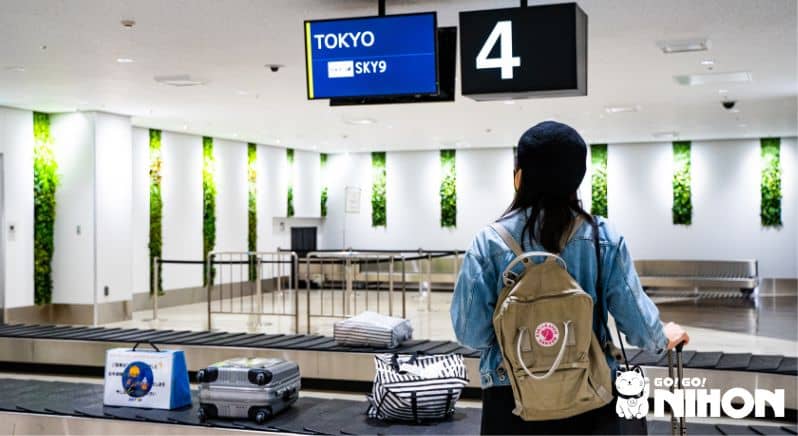
How to apply for a digital nomad visa in Japan
If you would like to get professional visa support for your Digital Nomad visa from a lawyer in Japan contact us here .
There are two ways to apply for a digital nomad visa for Japan.
- Applying from within Japan for the visa.
- Applying outside of Japan for the visa.
For applicants applying within Japan , the digital nomad visa application must be applied for at the immigration office in Japan. To save time, receive help with documents, and avoid a lengthy visit to the immigration office, applications can also be handled and applied for by an immigration lawyer. Please note that the applicant must be physically present in Japan only at the time of application . Also, you can’t switch from a short-term stay visa to a Digital Nomad Visa right away. You need to apply for a Certificate of Eligibility (COE) first. But if you are in Japan when the COE is issued, you can then change your short-term stay visa to a Digital Nomad Visa. Applicants living outside Japan at the time of application can apply directly at their local Japanese consulate . While these are the general guidelines for applying for a digital nomad visa in Japan, it is a new visa and the rules and application system may change based on the decision of immigration authorities in Japan.
At this time, there is no confirmed processing period for the digital nomad visa application when applying from within or outside of Japan.
Keep up with life in Japan
If you are curious about what other visas will allow you to live, work, or study in Japan, check out our articles on J-Find and J-Skip , Specified Skills , and student visas.
Let us know how we can help by contacting us through our Go! Go! Nihon contact form here and we will help get you started on your path to becoming a digital nomad in Japan! While you wait for your visa, or if you’re interested in what life is like in Japan follow our blog for updates on events, activities, culture, and more!
Share this article
Go! Go! Nihon
Related articles, how to get ready to apply to study in japan if you’re under 18, the ultimate guide to traveling in the japanese countryside, passing the jlpt n1: what you need to know, passing the jlpt n2: what you need to know.
Ready to Live & Study in Japan?

Office hours: Monday-Friday 10:00-13:00 & 14:00-18:00 JST Telephone: +81 50 5357 5357
Normally, it takes us between 1 – 3 business days to respond to your email. Sometimes it takes us a bit longer, but don’t worry we’ll get back to you as soon as we can!
Subscribe to our newsletter
© 2024 株式会社GoGo World

TIPS: What you need to know about getting a Japan visa
Planning to travel to Japan any time soon?
Applying for a visa can be daunting, but it shouldn't stop you from taking that trip to see the Land of the Rising Sun. With some proper preparation of all the necessary documents, you'll be able to get approved for your Japan vacation.
There are different types of Japanese visas but we'll focus more on the tourist ones for those who want to go on a quick leisure trip to experience the country. There are two common tourist visas: the single-entry allowing holders to enter Japan once and stay for as long as 90 days, and the multiple entry visa which lets the holder enter the country many times within a specified period for at least 15 to 30 days each stay. Here are the requirements you'll need to get ready.
- Valid Philippine passport in good condition, must be signed and have at least two blank visa pages
- Visa application form which you can download here
- Your itinerary in Japan which includes your port of entry, where you intend to stay and the contact number of the accommodation
- A passport photo 2 x 1.4 inches with a white background taken within six months
- If your birth certificate is "late registration," you must also submit a Baptismal Certificate and a Form 137 from high school or elementary, both of which must be issued within at least three months
- You only need to submit a birth certificate if you have never applied for a Japan visa before
- You will also need to write a letter of authorization for the Japan Embassy to verify your birth certificate
- Original Marriage Certificate (if married) issued within one year
- Bank Certificate of a personal account (not company/business) issued within three months
- A copy of your latest Income Tax Return
If someone else will be shouldering your travel expenses, you must also submit the following:
- Guarantee letter
- Proof of relationship between applicant and guarantor
- Bank Certificate and Income Tax Return of the guarantor
Once you've acquired all the requirements, choose an accredited travel agency from this list from the Japanese Embassy. Fees may cost P950 to P1,200 for a single entry visa, depending on the travel agency.
Multiple-entry requirements
Want to get a multiple-entry visa? This type of visa has some conditions for issuance, so it may not be as easy to get one. For instance, you will need to have a history of travel as a temporary visitor to the country in the last three years.
If you pass the conditions, you will need the same requirements as above but also include an explanation letter for requesting multiple entry, proof of your travel to Japan in the last three years, and proof of financial capacity.
So how much money do you need in your bank account to get your visa approved? The Japanese Embassy hasn't really specified a certain amount but what's advised is to have enough to fund your travel expenses.
As for how long a tourist visa is processed, it will usually take seven to 10 business days. It's best to get your visa processed a month before your trip so you have ample time to request documents that you might not have around.
Additionally, you don't need to book a hotel or a flight before your visa is processed. In fact, travel agencies advise against it. It's best to book once your visa is approved.
Remember, just because you submitted all your documents, it doesn't automatically mean that you'll be granted the visa.
This article TIPS: What you need to know about getting a Japan visa was originally published in PhilSTAR L!fe

We use cookies on this site to enhance your user experience. If you continue to browse you accept the use of cookies on our site. See our Cookie Policy for more information.
- Media & Industry
- Meetings & Events
- Select Language 简体中文 繁體中文(香港) 繁體中文(臺灣) India (English) Bahasa Indonesia 한국어 ภาษาไทย Tiếng Việt Singapore (English) Philippines (English) Malaysia (English) Australia/New Zealand (English) Français Deutsch Italiano Español United Kingdom (English) Nordic countries(English) Canada (English) Canada (Français) United States (English) Mexico (español) Português العربية Japan(日本語) Global (English)
- India (English)
- Bahasa Indonesia
- Singapore (English)
- Philippines (English)
- Malaysia (English)
- Australia/New Zealand (English)
- United Kingdom (English)
- Nordic countries(English)
- Canada (English)
- Canada (Français)
- United States (English)
- Mexico (español)
- Global (English)
- Fujiyoshida
- Shimonoseki
- Ishigaki Island
- Miyako Island
- Kerama Island
- Tokyo Island
- Koka & Shigaraki
- Hida Takayama
- Ginza, Nihonbashi
- Beppu & Yufuin (Onsen)
- Ginzan Onsen
- Nagasaki Islands

- Kumano Kodo
- Shikoku Karst
- Amami Oshima
- Hachimantai
- Omihachiman
- Aizuwakamatsu

- Diving in Japan
- Skiing in Japan
- Seasonal Flowers in Japan
- Sustainable Outdoors
- Off the Beaten Track in Japan
- Scenic Spots
- World Heritage
- Home Stays & Farm Stays

- Japanese Gardens
- Japanese Crafts
- Temple Stays
- Heritage Stays
- Festivals and Events
- Theater in Japan
- Japanese Tea Ceremony
- Cultural Experiences in Japan
- Culture in Japan

- Local Cuisine Eastern Japan
- Local Cuisine Western Japan
- Local Street Food
- Japan's Local Ekiben
- Japanese Whisky
- Vegetarian and Vegan Guide
- Sushi in Japan Guide
- Japanese Sake Breweries

- Art Museums
- Architecture
- Performing Arts
- Art Festivals
- Japanese Anime and Comics
- Japanese Ceramics
- Local Crafts

- Scenic Night Views
- Natural Wonders
- Theme Parks
- Samurai & Ninja
- Iconic Architecture

- Wellness Travel in Japan
- Japanese Ryokan Guide
- A Guide to Stargazing in Japan
- Relaxation in Japan
- Forest Bathing (Shinrin-yoku)

- Experiences in Japan
- Enjoy my Japan
- National Parks
- Japan's Local Treasures
- Japan Heritage
- Snow Like No Other
- Wonder Around Japan

- Visa Information
- Getting to Japan
- Airport Access
- COVID-19: Practical Information for Traveling to Japan
- Anime Tourism
- Countryside Stays
- Accessible Tourism
- Hokkaido Great Outdoors
- Scenic World Heritage in Tohoku
- Shikoku’s Nature and Traditions
- Southern Kyushu by Rail

- Traveling by Rail
- How to Travel by Train and Bus
- JR Rail Passes
- Scenic Railways
- Renting a Car
- Sustainable Travel in Japan
- Travel Brochures
- Useful Apps
- Online Reservation Sites
- Eco-friendly Accommodation
- Luxury Accommodations
- Traveling With a Disability
- Hands-free Travel
- How to Book a Certified Tour Guide
- Volunteer Guides
- Tourist Information Center

- Japanese Manners
- Spring in Japan
- Summer in Japan
- Autumn in Japan
- Winter in Japan
- Cherry Blossom Forecast
- Autumn Leaves Forecast

- Japan Visitor Hotline
- Travel Insurance in Japan
- Japan Safe Travel Information
- Accessibility in Japan
- Vegetarian Guide
- Muslim Travelers
- Safety Tips

My Favorites
${v.desc | trunc(25)}
Planning a Trip to Japan?
Share your travel photos with us by hashtagging your images with #visitjapanjp
- Visa Application
Travel Tips
AC Bonifacio in Japan
VIEW THIS IN FILIPINO

Top things to remember for first time travelers
Before you have an experience of a lifetime in your Japan trip, you just need to take care of the most important thing first, your Japan Tourist Visa! Below is a guide on how you can apply for your Japan Tourist Visa as well as fulfilling requirements for travelers to Japan.
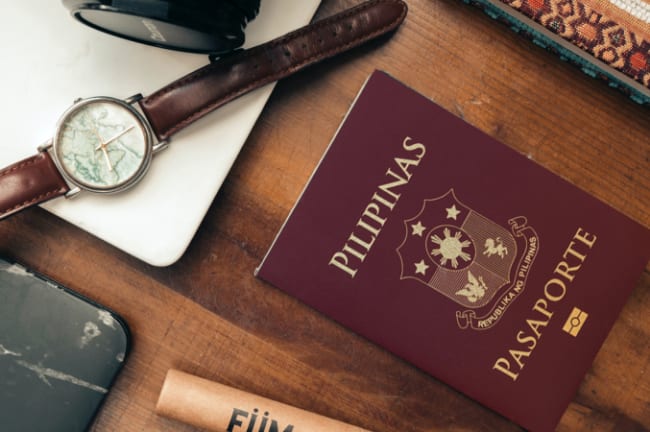
How to Apply for Japan Tourist Visa
Below is a step-by-step guide on how to apply for a Japanese Tourist Visa.
Note: The Japan National Tourism Organization (JNTO) cannot facilitate Visa applications nor can we answer Visa-related inquiries.
For Visa-related inquiries, kindly contact the Japanese Embassy in the Philippines. https://www.ph.emb-japan.go.jp/itpr_en/00_000035.html
- Passport (holder’s signature required)
- Visa Application form (one 4.5cm x 3.5 cm facial photo must be attached)
- Birth Certificate (issued by PSA within one year)
- Marriage Certificate (issued by PSA within one year, for married applicants only)
- Itinerary in Japan
Note: If there is a used Japanese Visa on your passport, birth certificate and marriage certificate are unnecessary.
If applicant will shoulder part/all travel expenses:
- Bank certificate
- Photocopy of Income Tax Return (BIR Form 2316)
If a guarantor will shoulder part/all travel expenses:
- Guarantee letter
- Proof of relationship between applicant and guarantor (e.g. birth certificates)
- Bank Certificate
You can get the application form from The Embassy of Japan in the Philippines website .
Make sure to make extra copies.
You can submit your application form with the required documents through these accredited travel agencies .
The Visa-handling fee for the Japan Tourist Visa varies per travel agency. You must pay the fee after you submit your documents.
The travel agency will contact you if your passport is ready for pickup.
Guides for Entry to Japan
Useful links.
Visit Japan Web
Visit Japan Web is a web service that people entering Japan can use to fast-track Immigration, and Customs procedures in order to enter/return to Japan.

COVID-19 Protocols
Learn everything you need to know about traveling to Japan with COVID-19 protocols.
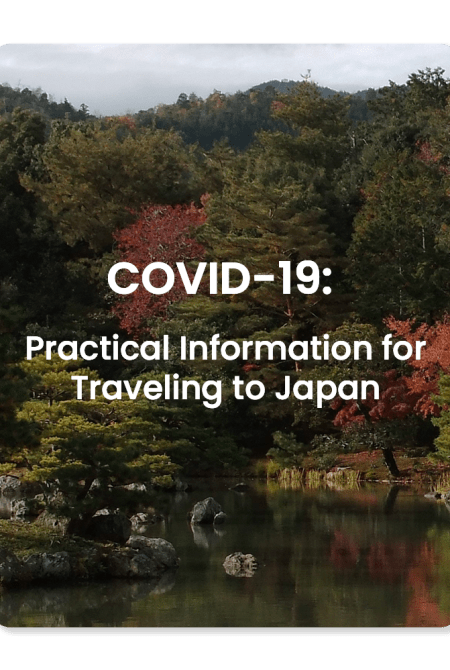
- Irasshaimase
Please Choose Your Language
Browse the JNTO site in one of multiple languages
More American tourists head to Japan as battered yen beckons
- Medium Text
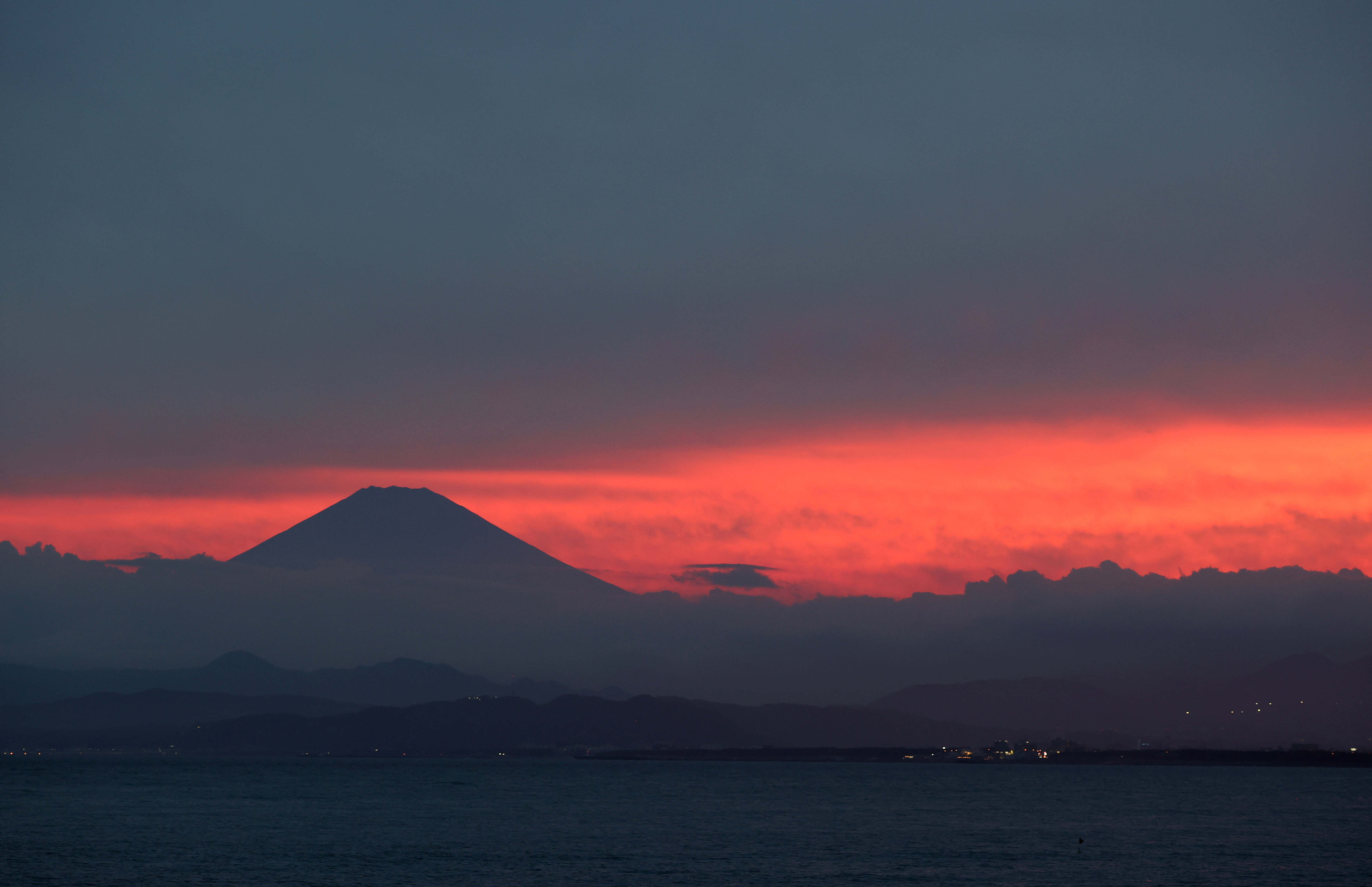
Sign up here.
Reporting by Aishwarya Jain in Bengaluru; Editing by Sriraj Kalluvila
Our Standards: The Thomson Reuters Trust Principles. New Tab , opens new tab
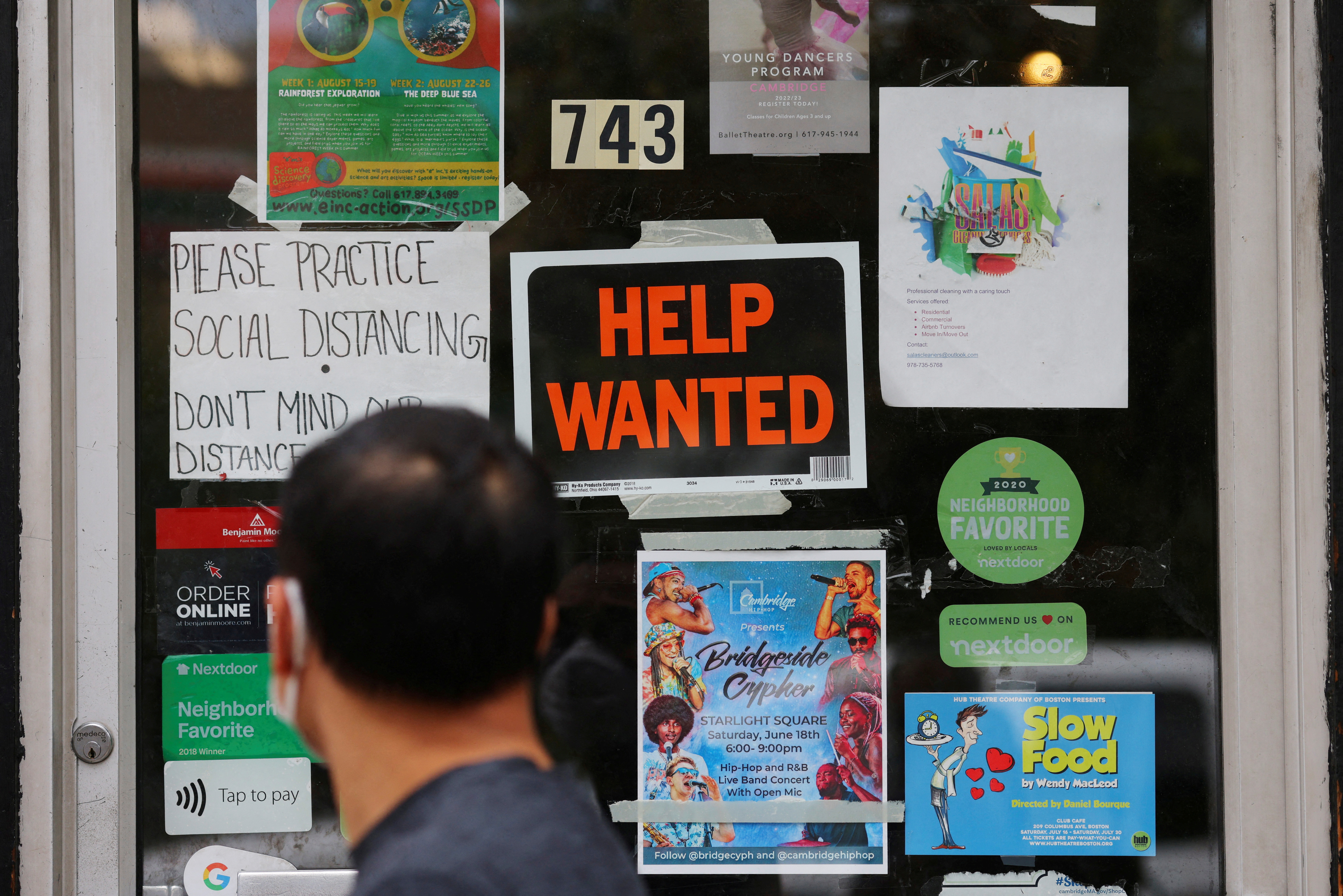
Business Chevron

Talen asks US regulators to reject challenge to Amazon data center deal
Talen Energy has asked U.S. regulators to reject a challenge to its recent Amazon data center deal, which is being opposed by a group of electric utilities that say the agreement could raise power bills for the public, according to a filing on Friday.

The Ministry of Foreign Affairs website uses JavaScript. Please turn on "JavaScript" and use it.

Foreign nationals except nationals of China, Russia, the CIS Countries, Ukraine, Georgia, the Philippines and Viet Nam wishing to come to Japan for a short-term stay
Outline of Application Procedures
For single entry visa (pdf), for multiple entry visa (business purpose, cultural / intellectual figures and other types of short-term stay), asia-pacific.
- (Note 1) Refer to the following link for an outline of procedures for nationals of China , the Philippines and Viet Nam
- (Note 2) Nationals of Indonesia are exempt from visa for stays of 15 days or less by registering their ICAO-compliant ePassport in advance at diplomatic missions of Japan (the embassy, the consulates-general or the consular office) in Indonesia.
- (Note 3) Nationals of Thailand are exempt from visa for stays of 15 days or less.
- (Note 4) Nationals of Brunei are exempt from visa for stays of 14 days or less.
- (Note) Refer to the following link for an outline of procedures for nationals of Russia , the CIS countries and Georgia
Latin America and the Caribbean Region
Middle east and africa.
- (Note 1) Nationals of Qatar are exempt from visa for stays of 30 days or less by registering their ICAO-compliant ePassport in advance at diplomatic missions of Japan (embassies, consulates-general or consular offices).
- (Note 2) Nationals of United Arab Emirates in possession of ICAO-compliant ePassport are exempt from visa for stays of 30 days or less.
Visa Application Documents (download)
(Note) For details of required documents, please refer to [1. Visa Application Procedures].

IMAGES
VIDEO
COMMENTS
June 28, 2024. Japanese. With regards to visa inquiries, you can contact "Foreign Residents Support Center (FRESC) MOFA Visa Information" or "the Japan Visa Information Hotline" listed on the website of the Embassy or Consulate General of Japan. For more information and advice, please contact the Consular Section of the Diplomatic ...
April 26, 2024. Japanese. Tweet. Foreign nationals/people who wish to travel to Japan for tourism for a short-term period can apply for a visa online and receive an electronic visa (eVISA) through the JAPAN eVISA system. As of April 26, 2024, the JAPAN eVISA system is available for nationals/people residing in the following countries/regions.
If you do NOT need a visa, skip to STEP #6. Prepare all the required documents: Types of Visas & Documents. Visit the Embassy of Japan and submit all the documents: Application Drop-off Hours. Visit the Embassy of Japan to pick up the visa and pay the visa fee: Pick-up/payment Hours & Fees.
Applying for Japan tourist visa at the embassy is usually a 5 step process. Step 1: Gather all the necessary documents. Step 2: Apply in person at the Japanese embassy. Step 3: Remain available to reach - the embassy may request additional documents or an in-person interview.
Any foreign visitor entering Japan must have a valid passport for the duration of their stay, and all visitors must comply with the conditions of their visas. See below for information about the current visa requirements for Japan. Visa Information. If you have any further questions, please contact the Japanese embassy or consulate in your ...
Persons planning to travel to Japan for a different purpose, such as students, workers, journalists, entertainers, attorneys (taking depositions), etc., must apply for a different visa in the appropriate category. * A Transit Visa is for those who intend to rest for overnight before traveling on to a third country. If a visa is required for the ...
The process for a Japan Tourist Visa application can be summed up as follows: Contact the Japanese Embassy/Consulate to make an appointment for the submission of the application. Some Japanese Embassies do not accept individual applications, however, so you have to apply through a travel agency. The agency will submit the application at the ...
VISA APPLICATION FORM TO ENTER JAPAN . Date of birth Place of birth Sex: Male. Female Single. Married . Widowed . Divorced ... "I hereby consent to the provision of my personal information (by an accredited travel agent, within its capacity of representing my visa application) to the Japanese embassy/consulate-general and (entrust the agent ...
Along with the required documents for Japan visa applications, you also need pictures which follow these specifications: Dimensions: 4.5cm x 4.5cm. White background. Taken in the last six months. You must be staring straight ahead, with a neutral facial expression. Your entire face has to be visible.
Temporary Visitor Visa. Most visitors to Japan can enter the country on a temporary visitor visa, or tourist visa, thanks to visa exemption agreements between Japan and many foreign countries. For residents of over 60 countries (a full list can be found here ), a fee-free 90-day visa is issued upon arrival. This requires no advance paperwork ...
If you are a citizen of one of the over 50 countries with which Japan has a "general visa exemption arrangement", you need only a valid passport to enter Japan as a "temporary visitor". Otherwise, you need to obtain a visa before entering the country. Temporary visitors from most countries are allowed to stay for up to 90 days.
Visa Policy and Visa Types. Nationals from 70 countries can travel to Japan visa-free.Most can stay up to 90 days. Unless exempt, nationals and residents from 11 countries can apply for an eVisa online.They may still have to visit their nearest Japanese embassy.
Most foreigners who want to visit Japan will have to apply for a Japan Visa before they travel. Millions of people visit Japan every year - in fact, only in 2018, Japan received over 30 million tourists. And there is a lot to see in this exciting island nation, which is a perfect blend of modernism, tradition, history, and nature.
Foreign visitors who need a visa to travel to Japan must meet the following Japan tourist visa requirements. A valid passport with at least 6 months validity and 2 blank pages. A completed and signed visa application form. A recent photograph, size 4.5 x 4.5 cm, in color and with a white background. An official birth certificate or a certified ...
The agencies assess the documents one by one to make sure that everything is in order. But sometimes, there are things that applicants fail to notice, throwing a wrench into an otherwise smooth process. Here are some of the common mistakes that Japanese visa applicants make. 1. Forgetting to sign the passport.
Recently, Japan has finally allowed us to apply for a Japanese tourist visa online, called the Japan eVISA system. Before the release of this new system, if you need a tourist visa to enter Japan, you'll have to physically apply in person at the Embassy of Japan. It was a time-consuming process, and I'm glad they finally allowed us to apply ...
Q1: I want to postpone my travel. Until when is my visa valid? A1: The period of validity of a single-entry visa (that becomes invalid as soon as once you enter Japan) is basically three months. Enter Japan within three months of the issuance of the visa. If you wish to postpone your travel for longer than three months, you will be required to make another visa application.
Japan is a gorgeous and wonderful country full of incredible places of interest for tourists from all over the world. If you also desire to visit Japan, then you need to have a valid Japan tourist visa.The Japanese government has structured many different types of Japan tourist visas for various purposes and time periods, and you can decide which one you would need to apply for accordingly.
To successfully apply for a tourist visa for Japan, applicants must meet the following visa requirements: Hold a valid passport with at least 6 months remaining and 2 blank pages. A completed visa application form. Provide a recent color passport photo and a certified copy of your birth certificate.
How to apply for the Japan Tourist Visa with us. Apply for the Japan Tourist Visa via the nearest Japan Embassy or Consulate and follow their instructions. In some cases, the Japanese authorities require you to attend an interview, depending on your individual circumstances. Costs and processing times for the Japan Tourist Visa
A3: It is a visa that is issued and recorded electronically. If you apply through JAPAN eVISA, an electronic visa (eVISA) will be issued. You will not have a visa sticker in your passport. When checking in at the airport, you will be asked to display a "visa issuance notice" on your device (e.g. smart-phone, tablet) to prove that you have a ...
Rather than entering Japan on a tourist visa, which needs to be renewed by leaving the country every 90 days, having a digital nomad visa in Japan will allow you to stay for six months along with your spouse and children. ... For applicants applying within Japan, the digital nomad visa application must be applied for at the immigration office ...
There are two common tourist visas: the single-entry allowing holders to enter Japan once and stay for as long as 90 days, and the multiple entry visa which lets the holder enter the country many ...
How to Apply for Japan Tourist Visa. Below is a step-by-step guide on how to apply for a Japanese Tourist Visa. Note: The Japan National Tourism Organization (JNTO) cannot facilitate Visa applications nor can we answer Visa-related inquiries. For Visa-related inquiries, kindly contact the Japanese Embassy in the Philippines.
Download the Japan tourist visa application., fill it out, print the completed form, and bring it along with the required documents for your chosen visa category to the Visa Application Centre for submission. ... Indian travelers will find transparency in Japan's visa fee structure, including japan tourist visa fees: INR 500 for a single or ...
The number of Americans arriving in Japan by air crossed more than 900,000 in the first five months of 2024, climbing 17.4% year-over-year and vaulting 35.5% from 2019 before the pandemic, the ...
(Note 2) Nationals of Indonesia are exempt from visa for stays of 15 days or less by registering their ICAO-compliant ePassport in advance at diplomatic missions of Japan (the embassy, the consulates-general or the consular office) in Indonesia. (Note 3) Nationals of Thailand are exempt from visa for stays of 15 days or less.